Solidity Development Book
Welcome to the world of decentralized blockchain: The document begins with an introduction to blockchain technology and Ethereum, providing essential context for understanding smart contracts. It then delves into the syntax and features of Solidity, covering key concepts such as data types, functions, modifiers, and inheritance. Practical examples are included to illustrate how to write and deploy smart contracts, along with best practices for security and optimization. Additionally, the document addresses common pitfalls and debugging strategies to help learners navigate challenges they may encounter. Finally, the document provides resources for further learning, including links to online courses, documentation, and community forums. This structured approach aims to equip readers with the knowledge and skills needed to confidently create and manage their own smart contracts in Solidity
This book will guide you through the development of a decentralized application, including:
- smart-contract development (in Solidity);
This book is not for complete beginners.
I expect you to be an experienced developer, who has ever programmed in any programming language. It’ll also be helpful if you know the syntax of Solidity, the main programming language of this book. If not, it’s not a big problem: we’ll learn a lot about Solidity and Ethereum Virtual Machine during our journey.
However, this book is for blockchain beginners.
If you only heard about blockchains and were interested but haven’t had a chance to dive deeper, this book is for you! Yes, for you! You’ll learn how to develop for blockchains (specifically, Ethereum), how blockchains work, how to program and deploy smart contracts, and how to run and test them on your computer.
Alright, let’s get started!
Useful Links
- This book is hosted on GitHub: https://github.com/yuhuajing/solidity-book
理解以太坊虚拟机
以太坊虚拟机(简称 EVM)是以太坊背后的大脑。
EVM 是以太坊协议的一部分,负责控制智能合约的部署和执行。
它可以比作一台全球去中心化的计算机,拥有数百万个可执行文件(合约),每个文件都有自己的永久数据存储。
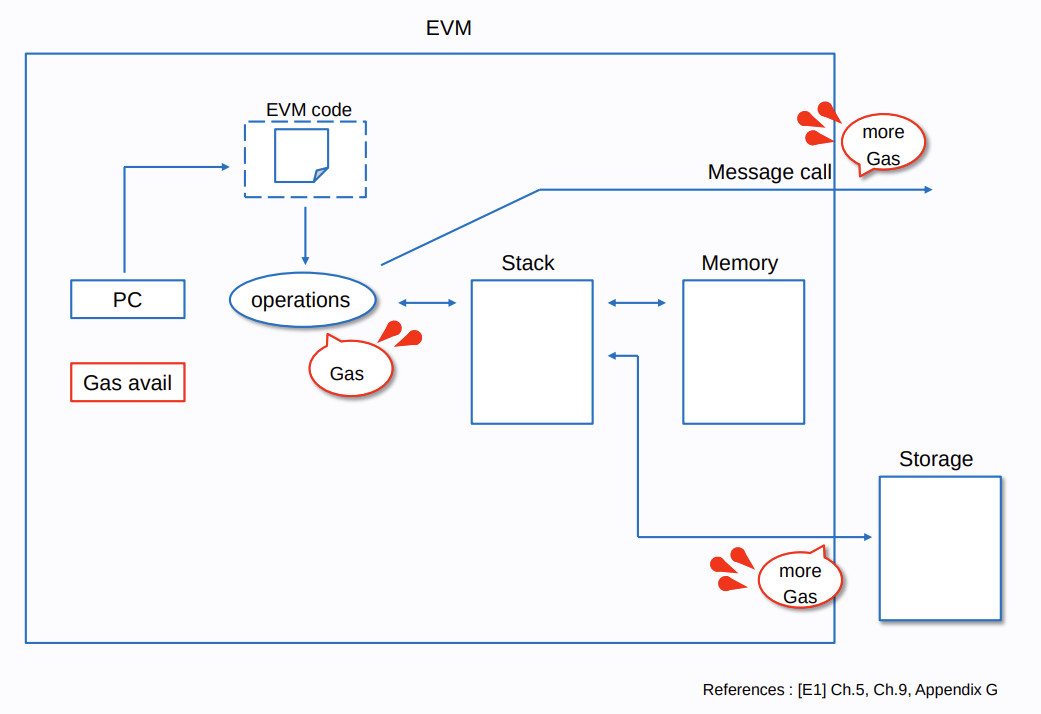
Stack 栈
栈存储当前合约数据,通过 sstore/sload 写入/读取合约数据
EVM 以堆栈机的形式运行,深度为 1024 个项目。
每个 slot 都是一个 256 位字(32 字节),之所以选择这个长度,是因为它兼容 256 位加密。
由于 EVM 是基于堆栈的虚拟机,因此通常需要将数据 PUSH 到堆栈顶部,弹出数据,然后对其顶部的前几个值执行 ADD 或 MUL 等指令。
堆栈遵循 LIFO (后进先出)原则,即最后添加的元素是第一个被移除的元素。
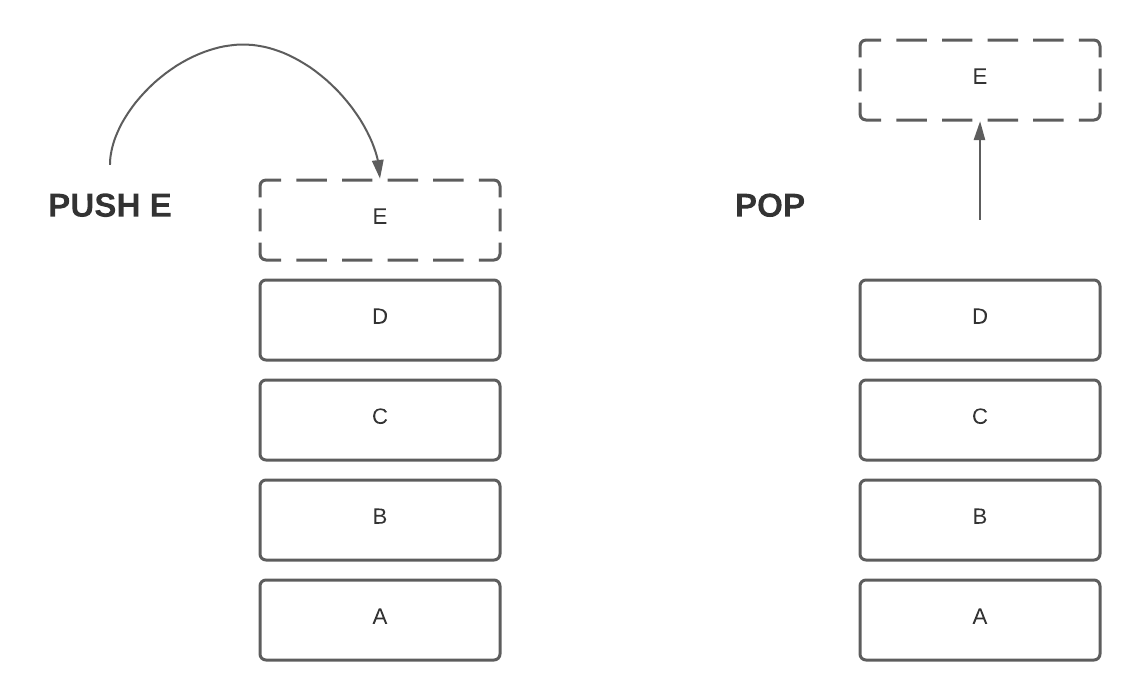
操作码通常会使用堆栈元素作为输入,并且始终取栈顶元素
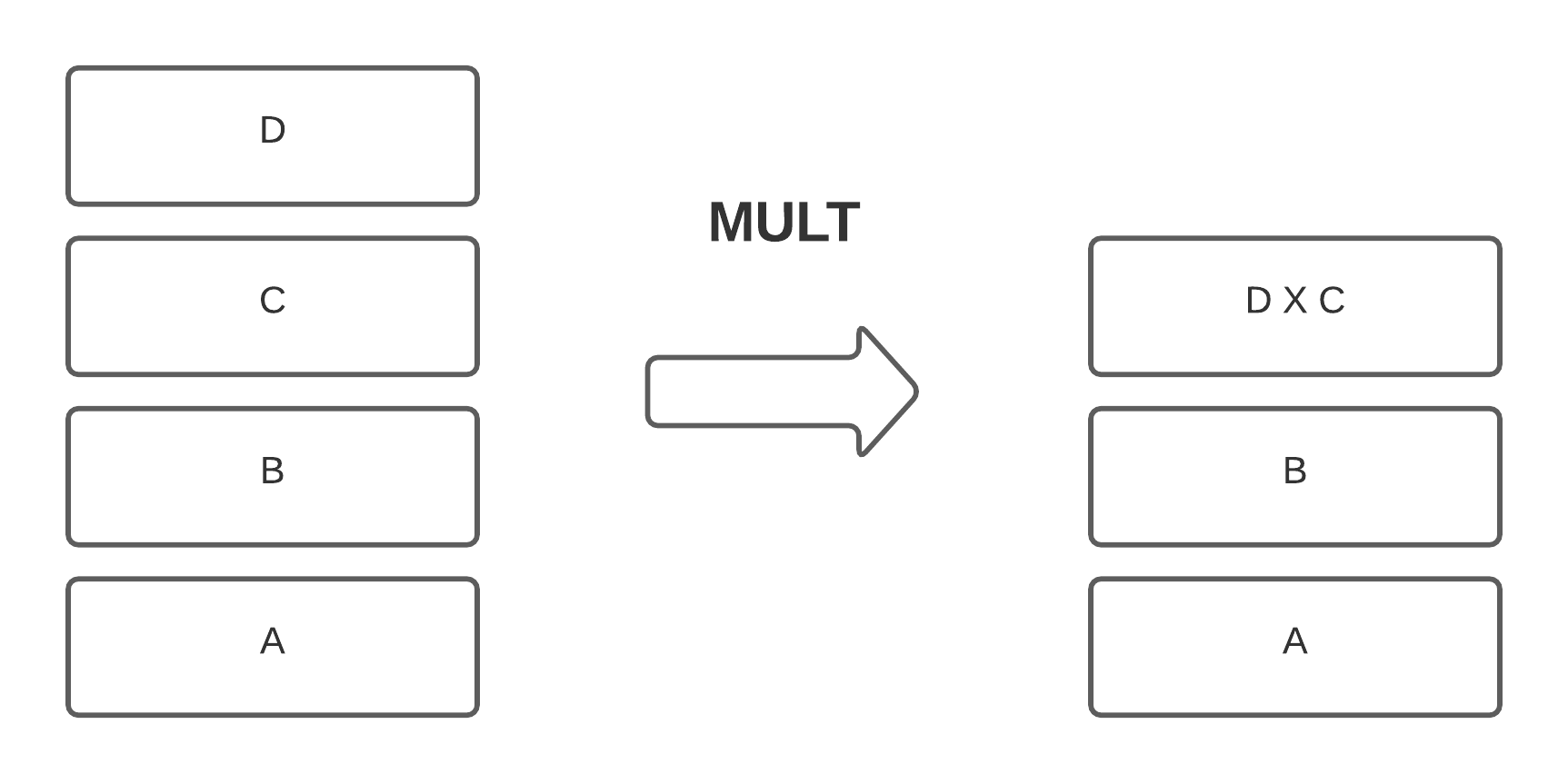
Memory/Calldata
在 EVM 中,memory 可以被认为是一个可扩展的、字节寻址的一维数组。
它初始为空,读取、写入和扩展都需要消耗 Gas。
另一方面,Calldata 与之类似,但它无法扩展或覆盖。它包含在交易的有效负载中,并作为合约调用的输入。
- 从
memory或calldata读取将始终访问给定指针后的前256位(32个字节或1个字)。 - 存储到
memory将始终将字节写入给定指针后的前256位(32个字节或1个字)。 memory和calldata不是持久的,它们是易失性的——在交易执行完成后,它们就会被遗忘。- 通过
mstore/mload写入/读取memory数据

Storage
以太坊上的所有合约账户都能够将数据持久化地存储在键值存储中。
合约存储的读写成本远高于内存,因为交易执行后,所有以太坊节点都必须相应地更新合约的存储树。
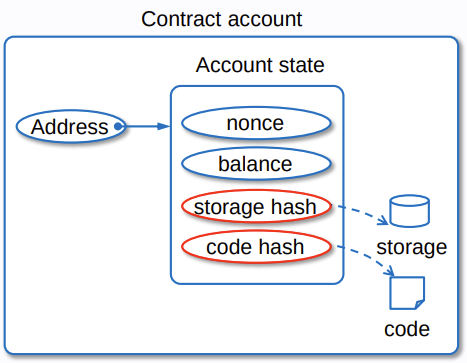
Transient Storage
https://soliditylang.org/blog/2024/01/26/transient-storage/ 引入 key-value 临时存储的数据,数据只在当前交易环境有效。
https://eips.ethereum.org/EIPS/eip-1153 提出 Tload/Tstore 关键字,用于临时存储数据。
- 在重入防范中使用临时存储代替
Sstore/Sload存储的全局关键字,不涉及disk-access, 节省gas Tstore会临时存储数据,staticCall会引起异常
Solidity Examples
// SPDX-License-Identifier: MIT
pragma solidity ^0.8.20;
contract DoubleBufferContract {
uint256[] bufferA;
uint256[] bufferB;
modifier nonreentrant(bytes32 key) {
assembly {
if tload(key) {
revert(0, 0)
}
tstore(key, 1)
}
_;
assembly {
tstore(key, 0)
}
}
bytes32 constant A_LOCK = keccak256("a");
bytes32 constant B_LOCK = keccak256("b");
function pushA() public payable nonreentrant(A_LOCK) {
bufferA.push(msg.value);
}
function popA() public nonreentrant(A_LOCK) {
require(bufferA.length > 0);
(bool success, ) = msg.sender.call{value: bufferA[bufferA.length - 1]}(
""
);
require(success);
bufferA.pop();
}
function pushB() public payable nonreentrant(B_LOCK) {
bufferB.push(msg.value);
}
function popB() public nonreentrant(B_LOCK) {
require(bufferB.length > 0);
(bool success, ) = msg.sender.call{value: bufferB[bufferB.length - 1]}(
""
);
require(success);
bufferB.pop();
}
}
Reference
https://ethereum.org/en/developers/docs/intro-to-ethereum/
https://docs.huff.sh/tutorial/overview/#introduction
Data Types
数据类型
Solidity EVM在宽256bit深2^256的栈空间存储合约数据- 合约内部数据分为定长数值类型和非定长的引用类型
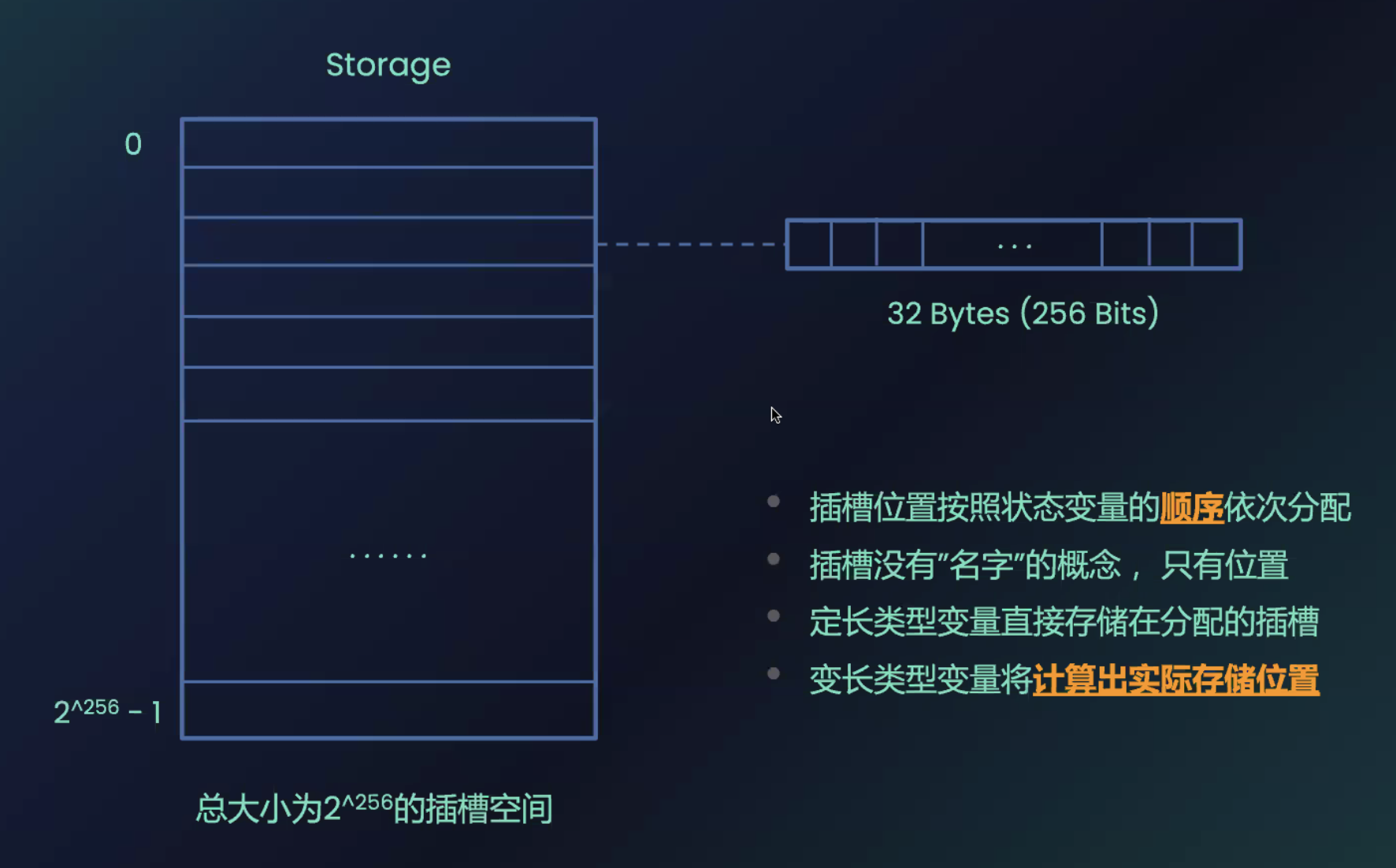
数值类型
数值类型赋值时直接传递值,包含 boolean,整数型(uint8~uint256,int8~int256),address,定长bytes(bytes1~bytes32)
boolean类型是二值变量, 取值true|false,default:false- 运算符包括:
- !(非)
- && (与,短路规则,如果前者false,就不会执行后者)
- || (或,短路规则,如果前者true,就不会执行后者)
- == (判等)
- != (不等)
uint/int整型,default: 0- 运算符包括:
- 比较运算符,返回
bool (> < >= <= == !=) - 算数运算符
(+ - * / % ** << >>)
address类型address类型,可以使用payable()修饰,用于接收NativeToken(触发receiver()函数或缺省函数fallback()) 数值类型合约示例:
// SPDX-License-Identifier: MIT
pragma solidity ^0.8.26;
contract Static_variables {
bool public boo = true;
/*
uint stands for unsigned integer, meaning non negative integers
different sizes are available
uint8 ranges from 0 to 2 ** 8 - 1
uint16 ranges from 0 to 2 ** 16 - 1
...
uint256 ranges from 0 to 2 ** 256 - 1
*/
uint8 public u8 = 1;
uint256 public u256 = 456;
uint256 public u = 123; // uint is an alias for uint256
/*
Negative numbers are allowed for int types.
Like uint, different ranges are available from int8 to int256
int256 ranges from -2 ** 255 to 2 ** 255 - 1
int128 ranges from -2 ** 127 to 2 ** 127 - 1
*/
int8 public i8 = -1;
int256 public i256 = 456;
int256 public i = -123; // int is same as int256
// minimum and maximum of uint
uint256 public minUInt = type(uint256).min;
uint256 public maxUInt = type(uint256).max;
// minimum and maximum of int
int256 public minInt = type(int256).min;
int256 public maxInt = type(int256).max;
address public addr = 0xCA35b7d915458EF540aDe6068dFe2F44E8fa733c;
/*
In Solidity, the data type byte represent a sequence of bytes.
Solidity presents two type of bytes types :
- fixed-sized byte arrays
- dynamically-sized byte arrays.
The term bytes in Solidity represents a dynamic array of bytes.
It’s a shorthand for byte[] .
*/
bytes1 a = 0xb5; // [10110101]
bytes1 b = 0x56; // [01010110]
// Default values
// Unassigned variables have a default value
bool public defaultBoo; // false
uint256 public defaultUint; // 0
int256 public defaultInt; // 0
address public defaultAddr; // 0x0000000000000000000000000000000000000000
bytes1 public c; //0x00
}
引用类型
引用类型:array[]数组,bytes,定长数组,struct结构体,mapping映射
- 数组:动态数组拥有
push/pop内置函数,分别在数组最后增加或删除一个元素
// SPDX-License-Identifier: MIT
pragma solidity ^0.8.26;
contract Dynamic_variables_array {
// Several ways to initialize an array
uint256[] public indeterminate_arr;
uint256[] public indeterminate_init_arr = [1, 2, 3];
// Fixed sized array, all elements initialize to 0
uint256[10] public determinate_arr;
function get(uint256 i) public view returns (uint256) {
return indeterminate_arr[i];
}
// Solidity can return the entire array.
// But this function should be avoided for
// arrays that can grow indefinitely in length.
function getArr() public view returns (uint256[] memory) {
return indeterminate_arr;
}
function indeterminate_push(uint256 i) public {
// Append to array
// This will increase the array length by 1.
indeterminate_arr.push(i);
indeterminate_init_arr.push(i);
}
function determinate_push(uint256 index, uint256 i) public {
// Append to array
// This will increase the array length by 1.
determinate_arr[index] = i;
}
function indeterminate_pop() public {
// Remove last element from array
// This will decrease the array length by 1
indeterminate_arr.pop();
indeterminate_init_arr.pop();
}
function getLength() public view returns (uint256) {
return indeterminate_arr.length;
}
function remove_not_change_length(uint256 index) public {
// Delete does not change the array length.
// It resets the value at index to it's default value,
// in this case 0
delete indeterminate_arr[index];
delete determinate_arr[index];
}
// Deleting an element creates a gap in the array.
// One trick to keep the array compact is to
// move the last element into the place to delete.
function remove_change_length(uint256 index) public {
// Move the last element into the place to delete
indeterminate_arr[index] = indeterminate_arr[
indeterminate_arr.length - 1
];
// Remove the last element
indeterminate_arr.pop();
}
function examples_new_determinate_arr() external pure {
// create array in memory, only fixed size can be created
uint256[] memory a = new uint256[](5);
a[0] = 5;
}
}
数据存储
合约存储
在以太坊中:
智能合约的 字节码(bytecode)
智能合约的 状态变量(storage 变量)
是存储在两种完全不同的地方,它们是物理分离的。
🔍 什么是 bytecode?
当你部署一个智能合约时,Solidity 源码会被编译成 EVM bytecode,比如:
function get() public view returns (uint256) {
return storedData;
}
这段代码的逻辑会被编译为一组字节码(十六进制的机器指令),部署在链上,并且是不可变的。
➡️ 存放位置:该合约地址的代码区(code area)
🔍 什么是 storage 变量?
uint256 public storedData = 42;
这个 storedData 是一个变量,它的值是可以被修改的(可写入的)。
Solidity 会将它存储在合约地址关联的状态存储空间中(Storage Trie)。
➡️ 存放位置:State Trie 中,以合约地址为 key,slot 为子 key
✅ 两者的主要区别:
[Blockchain Storage]
┌────────────────────────────┐
│ 合约地址 0xABC...123 │
│ │
│ ┌──────────────┐ │
│ │ Bytecode 区域│ ← 代码(不可变) │
│ └──────────────┘ │
│ │
│ ┌──────────────┐ │
│ │ Storage Trie │ ← 变量(可变) │
│ │ slot 0: 123 │ │
│ └──────────────┘ │
└────────────────────────────┘
| 类别 | 存储位置 | 是否可修改 | 访问方式 |
|---|---|---|---|
| Bytecode | 合约地址的代码区 | ❌ 不可修改 | EXTCODECOPY, EXTCODESIZE 等 |
| Storage 变量 | 状态存储(State Trie) | ✅ 可修改 | SLOAD, SSTORE |
变量作用域
- 状态变量
- 定义在合约中,但是在函数外的需要存储在合约
slot的变量
- 定义在合约中,但是在函数外的需要存储在合约
- 局部变量
- 定义在合约函数内部,仅在函数执行过程中有效的数据,变量生命周期和函数执行周期一致
- 全局变量。
- 链上数据,全局变量编码到
EVM字节码中
- 链上数据,全局变量编码到
// SPDX-License-Identifier: MIT
pragma solidity ^0.8.26;
contract Variables {
// State variables are stored on the blockchain.
string public hello = "Hello";
uint256 public num = 123;
function interVariables() public view returns (uint256 ts) {
// Local variables are not saved to the blockchain.
uint256 i = 456;
// Here are some global variables
ts = block.timestamp; // 147 gas cost
// assembly {
// ts := timestamp() // 213 gas cost
// }
{
// 可以使用合约状态变量/本函数内部的局部变量/区块链上全局变量
uint interTs = 356;
interTs += block.timestamp;
interTs += i;
interTs += num;
}
// interTs +=9; 外部无法访问作用域内部的参数
}
}
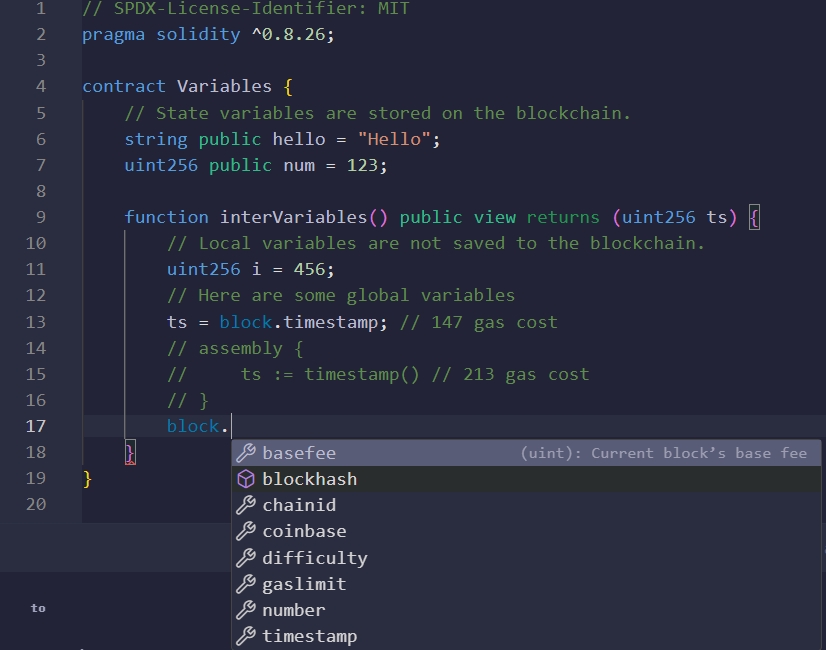
Data Types
变量修饰符
参数修饰符包括:public,private,immutable,constant
public,自动生成Getter函数,表明函数在合约中可以通过abi查询private,参数无法通过abi直接查询,只能通过自定义的合约函数或sload(xx)通过slot获得数据immutable,参数必须在构造函数中初始化,并且编码在字节码中,后续无法修改constant,参数在定义时,直接初始化,并且编码在字节码中,后续无法修改payable,用于修饰地址,表明允许该地址接收NativeToken
变量存储方式
参数在合约中的存储方式
- 合约数据存储
- `storage(可修改),Bytecodes(constant/immutable,不可修改)
- 合约函数运行时的数据存储
- (memory,stack,calldata)`,传参或返回数据
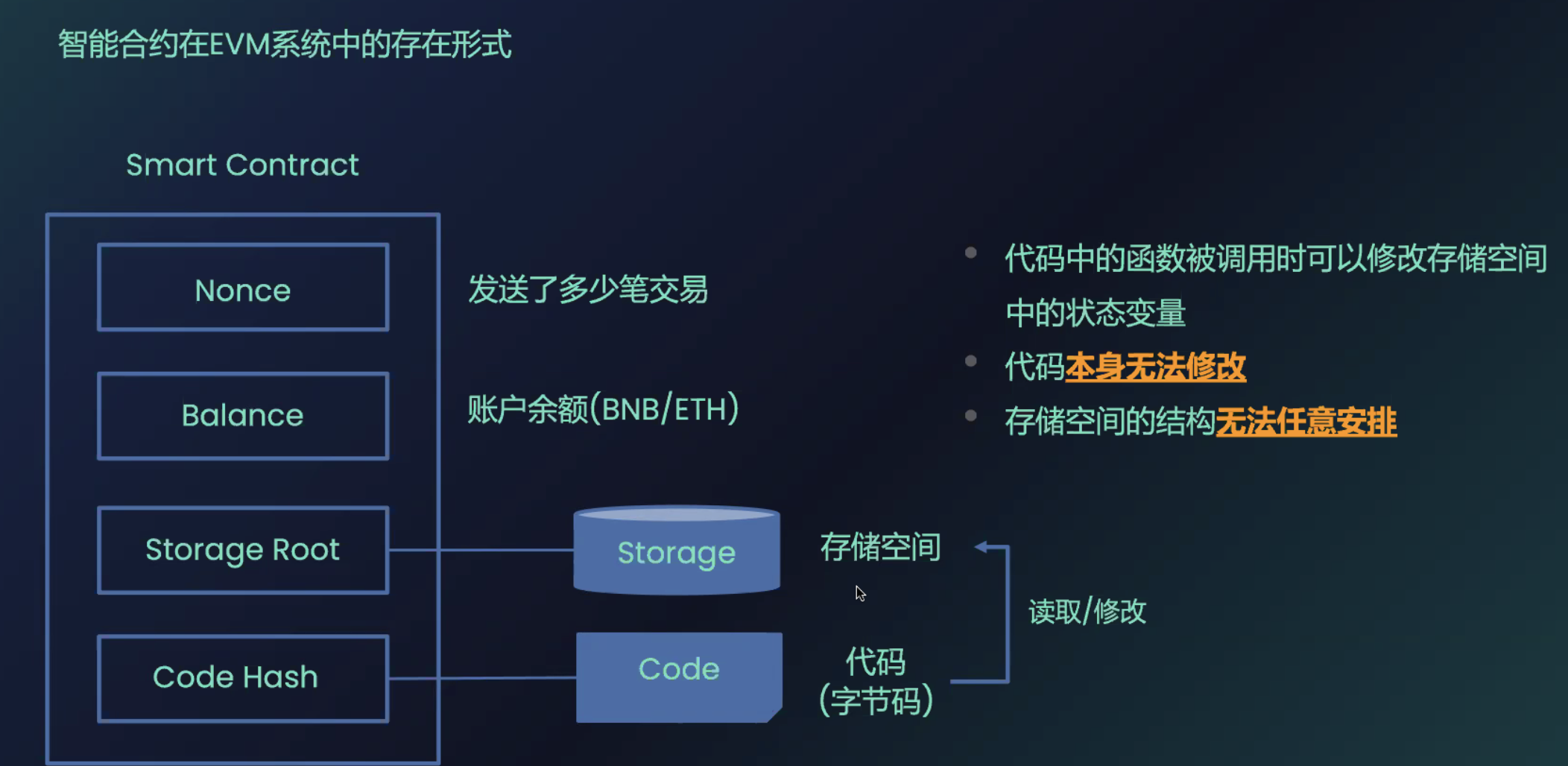
合约数据存储
Bytecodesimmutable|constant变量在合约编译时将值存储在合约代码中,因此后续数据变量无法更改- 在合约使用期间,无需在内部存储中维护该常量的状态
- 由于参数不存储在内部
slot,数据都是通过字节码读取,因此在合约外部调用中,immutable|constant的值只会从被调用的合约字节码中获取
// SPDX-License-Identifier: MIT
pragma solidity 0.8.26;
contract Constants {
// coding convention to uppercase constant variables
// 存储在字节码
address public constant MY_ADDRESS =
0x777788889999AaAAbBbbCcccddDdeeeEfFFfCcCc;
// 存储在字节码
uint256 public constant MY_UINT = 123;
// 存储在字节码
uint256 private immutable a;
// slot 0
uint256 public ty = 9;
constructor() {
a = 99;
}
function getslot(uint256 slot) public view returns (bytes32 value) {
assembly {
value := sload(slot)
}
}
}
Storage- 存储合约状态变量,通过写交易修改
运行时数据存储
- memory. 函数执行过程中用于存储动态分配的数据,如临时变量、函数参数和函数返回值等
- stack. 函数执行过程中存储数据,如基本数据类型和值类型的局部变量
- calldata. 和
memory类似,数据存储在内存中,但是 calldata 数据只读,一般用于函数的输入参数
function fCalldata(uint[] calldata _x) public pure returns(uint[] calldata){
//参数为calldata数组,不能被修改
// _x[0] = 0 //这样修改会报错
return(_x);
}
变量引用作用域
- 普通状态变量 -> 普通状态变量(拷贝)
- 普通状态变量 -> storage变量(引用)
- 普通状态变量 -> memory变量(拷贝)
- storage变量 -> storage变量(引用)
- storage变量 -> memory变量(拷贝)
- storage变量 -> 普通状态变量(引用)
- memory变量 -> memory变量(引用)
- memory变量 -> 普通状态变量(拷贝)
// SPDX-License-Identifier: MIT
pragma solidity ^0.8.26;
contract StateToStateContract {
uint8[3] public static_array = [1, 2, 3]; //State 状态变量
uint8[3] public static_array_two;
uint256[] public dynamic_array;
event LogUint8(uint8);
event staticArrays(uint8[3], uint8[3]);
event dynamicArrays(uint256[], uint256[]);
function stateToany() public {
//状态变量 -> 状态变量(拷贝),双方互不影响
static_array_two = static_array;
static_array_two[0] = 8;
emit staticArrays(static_array, static_array_two); //[1,2,3],[8,2,3]
//状态变量 -> storage变量(引用),引用拷贝,修改任意变量的值会影响另一个状态变量的值,更新合约状态参数
uint256[] storage tem_dynamic_array = dynamic_array;
tem_dynamic_array.push(10086);
emit dynamicArrays(dynamic_array, tem_dynamic_array); //[10086],[10086]
//状态变量 -> memory变量(拷贝)
uint256[] memory tem_dynamic_array_two = dynamic_array;
tem_dynamic_array_two[tem_dynamic_array_two.length - 1] = 999;
emit dynamicArrays(dynamic_array, tem_dynamic_array_two); //[10086],[999]
}
function storageToany() public {
//storage变量 -> storage变量(引用),引用拷贝,修改任意变量的值会影响另一个状态变量的值,更新合约状态参数
uint256[] storage tem_dynamic_array = dynamic_array;
tem_dynamic_array.push(12);
emit dynamicArrays(dynamic_array, tem_dynamic_array); //[12],[12]
uint256[] storage tem_dynamic_array_two = tem_dynamic_array;
tem_dynamic_array_two.push(13);
emit dynamicArrays(dynamic_array, tem_dynamic_array); //[12,13],[12,13]
emit dynamicArrays(tem_dynamic_array, tem_dynamic_array_two); //[12,13],[12,13]
//storage变量 -> memory变量(拷贝)
uint256[] memory tem_dynamic_array_memory = tem_dynamic_array;
tem_dynamic_array_memory[0] = 14;
emit dynamicArrays(tem_dynamic_array, tem_dynamic_array_memory); //[12,13],[14,13]
// storage变量 -> 状态变量(引用),引用拷贝,修改任意变量的值会影响另一个状态变量的值,更新合约状态参数
dynamic_array = tem_dynamic_array;
dynamic_array[0] = 15;
emit dynamicArrays(dynamic_array, tem_dynamic_array); //[15,13],[15,13]
tem_dynamic_array.push(16);
emit dynamicArrays(dynamic_array, tem_dynamic_array); //[15,13,16],[15,13,16]
}
function memoryToany() public {
// memory变量 -> 状态变量(拷贝)
uint8[3] memory tem_static_array = static_array;
tem_static_array[0] = 4;
emit staticArrays(static_array, tem_static_array); //[1,2,3],[4,2,3]
// memory变量 -> memory变量(引用),引用拷贝,修改任意变量的值会影响另一个状态变量的值,更新合约状态参数
uint8[3] memory tem_static_array_two = tem_static_array;
tem_static_array_two[2] = 5;
emit staticArrays(static_array, tem_static_array); //[1,2,3],[4,2,5]
emit staticArrays(tem_static_array, tem_static_array_two); //[4,2,5],[4,2,5]
}
}
ENUM
- 枚举 enum 作为用户自定义的变量集合,用于定义有限的多种状态
- 由于
enum有限,后续除非重新部署合约,否则无法新增状态 enum适用于确定的有限状态,否则使用动态数组更适合后续扩展
- 由于
- enum内部的变量从
0 index开始,default: 0
// SPDX-License-Identifier: MIT
pragma solidity 0.8.26;
contract enumExamples {
enum ActionChoices {
GoLeft,
GoRight,
GoStraight,
SitStill
}
ActionChoices choice;
ActionChoices constant defaultChoice = ActionChoices.GoStraight;
function setGoStraight() public {
choice = ActionChoices.GoStraight;
}
function setChoice(ActionChoices _choice) public {
choice = _choice;
}
// Since enum types are not part of the ABI, the signature of "getChoice"
// will automatically be changed to "getChoice() returns (uint8)"
// for all matters external to Solidity.
function getChoice() public view returns (ActionChoices) {
return choice;
}
function getDefaultChoice() public pure returns (uint256) {
return uint256(defaultChoice);
}
function getLargestValue() public pure returns (ActionChoices) {
return type(ActionChoices).max;
}
function getSmallestValue() public pure returns (ActionChoices) {
return type(ActionChoices).min;
}
}
bytes/string
bytes
bytes是不用加[]声明的动态数组hex修饰bytes数据bytes.concat()直接拼接bytes数据- 字节数组
bytes分为定长数值类型和不定长引用类型- 定长数值数组(
bytes1~bytes32)能通过index获取数据 - 不定长数组
bytes ...是动态类型,传参时需要memory|calldata修饰,作为参数返回时需要memory修饰
- 定长数值数组(
string
string是UTF-8编码的bytes类型string和bytes数据可以互相转换string(), bytes()string传参ASCII字符,此时每个字符占据1位,可以通过index直接读取值string传参Unicode字符,此时每个字符占据多位,不能通过index直接读取值
- 在
solidity 0.8.12+,string.concat()直接拼接多个string字符串
// SPDX-License-Identifier: MIT
pragma solidity 0.8.26;
contract BytesStringData {
string private constant NATIE = unicode"👋酱香拿铁";
string private constant HELL = unicode"Hello 😃";
string private constant UTF8CODE = "Hello World";
bytes private hexData = hex"68656C6C6F776F726C64";
function characterOfString(string memory input, uint256 index)
external
pure
returns (string memory)
{
bytes memory char = new bytes(1);
char[0] = bytes(input)[index];
return string(char);
}
function characterOfStringLength(string memory input)
external
pure
returns (uint256)
{
return bytes(input).length;
}
function concatMulString() external view returns (string memory) {
return string.concat(string(hexData), NATIE, UTF8CODE);
}
function concatMulBytes() external view returns (bytes memory) {
return bytes.concat(hexData, bytes(NATIE));
}
}
Preference
https://www.rareskills.io/learn-solidity/strings
mapping
Mapping只能定义成状态变量,不能在函数内部定义成局部变量Mapping无法遍历,只能通过key值获取对应的valueMapping类型不能作为函数的返回值mapping(key ==> value) [public|private] xxx- 键值
key必须是默认的类型,不能使用自定义的类型 value可以是任意类型,包含自定义的结构体数据结构key值对应的value不存在的时候,会返回value的默认值,不会revert
- 键值
// SPDX-License-Identifier: MIT
pragma solidity 0.8.26;
contract Mapping {
// Mapping from address to uint
mapping(address => uint256) public myMap;
// Mapping from nft address and user address to his nft id
mapping(address => mapping(address => uint256)) public addressNFTIds;
struct myStruct {
address NFT;
address Operator;
}
// Mapping from nft address and user address to his approvor
mapping(address => myStruct) public addressApprovedInfo;
function updateMapping(
address nft,
address operator,
uint256 id
) public {
myMap[msg.sender] = id;
addressNFTIds[nft][msg.sender] = id;
addressApprovedInfo[msg.sender] = myStruct(nft, operator);
}
function updateOperatorNFT(
address nft,
address operator,
uint256 id
) public {
mapping(address => uint256) storage _tokensByNft = addressNFTIds[nft];
_tokensByNft[operator] = id;
}
}
合约逻辑
控制流
if(statement){}else{}for(statement){}for循环长度不定的元素时,一定要控制范围,防止out-of-gas
while(statement){}while循环执行直到不满足条件,同样在statement中要控制循环范围
do{}while(statement)- 先执行逻辑,在执行判断
- 执行直到不满足条件,同样在
statement中要控制循环范围
- 循环过程关键字
continue:跳出当前循环,立即进入下一个循环break:终止当前循环
try()catch{}- 三元操作符
- a>b?a:b
// SPDX-License-Identifier: MIT
pragma solidity 0.8.26;
contract Logic {
bool ifFlag = true;
uint32[] raffleIds;
uint256 executeNumber;
function IfLogic() external view returns (bool) {
if (ifFlag) {
return (true);
} else {
return (false);
}
}
function quicksort(uint256[] memory a)
public
pure
returns (uint256[] memory)
{
uint256 len = a.length;
for (uint256 i = 1; i < len; i++) {
uint256 key = a[i];
uint256 j = i;
while (j >= 1 && key < a[j - 1]) {
a[j] = a[j - 1];
j--;
}
a[j] = key;
}
return a;
}
// Don't write loops that are unbounded as this can hit the gas limit, causing your transaction to fail.
function forExecuteRaffle(uint256 count) external {
uint256 length = raffleIds.length;
uint256 ncount = executeNumber + count >= length
? length
: executeNumber + count;
uint256 temp = executeNumber;
executeNumber = ncount;
for (uint256 i = temp; i < ncount; i++) {
// do something
}
}
// Don't write loops that are unbounded as this can hit the gas limit, causing your transaction to fail.
function whileExecuteRaffle(uint256 count) external {
uint256 length = raffleIds.length;
uint256 ncount = executeNumber + count >= length
? length
: executeNumber + count;
uint256 temp = executeNumber;
executeNumber = ncount;
while (temp < ncount) {
// do something
}
}
// do something first, then do statement check.
function dowhileCheck(uint256 _number) public pure returns (uint256) {
do {
_number += 1;
} while (_number < 15);
return _number; //_number+1
}
}
ABI 编码
abi.encode
Encode按照传参顺序编码合约函数传参,传参被编码成256bit(32bytes), 不满256bit的参数通过前向或后向补0- 静态数据直接编码
- 动态数据由于动态长度的变化,编码数据分为三部分
静态传参编码规则:
- 静态参数(
int,uint,address,bool,bytes-n,定长数组,只包含静态参数的结构体)高位补0,编码成256bits. - 结构体作为
tuples, 按照数据定义顺序直接依次编码 - 枚举类型占位
uint8,会高位补0直到满足 32 byets - 自定义的类型按照原类型编码
动态传参编码规则:
- 动态参数编码(
string,bytes,不定长数组,包含动态参数的结构体)分三部分:- 第一部分的
256bits(32bytes)表明offset,calldata的起始位置 - 第二部分的
256bits(32bytes)表明length,calldata中动态参数的长度 - 第三部分就是真实传参数数据,不满
256bit的在补0- 静态类型高位补0
bytes,string类型的参数,低位补0
- 第一部分的
Examples-String:
play(string) // play(“Eze”)
传参编码的规则:
- 函数需要动态类型
string传参 - 按照传参顺序,第一行直接编码动态数组
offset, 之后紧接动态数据大小,(string数据低位补0)
Examples-动态数组:
transfer(uint[], address)// [5769, 14894, 7854], 0x1b7e1b7ea98232c77f9efc75c4a7c7ea2c4d79f1
传参编码的规则:
- 函数需要两个传参,第一个为动态数组,第二个为静态地址
- 按照传参顺序,第一行先编码动态数组
offset, 动态数据大小为3,内部为静态类型(高位补0) - 第二行编码静态数据

Examples-静态参数结构体:
- 带结构体传参的函数选择器和结构体内部参数类型相关
- 函数需要两个传参,第一个为全是静态参数的结构体,第二个为静态地址
- 按照传参顺序,从第一行开始,直接按照结构体内部参数的定义顺序编码内部参数,每个参数补位
256 bit - 静态地址编码到全部结构体参数后面

// SPDX-License-Identifier: MIT
pragma solidity ^0.8.26;
contract C {
struct RareToken {
uint256 n;
}
// `foo((uint256),address)`
function foo(RareToken memory point, address addr) external pure {
//...
}
function getSelector(string calldata str)
external
pure
returns (bytes4, bytes4)
{
return (
bytes4(this.foo.selector),
bytes4(keccak256(abi.encodePacked(str))) //foo((uint256),address)
);
}
}
Examples-动态参数结构体:
struct RareToken {
string str;
uint128 m;
uint128 n;
}
function foo(RareToken memory point, address addr) external pure {
//...
}
- 带结构体传参的函数选择器和结构体内部参数类型相关:
foo((string,uint128,uint128),address) - 函数需要两个传参,第一个为是包含动态参数的结构体,第二个为静态地址
- 按照传参顺序,从第一行开始,编码结构体参数的
offset - 第二行编码静态地址
addr - 结构体数据从
offset开始,再次按照数据编码模式进行编码- 结构体按照顺序存储
string, uint128, uint128 - 第一行编码
string参数的存储offset - 第二三行编码下面的静态参数
- 之后开始编码
srting传参(数据低位补0)
- 结构体按照顺序存储
0x5c325b3d [“Eze”,12,23] 5b38da6a701c568545dcfcb03fcb875f56beddc4
0000000000000000000000000000000000000000000000000000000000000040 //动态结构体类型数据的起始位置
0000000000000000000000005b38da6a701c568545dcfcb03fcb875f56beddc4 // 静态数据,存储address
0000000000000000000000000000000000000000000000000000000000000060 //结构体数据动态类型的起始位置
000000000000000000000000000000000000000000000000000000000000000c //结构体静态数据1
0000000000000000000000000000000000000000000000000000000000000017 //结构体静态数据2
0000000000000000000000000000000000000000000000000000000000000003 //结构体数据动态类型的数据长度
4578650000000000000000000000000000000000000000000000000000000000 //结构体数据动态数据
 Examples-静态参数的固定大小数组,传参编码的规则:
Examples-静态参数的固定大小数组,传参编码的规则:
- 静态参数的固定大小数组作为静态参数编码variables.md
- 按照传参顺序,直接依次编码静态数据传参

// SPDX-License-Identifier: MIT
pragma solidity ^0.8.26;
contract Pair {
uint256 x;
address addr;
string name;
uint256[2] array;
constructor() payable {
x = 10;
addr = 0x7A58c0Be72BE218B41C608b7Fe7C5bB630736C71;
name = "0xAA";
array = [5, 6];
}
function abiCode() public view returns (bytes memory data) {
data = abi.encode(x, addr, name, array);
}
}
0x 000000000000000000000000000000000000000000000000000000000000000a //x = 10
0000000000000000000000007a58c0be72be218b41c608b7fe7c5bb630736c71 // address
00000000000000000000000000000000000000000000000000000000000000a0 // offset = 160, 表示数据从当前 data 的 第160位 开始读取
0000000000000000000000000000000000000000000000000000000000000005 // array[0]
0000000000000000000000000000000000000000000000000000000000000006 // array[1]
0000000000000000000000000000000000000000000000000000000000000004 // 表明数据 length = 4
3078414100000000000000000000000000000000000000000000000000000000
Examples-动态参数的固定大小数组,传参编码的规则:
- 动态参数的固定大小数组作为动态参数编码
- 按照传参顺序,依次编码各自参数的
offset,之后从offset开始存储真实数据的大小和数据
plays(string[2])//play(["Eze","Sunday"])
 非固定大小的数组传参
非固定大小的数组传参string[],需要将数组大小一起编码:

Examples-嵌套数组的编码,传参编码的规则:
- 直接按照参数顺序,按照动态数组的编码规则依次进行编码

Seaport Return String
Seaport返回 Seaport 的函数:
function _name() internal pure override returns (string memory) {
// Return the name of the contract.
assembly {
mstore(0x20, 0x20)
mstore(0x47, 0x07536561706f7274)
return(0x20, 0x60)
}
}
我们知道在 slot 存储静态类型数据的时候采用高位补0的方式,也就是全部数据放在低位存储
string/bytes 类型的数据高位存储,那么采用 start + len 大小的偏移量存储 len+data 静态数据的话:
- 静态数据全部低位存储
- 由于偏移量,当前
slot只会存储len - 同时,
data数据直接存储在了下一slot的高位
Examples-TKN:
将数据长度和真实数据作为静态数据直接存储,由于偏移量的原因,节省一步 mstore.
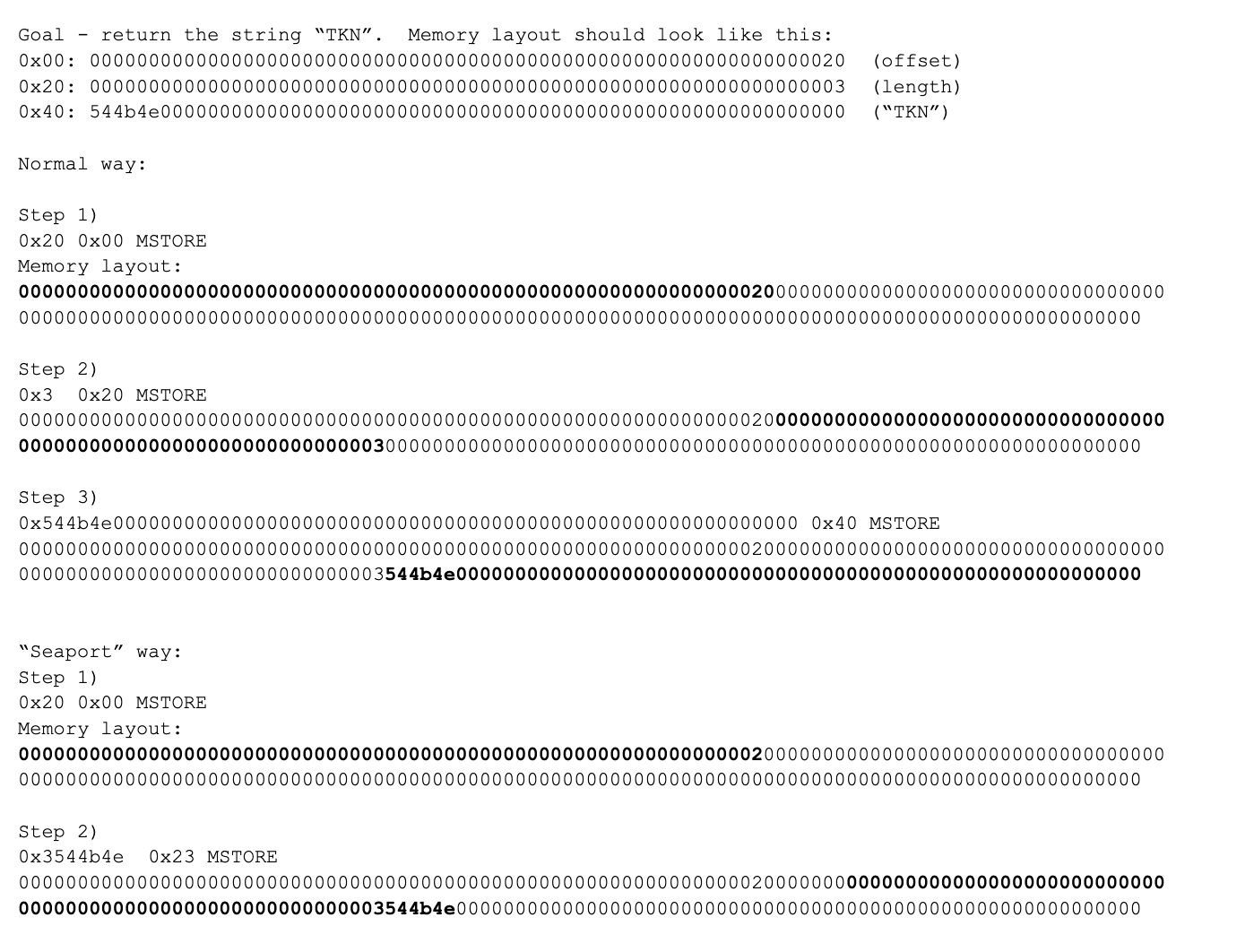
abi.encodePacked
- 在数据顺序上进行最低空间编码,省略编码中的填充0
- 动态类型数据只保留数据,不填充长度字段
keccak256(abi.encodePacked(“a”, “b”, “c”)) == keccak256(abi.encodePacked(“a”, “bc”)) == keccak256(abi.encodePacked(“ab”, “c”))
- 当数据不需要和合约交互,只是用来查看数据的情况下就可以使用
encodepacked节省数据空间 encodePacked不能编码struct、nextedArray(以及包含多维数组的map)
// SPDX-License-Identifier: MIT
pragma solidity ^0.8.26;
contract Pair {
uint40 x;
address addr;
string name;
uint8[2] array;
Tree tree;
uint8[][]loc;
mapping(uint256=>uint8[][])nextArrayMap;
struct Tree {
uint256 leaves;
uint256 age;
}
constructor() payable {
x = 10;
addr = 0x7A58c0Be72BE218B41C608b7Fe7C5bB630736C71;
name = "0xAA";
array = [5, 6];
tree = Tree({leaves: 100, age: 1000});
loc[0].push(6);
loc[0].push(7);
nextArrayMap[0]= loc;
}
function abiEncodePacked()
public
view
returns (bytes memory encodeData, bytes memory encodePackedData)
{
encodeData = abi.encode(x, addr, name, array);
encodePackedData = abi.encodePacked(x, addr, name, array,nextArrayMap,tree,loc);
}
}
0x000000000a //uint40 40bit
7a58c0be72be218b41c608b7fe7c5bb630736c71
30784141
0000000000000000000000000000000000000000000000000000000000000005
0000000000000000000000000000000000000000000000000000000000000006
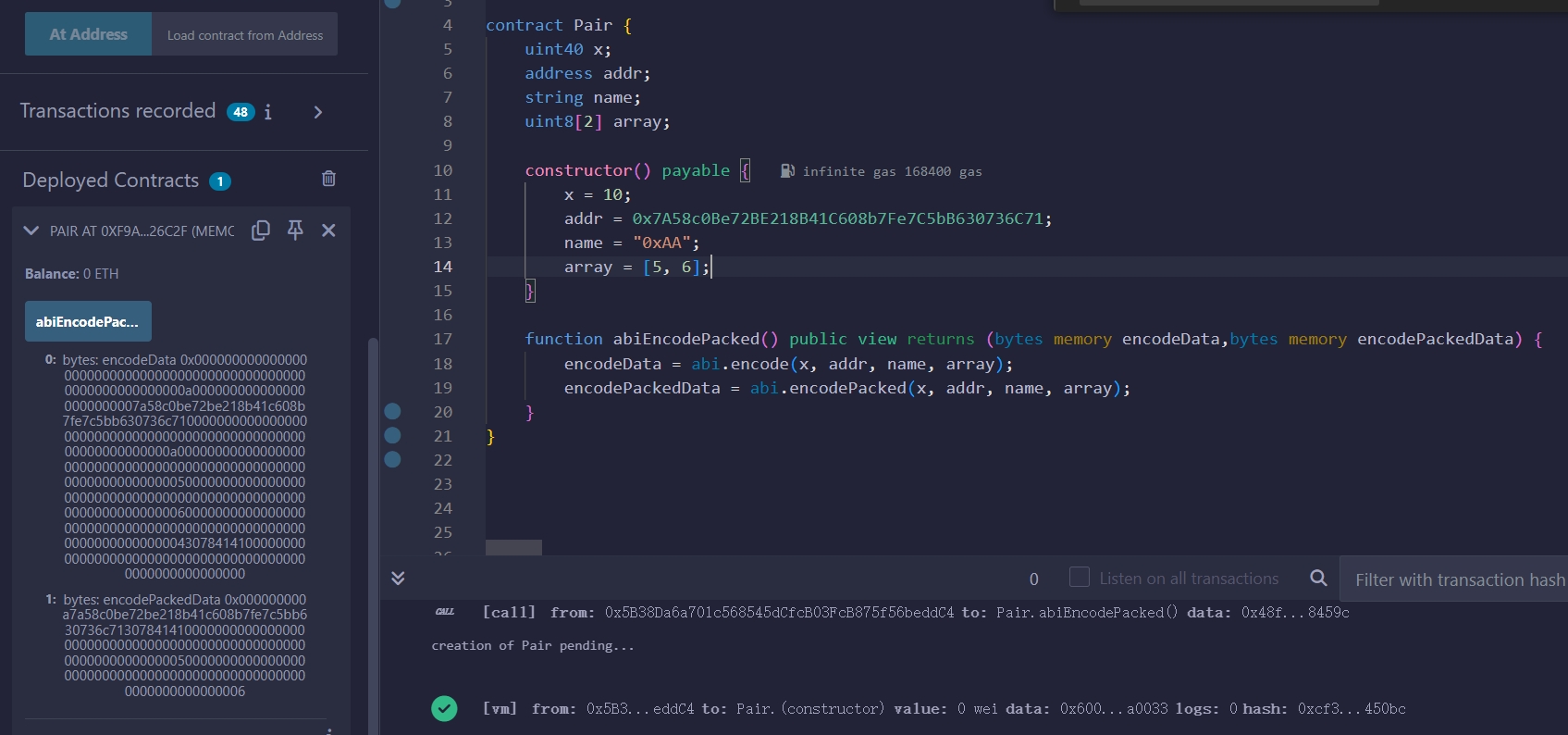
abi.decode
解码 encode 的合约参数,将编码数据解码回原本数据,解码函数中需要提供待解析的编码和解析后的参数类型
function decode(bytes memory data) public pure returns(uint dx, address daddr, string memory dname, uint[2] memory darray) {
(dx, daddr, dname, darray) = abi.decode(data, (uint, address, string, uint[2]));
}
Preference
https://www.rareskills.io/post/abi-encoding
Solidity参数
数值数据类型占位存储
| Type | Bit |
|---|---|
| boolean | 8 |
| uint8/int8/bytes1 | 8 |
| uint32/int32/bytes4 | 32 |
| uint128/int128/bytes16 | 128 |
| uint256/int256/bytes32 | 256 |
| address | 160 |
| enum | 8 |
slot存储位置和合约状态变量声明顺序相关,不满栈宽256bit高位补到同一个slot
contract AddressVariable {
address owner = 0x5B38Da6a701c568545dCfcB03FcB875f56beddC4;
// new
bool Boolean = true;
uint32 thirdvar;
}
- 其中,
owner占位160 bit,Boolean占位8 bit,thirdvar占位32 bit - 三个变量按照证明顺序,高位编码到同一个slot存储
- 此时,
slot剩余56 bit,下个声明变量的类型如果超出56 bit,会顺延到 下一个slot存储

contract AddressVariable {
address owner = 0x5B38Da6a701c568545dCfcB03FcB875f56beddC4;
bool Boolean = true;
uint32 thirdVar;
// new
address admin = 0xAb8483F64d9C6d1EcF9b849Ae677dD3315835cb2;
}

Solidity参数
动态数据类型存储
Mapping数据存储
Mapping value数据的存储位置和声明顺序baseSlot以及key值相关- 直接聚合
bytes32(Key)和bytes32(baseSlot) - 哈希聚合结果,找出
mapping value的真实数据存位置
- 直接聚合

// SPDX-License-Identifier: MIT
pragma solidity =0.8.26;
contract MyMapping {
uint256 a; // storage slot 0
uint256 b; // storage slot 1
uint256 c; // storage slot 2
uint256 d; // storage slot 3
uint256 e; // storage slot 4
uint256 f; // storage slot 5
mapping(address => uint256) private balance; // storage slot 6
mapping(string => uint256) private strbalance; // storage slot 7
constructor() {
strbalance["aaa"] = 9; // RED
balance[address(0x1)] = 7;
}
//*** NEWLY ADDED FUNCTION ***//
function getStorageSlot(address _key)
public
pure
returns (uint256 balanceMappingSlot, bytes32 slot)
{
assembly {
// `.slot` returns the state variable (balance) location within the storage slots.
// In our case, balance.slot = 6
balanceMappingSlot := balance.slot
}
slot = keccak256(
abi.encode(
bytes32(abi.encode(_key)),
bytes32(abi.encode(balanceMappingSlot))
)
);
}
function getValue(address _key)
public
view
returns (bytes32 slot, uint256 value)
{
// CALL HELPER FUNCTION TO GET SLOT
(, slot) = getStorageSlot(_key);
assembly {
// Loads the value stored in the slot
value := sload(slot)
}
}
//*** NEWLY ADDED FUNCTION ***//
function getStringStorageSlot(string memory key)
public
pure
returns (uint256 balanceMappingSlot, bytes32 slot)
{
assembly {
// `.slot` returns the state variable (strbalance) location within the storage slots.
balanceMappingSlot := strbalance.slot
}
slot = keccak256(
abi.encodePacked(
abi.encodePacked(key),
bytes32(abi.encode(balanceMappingSlot))
)
);
}
function getStringValue(string memory _key)
public
view
returns (bytes32 slot, uint256 value)
{
// CALL HELPER FUNCTION TO GET SLOT
(, slot) = getStringStorageSlot(_key);
assembly {
// Loads the value stored in the slot
value := sload(slot)
}
}
}
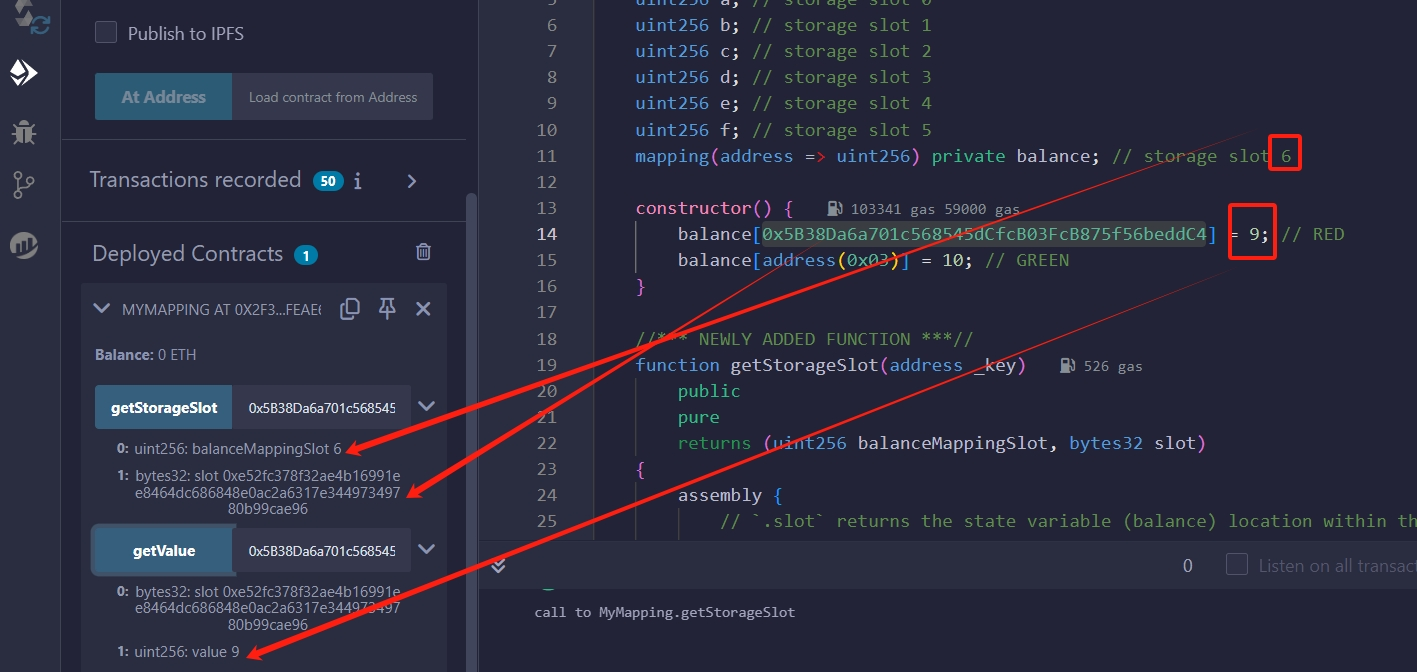
Seaport获取 Mapping值
// error ChannelClosed(address channel)
uint256 constant ChannelClosed_error_signature = (
0x93daadf200000000000000000000000000000000000000000000000000000000
);
uint256 constant ChannelClosed_error_ptr = 0x00;
uint256 constant ChannelClosed_channel_ptr = 0x4;
uint256 constant ChannelClosed_error_length = 0x24;
// For the mapping:
// mapping(address => bool) channels
// The position in storage for a particular account is:
// keccak256(abi.encode(account, channels.slot))
uint256 constant ChannelKey_channel_ptr = 0x00;
uint256 constant ChannelKey_slot_ptr = 0x20;
uint256 constant ChannelKey_length = 0x40;
contract Conduit {
// Track the status of each channel.
mapping(address => bool) private _channels;
/**
* @notice Ensure that the caller is currently registered as an open channel
* on the conduit.
*/
modifier onlyOpenChannel() {
// Utilize assembly to access channel storage mapping directly.
assembly {
// Write the caller to scratch space.
mstore(ChannelKey_channel_ptr, caller())
// Write the storage slot for _channels to scratch space.
mstore(ChannelKey_slot_ptr, _channels.slot)
// Derive the position in storage of _channels[msg.sender]
// and check if the stored value is zero.
if iszero(
sload(keccak256(ChannelKey_channel_ptr, ChannelKey_length))
) {
// The caller is not an open channel; revert with
// ChannelClosed(caller). First, set error signature in memory.
mstore(ChannelClosed_error_ptr, ChannelClosed_error_signature)
// Next, set the caller as the argument.
mstore(ChannelClosed_channel_ptr, caller())
// Finally, revert, returning full custom error with argument
// data in memory.
// revert(abi.encodeWithSignature(
// "ChannelClosed(address)", caller()
// ))
revert(ChannelClosed_error_ptr, ChannelClosed_error_length)
}
}
// Continue with function execution.
_;
}
}
嵌套Mapping数据存储
- Mapping(key=>Mapping(…))
- 多重嵌套
mapping的slot存储规则- 每层的
key作为下层的baseSlot值参与计算 - 最外层的
key和参数声明顺序相关
- 每层的
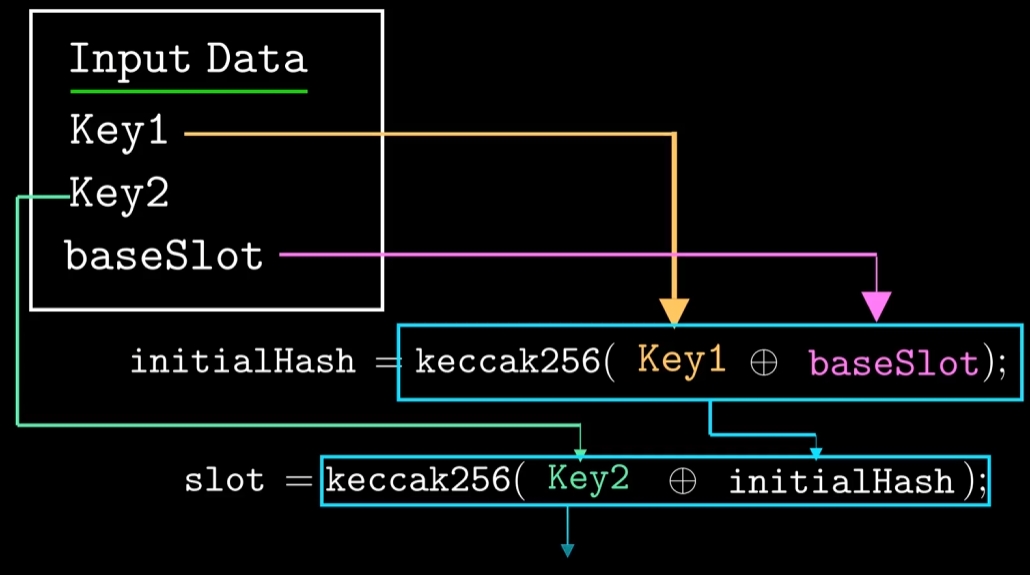
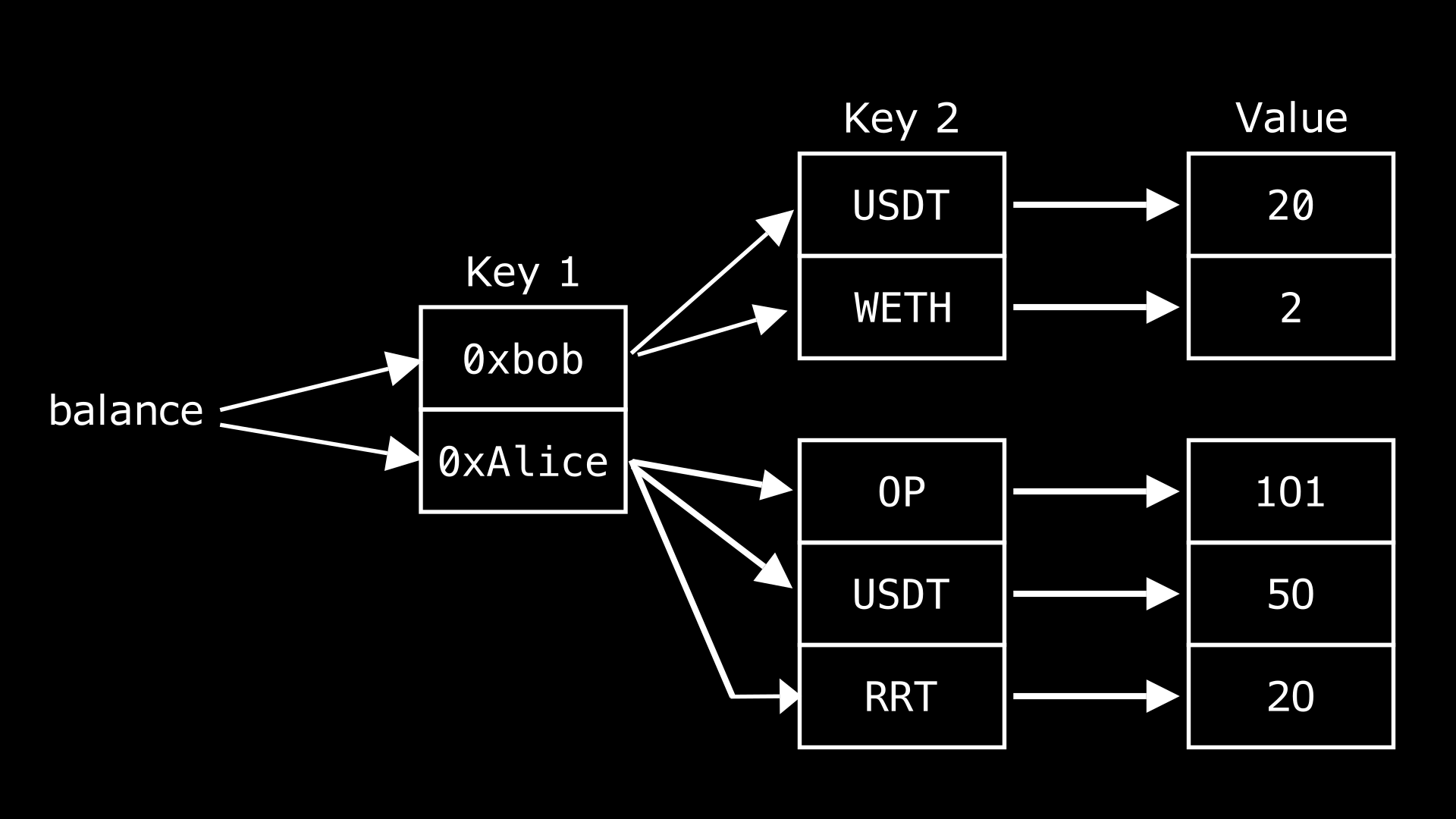
// SPDX-License-Identifier: MIT
pragma solidity =0.8.26;
contract MyNestedMapping {
uint256 a; // storage slot 0
uint256 b; // storage slot 1
uint256 c; // storage slot 2
uint256 d; // storage slot 3
uint256 e; // storage slot 4
uint256 f; // storage slot 5
mapping(address => mapping(uint256 => uint256)) public balance; // storage slot 6
constructor() {
balance[0x5B38Da6a701c568545dCfcB03FcB875f56beddC4][123] = 9; // RED
}
//*** NEWLY ADDED FUNCTION ***//
function getStorageSlot(address key1, uint256 key2)
public
pure
returns (uint256 balanceMappingSlot, bytes32 slot)
{
assembly {
// `.slot` returns the state variable (balance) location within the storage slots.
// In our case, balance.slot = 6
balanceMappingSlot := balance.slot
}
bytes32 slot1 = keccak256(
abi.encode(
bytes32(abi.encode(key1)),
bytes32(abi.encode(balanceMappingSlot))
)
);
slot = keccak256(abi.encode(bytes32(abi.encode(key2)), slot1));
}
function getValue(address key1, uint256 key2)
public
view
returns (bytes32 slot, uint256 value)
{
// CALL HELPER FUNCTION TO GET SLOT
(, slot) = getStorageSlot(key1, key2);
assembly {
// Loads the value stored in the slot
value := sload(slot)
}
}
function convert(string memory key) internal pure returns (bytes32 ret) {
require(bytes(key).length <= 32);
assembly {
ret := mload(add(key, 32))
}
}
}
Solidity参数
动态数据类型存储
Arrays数据存储
定长数组
- 定长数组作为固定大小的参数
- 数据存储按照静态类型依次
slot存储 - 定长数组不和其他参数共享
slot
// SPDX-License-Identifier: MIT
pragma solidity =0.8.26;
contract MyFixedUint256Array {
uint256 num; // storage slot 0
uint64[3] myArr = [
4, // storage slot 1
9, // storage slot 1
2 // storage slot 1
];
uint64 next = 5; //storage slot 2
uint128[3] bigArr = [
4, // storage slot 3
9, // storage slot 3
2 // storage slot 4
];
uint64 bnext = 5; //storage slot 5
function getValue(uint256 index) public view returns (uint256 value) {
// CALL HELPER FUNCTION TO GET SLOT
assembly {
// Loads the value stored in the slot
value := sload(index)
}
}
}
不定长数组–arrays[]
- 不定长数据在合约编译时无法确认数据
size,所以在baseSlot存储当前参数的size - 不定长数组具体数据的起始位置和
baseSlot相关:keccak256(baseSlot) - 不定长数组的数据依次从起始位置开始入栈存储
- 不定长数组的数据按照数值类型补位存储,
slot进行高位补足存储数组参数 - 数值长度超出
256bit后,顺延至下一个slot存储(index += 1)
// SPDX-License-Identifier: MIT
pragma solidity =0.8.26;
contract MyDynArray {
uint256 private someNumber; // storage slot 0
address private someAddress; // storage slot 1
uint32[] private myDynamicArr = [3, 4, 5, 9, 7]; // storage slot 2
function getSlot(uint256 _index) public pure returns (uint256 slot) {
uint256 baseSlot;
assembly {
// `.slot` returns the state variable (balance) location within the storage slots.
// In our case, balance.slot = 6
baseSlot := myDynamicArr.slot
}
slot = uint256(keccak256(abi.encode(baseSlot))) + _index;
}
function getSlotValue(uint256 slot) public view returns (bytes32 value) {
assembly {
value := sload(slot)
}
}
}
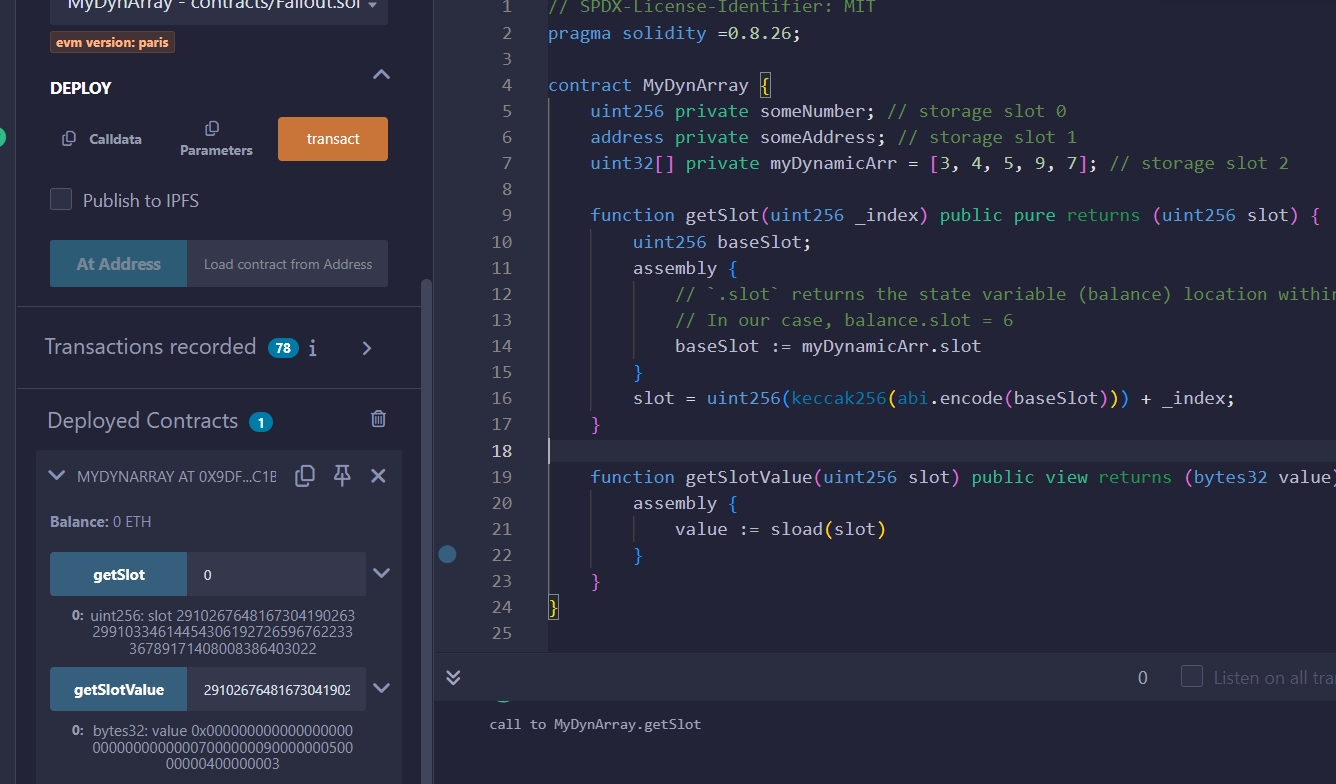
- 数据类型变成
uint64[] private myDynamicArr = [3, 4, 5, 9, 7]; // storage slot 2:- 一个
slot最多存储4个数组参数 - 因此,起始位置
index=0的slot能够存储3,4,5,9四个参数 - 剩余参数顺眼至下一个
slot - 因此,起始位置
index=1的slot存储7
- 一个
多维不定长数组
- array[][]…
uint64[][] private nestedDynamicArray = [[2, 9, 6, 3, 2], [7, 4, 8, 10, 2]]; baseSlot存储当前数组大小,示例大小为2- 进一步确认内部嵌套的数组大小,存储内部数组大小的
slot_array_size和 数组index相关:slot_array_size = keccak256(baseSlot)+ index - 嵌套数组内部的数据
slot_array_data_loc和slot_array_size以及内部internal_index相关:slot_array_data_loc = keccak256(slot_array_size)+ internal_index - 嵌套数组内部的数据存储按照单维存储规则
// SPDX-License-Identifier: MIT
pragma solidity =0.8.26;
contract MyNestedArray {
uint256 private someNumber; // storage slot 0
// Initialize nested array
uint64[][] private nestedDynamicArray = [[2, 9, 6, 3, 2], [7, 4, 8, 10, 2]]; // storage slot 1
function getArrSizeLoc_BaseSlot_Index(uint256 index)
public
pure
returns (uint256 slot)
{
uint256 baseSlot;
for (uint256 i; i <= index; i++) {
if (i == 0) {
assembly {
// `.slot` returns the state variable (balance) location within the storage slots.
// In our case, balance.slot = 6
baseSlot := nestedDynamicArray.slot
}
}
slot = uint256(keccak256(abi.encode(baseSlot))) + index;
}
}
function getArrDataLoc_SlotLoc_InternalIndex(uint256 locslot, uint256 index)
public
pure
returns (uint256 slot)
{
slot = uint256(keccak256(abi.encode(locslot))) + index;
}
function getSlot(
uint256 baseSlot,
uint256 _index1,
uint256 _index2
) public pure returns (bytes32 _finalSlot) {
// keccak256(baseSlot) + _index1
uint256 _initialSlot = uint256(keccak256(abi.encode(baseSlot))) +
_index1;
// keccak256(_initialSlot) + _index2
_finalSlot = bytes32(
uint256(keccak256(abi.encode(_initialSlot))) + _index2
);
}
function getSlotValue(uint256 _slot) public view returns (uint256 value) {
assembly {
value := sload(_slot)
}
}
function addArray() external {
nestedDynamicArray.push([22, 6, 99, 14]);
}
}
数据:[[2, 9, 6, 3, 2], [7, 4, 8, 10, 2]],Array[array1,array2]
动态数据类型存储
| 说明 | slot | Value |
|---|---|---|
| baseSlot | 1 | 2 |
| array1 存储size的slot,s1 | keccack(1)+0= 80084422859880547211683076133703299733277748156566366325829078699459944778998 | 5 |
| array2 存储size的slot,s2 | keccack(1)+1= 80084422859880547211683076133703299733277748156566366325829078699459944778999 | 5 |
| array1 存储index0的数据slot,d1 | keccack(s1)+0= 82253526175936117417672031222849803842933200219522072251142807856800200228130 | 0x0000000000000003000000000000000600000000000000090000000000000002 |
| array1 存储index1的数据slot,d2 | keccack(s1)+1= 82253526175936117417672031222849803842933200219522072251142807856800200228131 | 0x0000000000000000000000000000000000000000000000000000000000000002 |
| array2 存储index0的数据slot,d3 | keccack(s2)+0= 106053296617608346790393806727882046642653284128270527600775845709961105489201 | 0x000000000000000a000000000000000800000000000000040000000000000007 |
| array2 存储index1的数据slot,d4 | keccack(s2)+1= 106053296617608346790393806727882046642653284128270527600775845709961105489202 | 0x0000000000000000000000000000000000000000000000000000000000000002 |
Solidity参数
动态数据类型存储
String
- string 作为动态类型:
- 短
string(<31bytes),baseSlot存储string以及size(len(string) * 2),string中每个字符占据两位 - 短
string,string data编码在高位,size编码在低位
- 短

- 长
string(>31bytes),baseSlot仅存储size(len(string) * 2 + 1) - 长
string data存储的起始slot = keccak256(baseSlot),依次顺延存储
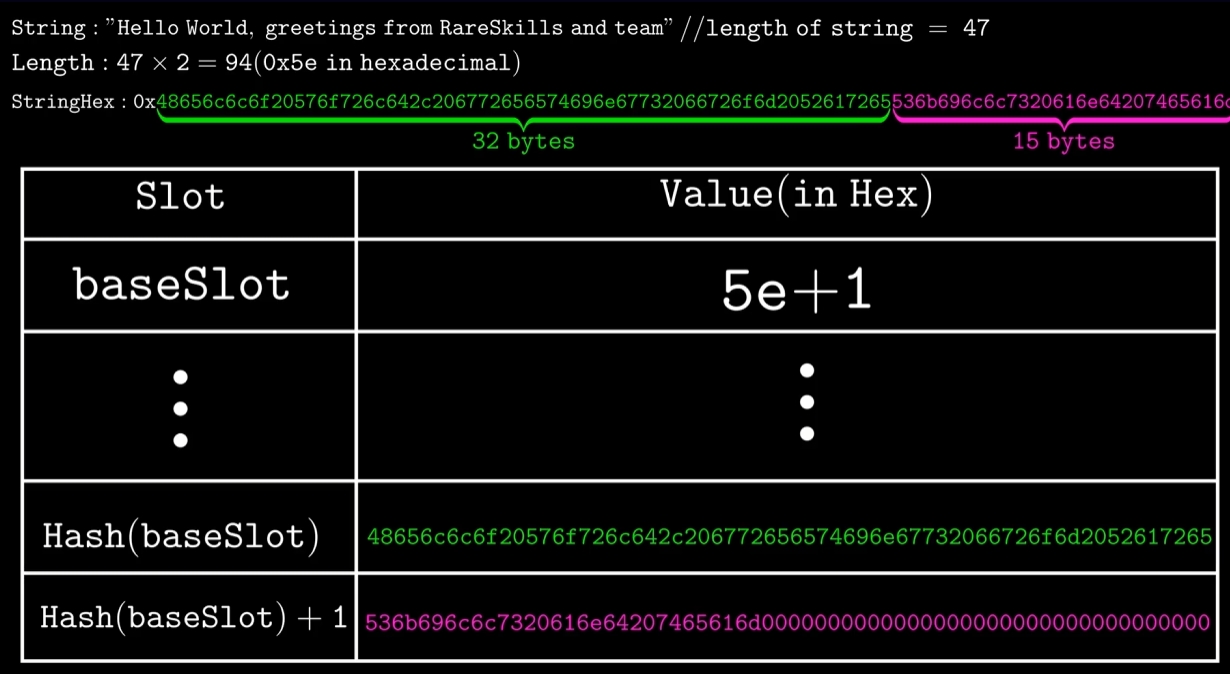
size
- 长/短
string的size计算方式不同的原因在于让字节码更好的区分string的长短 - 短
string的size = len(string)*2表示偶数,因此最后一位一定是0 - 长
string的size = len(string)*2+1表示奇数,最后一位一定是1
// SPDX-License-Identifier: MIT
pragma solidity =0.8.26;
contract ModMethod {
// Gas cost: 326
function isEvenMod(uint256 num) public pure returns (bool x) {
x = (num % 2) == 0;
}
// Gas cost: 272
function isEvenAnd(uint256 num) public pure returns (bool x) {
x = (num & 1) == 0;
}
}
Bytes
bytes动态数组slot存储规则和string一致bytes0x固定大小数组 和array固定数组存储规则一致
Solidity参数
动态数据类型存储
Struct
- 结构体内部数据直接从
baseSlot依次按照类型存储
Slot 存储读取
sload读取当前slot位置的valuesstore更新当前slot位置的value,sload和sstore将参数全部作为bytes32处理,更节省gasFee.slot返回当前参数的baseSlot
读取slot数据
// SPDX-License-Identifier: MIT
pragma solidity =0.8.26;
contract slotLoc {
uint256 private someNumber = 5; // storage slot 0
struct Payment {
address payee;
uint128 payId;
uint256 payPrice;
}
Payment private payment =
Payment(
address(0x1), // storage slot 1
12345, // storage slot 2
22 // storage slot 3
);
address private someAddress = address(0x2); // storage slot 4
uint32[] private myDynamicArr = [3, 4, 5, 9, 7]; // storage slot 5
function getSlot()
public
pure
returns (
uint256 numslot,
uint256 paymentslot,
uint256 addressslot
)
{
assembly {
// `.slot` returns the state variable (balance) location within the storage slots.
// In our case, balance.slot = 6
numslot := someNumber.slot
paymentslot := payment.slot
addressslot := someAddress.slot
}
}
function getSlotValue(uint256 slot) public view returns (bytes32 value) {
assembly {
value := sload(slot)
}
}
function sstore_x(uint256 newval) public {
assembly {
sstore(someNumber.slot, newval)
}
}
}
Preference
https://www.rareskills.io/post/solidity-dynamic
User Defined Types
- Type xx is xxx
- 用户定义类型别名,通过
wrap/unwrap包装和解包装
// SPDX-License-Identifier: MIT
pragma solidity ^0.8.26;
// Code copied from optimism
// https://github.com/ethereum-optimism/optimism/blob/develop/packages/contracts-bedrock/src/dispute/lib/LibUDT.sol
type Duration is uint64;
type Timestamp is uint64;
type Clock is uint128;
library LibClock {
function wrap(Duration _duration, Timestamp _timestamp)
internal
pure
returns (Clock clock_)
{
assembly {
// data | Duration | Timestamp
// bit | 0 ... 63 | 64 ... 127
clock_ := or(shl(0x40, _duration), _timestamp)
}
}
function duration(Clock _clock) internal pure returns (Duration duration_) {
assembly {
duration_ := shr(0x40, _clock)
}
}
function timestamp(Clock _clock)
internal
pure
returns (Timestamp timestamp_)
{
assembly {
timestamp_ := shr(0xC0, shl(0xC0, _clock))
}
}
function unwrap(Clock clock_)
internal
pure
returns (Duration _duration, Timestamp _timestamp)
{
_duration = duration(clock_);
_timestamp = timestamp(clock_);
}
}
contract userDefinedValue {
function wrap_uvdt() external view returns (Clock clock) {
// Turn value type into user defined value type
Duration d = Duration.wrap(1);
Timestamp t = Timestamp.wrap(uint64(block.timestamp));
// Turn user defined value type back into primitive value type
// uint64 d_u64 = Duration.unwrap(d);
// uint64 t_u54 = Timestamp.unwrap(t);
clock = LibClock.wrap(d, t);
}
function unwrap_uvdt(Clock clock)
external
pure
returns (Duration d, Timestamp t)
{
(d, t) = LibClock.unwrap(clock);
}
}
函数
函数修饰符
function <function name> (<parameter types>) {internal|external|public|private} [pure|view|payable|virtual|override|Modifier] [returns (<return types>)]
- internal:未公开的函数,只能在合约内部使用,不能通过
abi直接/外部调用,允许在继承的子合约中使用 - external:公开的函数,可以通过
abi直接调用,也可以在本合约内通过 this.func 调用,允许在继承的子合约中使用 - public:公开的函数,可以通过
abi直接调用,允许在继承的子合约中使用 - private: 未公开的函数,只能在合约内部使用,不允许通过
abi直接调用,不允许在继承的子合约中使用 - pure: 只读,函数只能读取局部变量
- view: 只读,函数可以读取状态变量、局部变量、全局变量
- payable:
payable修饰符表明函数支持接收NativeToken(msg.value!=0) - virtual: 虚函数,表明函数允许重载修改内部逻辑, 多用于接口合约
- override: 重载函数,重新定义函数内部逻辑,但是函数
selector必须保持一致(函数名称、函数参数类型和数量) - Modifier: 修饰器,内部定义条件判断, 允许在继承的子合约中使用
// SPDX-License-Identifier: MIT
pragma solidity ^0.8.26;
contract parentOne {
uint256 public oneValue;
function OneInternal() internal virtual {
oneValue += 1;
}
function OneExternal() external virtual {
oneValue += 2;
}
function OnePublic() public virtual {
oneValue += 3;
}
function OnePrivate() private {
oneValue += 4;
}
}
contract functionsChecker is parentOne {
function addOne() external {
OneInternal();
}
// function addTwo() external {
// this.OneExternal();
// }
function addThree() external {
super.OnePublic(); // super调用最近继承者合约的内部函数, +3
}
// function addFive() external {
// OnePublic(); //调用本合约的函数,+ 5
// }
function OnePublic() public virtual override {
//重写函数,修改函数逻辑
oneValue += 5;
}
//receive() external payable {}
}
函数
构造函数
- 构造函数用于初始化合约参数
- 允许传参,初始化状态变量
- 支持
payable修饰,允许合约部署时msg.value!=0
constructor(parameters)[payable] {
// to-do
}
- 构造函数编码在 initCode,并不会存储上链,仅用来初始化合约参数
- 构造函数的代码不会存储上链,但是构造函数的传参会编码到合约代码
- 如果构造函数内部逻辑为空,那么链上可执行的合约代码和该函数无关
- 继承合约时,需要传参初始化继承的父合约的构造函数
// SPDX-License-Identifier: MIT
pragma solidity 0.8.26;
contract tree {
uint256[] Ids;
constructor(uint256 id) {
Ids.push(id);
}
}
contract leaf is tree {
constructor(uint256 id) tree(id) {}
}
函数修饰器
modifier 修饰符用于判断合约方法的执行前置条件
- 将函数内部的语句放置在
modifier函数的-中执行判断 - 允许继承使用
// SPDX-License-Identifier: MIT
pragma solidity ^0.8.26;
contract modofier {
address owner; //slot 0
modifier onlyOwner() {
require(msg.sender == owner, "Not_Owner"); // 判断 slot0存储的值和当前发送者的地址是否一致
_;
}
}
contract modofierContract is
modofier // 继承父合约的状态变量,private变量继承后无法更新状态值
{
constructor() {
address _addr = msg.sender;
assembly {
sstore(owner.slot, _addr)
}
}
function getValue(uint256 slot) external view returns (address addr) {
assembly {
addr := sload(slot)
}
}
function changeOwner(address _newowner) public onlyOwner {
owner = _newowner;
}
}
函数选择器
selector
- 选择器和
函数名、函数参数相关,和函数&参数的修饰符无关,bytes4(keccak256(abi.encodePacked(functionName)))- 计算选择器时,函数参数之间无空格
- 使用4个字节的函数选择器降低
msg.data的size(函数名称可以无限长,选择器就是4bytes) - 函数选择器不会和
fallback()进行匹配,只有在全部的功能函数没匹配上的时候,才会调用fallback()函数 - 因此,
solidity支持同名不同参数的函数, 因为函数选择器的hash值不一样
selector外部调用
- abi.encodePacked
- abi.encodeWithSelector
- abi.encodeWithSignature
// SPDX-License-Identifier: MIT
// SPDX-License-Identifier: MIT
pragma solidity ^0.8.26;
contract SelectorTest {
uint256 public x;
event Sig(bytes4 sig);
function foo(uint256 num) public {
emit Sig(msg.sig); //this.foo.selector
x += num;
}
function func(uint256 num) external {
x += num;
}
function func(uint256 num, bool flag) external {
if (flag) {
x += num;
}
}
function getSelectorOfFoo() external pure returns (bytes4) {
return this.foo.selector; // 0xc2985578
}
}
contract CallFoo {
event Sig(bytes4 sig);
function callFooLowLevel(SelectorTest _contract, uint256 num) external {
// _contract.foo(num);
// bytes4 fooSelector = 0xc2985578;
emit Sig(msg.sig); // this.callFooLowLevel.selector
bytes4 fooSelector = SelectorTest.foo.selector; //bytes4(keccak256("foo(uint256)"))
(bool ok, ) = address(_contract).call(
abi.encodePacked(fooSelector, num)
);
// | (bool ok, ) = address(_contract).call(abi.encodeWithSelector(fooSelector, num));
// | (bool ok, ) = address(_contract).call(abi.encodeWithSignature("foo(uint256)", num));
require(ok, "call failed");
}
}
Reference
https://www.rareskills.io/post/function-selector
转账
receive() external payable {},函数用于接收NativeToken(EOA直接转账,msg.value !=0)fallback()external payable{},函数缺省情况(包括转账后没有receive()方法)- send 执行转账
- 传递
2300的gas - 转账返回
boolean - 转账失败不会
revert交易,因此,需要判断转账结果
- 传递
- transfer
- 传递
2300的gas - 转账失败的话,整笔交易回滚
- 传递
- call的转账
- 默认会发送 63/64 gas
- 返回
bool和databool表示转账是否成功data返回执行调用的结果
- 交易失败的话不会回滚。
// SPDX-License-Identifier: MIT
pragma solidity ^0.8.26;
contract receiver {
constructor() {}
event ReceiveReceived(address Sender, uint256 Value);
event FallbackReceived(address Sender, uint256 Value);
receive() external payable {
emit ReceiveReceived(msg.sender, msg.value);
}
fallback() external payable {
emit FallbackReceived(msg.sender, msg.value);
}
}
contract payer {
constructor() payable {}
function sendValue(address payable recipient, uint256 amount) external {
bool success = recipient.send(amount); //ReceiveReceived
if (!success) {
revert("Send Trans Failure");
}
}
function transferValue(address payable recipient, uint256 amount) external {
recipient.transfer(amount); //ReceiveReceived
}
function callSendValue(
address payable recipient,
uint256 amount,
bytes memory _data
) external {
(bool success, ) = recipient.call{value: amount}(_data); //ReceiveReceived
if (!success) {
revert("call_send_value_failure");
}
}
// 11053 gas cost
function safeTransferNativeToken(
address to,
uint256 amount,
uint256 txGas
) external {
bool success;
/// @solidity memory-safe-assembly
assembly {
// Transfer the ETH and store if it succeeded or not.
//success := call(gas(), to, amount, 0, 0, 0, 0)
success := call(txGas, to, amount, 0, 0, 0, 0)
}
require(success, "ETH_TRANSFER_FAILED");
}
}
异常捕获
Solidity 将异常情况分为三类:前置(require)、后置(assert)、抛出异常(revert):
三种异常通过 try-catch 捕获处理
require 前置判断
require(condition,"ErrorMsg“), which throws if the condition is false- 条件不满足时就会抛出异常,输出异常字符串(
ErrorMsg) gas花销和描述异常的字符串的长度正相关
- 条件不满足时就会抛出异常,输出异常字符串(
require(
address(this).balance >= value,
"Address: insufficient balance for call"
);
assert 后置判断
assert(condition), which throws if the condition is false- 一般作为后置条件判断,但是无法抛出具体的异常信息
assert (balanceAfter < balanceBefore);
revert
revert() | revert(ErrorMsg) | revert Error()- 可以通过
revert()直接抛出异常 - 异常内支持添加异常信息
revert(ErrorMsg) - 允许抛出自定义的
Error(), 通过revert Error()抛出
- 可以通过
error TransferNotOwner(); // 自定义error
function transferOwner1(uint256 tokenId, address newOwner) public {
if(_owners[tokenId] != msg.sender){
revert TransferNotOwner();
}
_owners[tokenId] = newOwner;
}
try catch
Lower-level
lower-level的调用在EVM层面,直接返回 boolean,bytes,让用户自行捕获异常:
- 外部调用的合约函数执行出现了
revert - 外部调用的合约函数执行了非法逻辑(
/0,out-of-bound) - 外部调用的合约函数
out-of-gas
异常捕获
try external function calls and contract creation calls{}catch
try用户捕获外部函数调用的异常- 不可用于
selector调用的异常捕获 catch匹配异常- Panic(errorCode) via assert
- 0x00,编译器错误
- 0x01,assert 报错
- 0x11,数字越界错误
- 0x12,/0
- 0x21,转化枚举类型时:传参负数或越界
- 0x22,访问错误编码的bytes数组
- 0x31,空数组pop
- 0x32,数组越界
- 0x41,申请内存超额或数组太大
- 0x51,访问局部变量
- 返回数据:
bytes4(keccak256(”Panic(uint256)”))) + encode_uint256
- Error via require|revert
require(bool) = if(bool){revert()},直接 revert(),返回数据为空require(bool, string) = if(bool){revert(string)},返回数据是Error(string)的编码require(bool, UserCustomError()) = if(bool){revert UserCustomError()},报用户自定义错误,返回数据是bytes4(keccak256("UserCustomError()")))
- Panic(errorCode) via assert
function callContractB() external view {
try functionFromAnotherContract() {
//<-- Handle the success case if needed
} catch Panic(uint256 errorCode) {
//<-- handle Panic errors
} catch Error(string memory reason) { //revert(string), require(false, “reason”)
//<-- handle revert with a reason
} catch (bytes memory lowLevelData) { //revert UserCustomError(),require(bool, UserCustomError())
//<-- handle every other errors apart from Panic and Error with a reason
// revert without a message
if (lowLevelData.length == 0) {
console.log("revert without a message occured");
}
// Decode the error data to check if it's the custom error
if (bytes4(abi.encodeWithSignature("CustomError(uint256)")) ==bytes4(lowLevelData)
) {
// handle custom error
console.log("CustomError occured here");
}
}
}
Preference
https://www.rareskills.io/post/try-catch-solidity
import
import导包在声明版本号后,在合约代码前import {contractName} from '...'- 导入合约后,相当于引入了完整的合约文件
import 导包
- 导入本地文件 >import {Address} from ‘./Address.sol’;
- 从网页导入
import {Address} from “https://raw.githubusercontent.com/OpenZeppelin/openzeppelin-contracts/refs/heads/master/contracts/utils/Address.sol”;
- 通过npm 本地包导入
import “@openzeppelin/contracts/utils/Address.sol”;
包内函数
- 直接使用:通过合约名直接调用引入的合约函数
- 继承使用:除library外的合约,继承后可以直接使用包内函数、状态变量
// SPDX-License-Identifier: MIT
pragma solidity ^0.8.26;
import {IERC20} from "https://raw.githubusercontent.com/OpenZeppelin/openzeppelin-contracts/refs/heads/master/contracts/token/ERC20/IERC20.sol";
import {Address} from "@openzeppelin/contracts/utils/Address.sol";
contract sendValue {
function tokenAllowance(
address token,
address owner,
address spender
) public view returns (uint256) {
return IERC20(token).allowance(owner, spender); //Interface contracts
}
function transferValue(address beneficiary, uint256 value) public payable {
Address.sendValue(payable(beneficiary), value); //Library contracts
}
function allowance(address owner, address spender)
external
view
returns (uint256)
{}
}
创建合约
合约通过关键字 CREATE,CREATE2,CREATE3 创建
CREATE
- 新合约地址
address = keccak256( 0xd6 ++ 0x94 ++ deploying_address ++ nonce )[12:]0xd6_94是RLP编码的前缀:0xd6是list长度标记,0x94表示地址是20字节deploying_address是部署者地址- 部署者
nonce,表示这是部署者第几次调用CREATE创建合约- 同一条链上的账户地址
nonce递增,因此账户在相同链上无法部署同样的合约账户 - 同样地址在不同链上,能过够通过相同
nonce值部署相同地址的合约
- 同一条链上的账户地址
最简单的CREATE字节码以及初始化操作
// 高亮:hex 值 | 含义 | 说明
//----------------------------------------------------------------------------------------
0x36 // CALLDATASIZE | 获取 calldata 的长度,stack: [size]
0x3d // RETURNDATASIZE (0) | 压入 0,stack: [0, size]
0x3d // RETURNDATASIZE (0) | 再压一个 0,stack: [0, 0, size]
0x37 // CALLDATACOPY | memory[0:] = calldata,复制 init_code
0x36 // CALLDATASIZE | 再压入 size
0x3d // RETURNDATASIZE (0) | 再压入 0,stack: [0, size]
0x34 // CALLVALUE | 压入 msg.value,stack: [value, 0, size]
0xf0 // CREATE | 使用 create(value, 0, size) 部署合约
//----------------------------------------------------------------------------------------
0x3d // RETURNDATASIZE (0) | 继续:获取 return size 0(只是为了推入 0)
0x52 // MSTORE | memory[0] = returnVal(部署后地址)
0x60 0x08 // PUSH1 0x08 | 压入长度 8
0x60 0x18 // PUSH1 0x18 | 压入 offset = 24 (即 0x18)
0xf3 // RETURN | return memory[24:24+8](就是地址)
bytes internal constant PROXY_BYTECODE = hex"67_36_3d_3d_37_36_3d_34_f0_3d_52_60_08_60_18_f3";
模拟执行过程
1. 外部传入 完整的 init_code(creationCode),call 工厂合约
2. 工厂合约 把 init_code 拷贝进 memory[0:]
3. 工厂合约 使用 CREATE 创建合约(使用 msg.value),创建报错包含构造函数的初始化过程
4. 返回新合约地址(前 20 字节)作为 returndata
图示:
[Deployer]
|
|-- CALL(工厂合约, data: init_code, value: X)
v
[工厂合约 合约]
|
|-- CALLDATACOPY ← 把 init_code 拷贝到 memory[0:]
|-- CALLVALUE ← 获取 msg.value
|-- CREATE(value, memory[0:], size)
|
|-- 返回 newly created 合约地址
🧠 为什么用这个流程(优点)
✅ 最终合约地址只由 工厂合约 地址 和 nonce 决定
✅ init_code 不影响最终合约地址(可预测 + 重复部署)
✅ 利用 CREATE 的递增 nonce 实现稳定的地址生成
✅ 整个 工厂合约 是极简指令集(20 字节以内)
New
- 新合约地址:
Contract x = new Contract{value: _value,salt: salt}(params) new关键字创建新的合约地址value表明创建合约是是否转账,构造函数需要使用payable修饰salt表明当前新建地址是否采用CREATE2关键字constructor parameters表明新建合约时传递的初始化参数
CREATE2
creation_code = memory[offset:offset+size]
address = keccak256(0xff + sender_address + salt + keccak256(init_code))[12:]
- 通过自定义的
salt和合约代码替换递增的nonce值合约代码一般选择合约的 init_code 完整codes- 也就是说,传进去的
bytecode,其实是一个会在部署时被执行的初始化代码,它在执行完成后会: - 执行
constructor - 返回
runtime code - 这个
runtime code就是部署后合约在链上真正存在的代码
- 也就是说,传进去的
- 那为什么我们用的是
type(MyContract).creationCode?- ✅ 正确:
type(MyContract).creationCode就是合约的完整init code - 所有构造函数逻辑
- 所有初始化代码
return语句:把runtime code返回给链
- ✅ 正确:
- 在相同链上通过相同的
salt和合约构造函数的代码,就可以实现同地址合约的提前使用
bytes internal constant PROXY_CHILD_BYTECODE = hex"67_36_3d_3d_37_36_3d_34_f0_3d_52_60_08_60_18_f3";
// KECCAK256_PROXY_CHILD_BYTECODE = keccak256(PROXY_CHILD_BYTECODE);
bytes32 internal constant KECCAK256_PROXY_CHILD_BYTECODE = 0x21c35dbe1b344a2488cf3321d6ce542f8e9f305544ff09e4993a62319a497c1f;
| 使用对象 | 是否正确? | 原因 |
|———————————–| —– | ————————————— |
| type(MyContract).creationCode | ✅ 正确 | 包含 constructor 和返回逻辑,完整的 init code |
| address(MyContract).runtimeCode | ❌ 错误 | 是部署后 runtime code,不含 constructor,不可执行部署 |
Create 和 Create2 对比
| 操作码 | 说明 | 地址可预测性 | 地址计算涉及 |
|---|---|---|---|
CREATE | 普通部署 | ❌ 不可预测 | nonce + sender |
CREATE2 | 可预测部署地址 | ✅ 可预测 | sender + salt + init_code |
完整 Solidity Contracts
// SPDX-License-Identifier: MIT
pragma solidity ^0.8.20;
// This is the older way of doing it using assembly
contract AddrDeployer {
event Create2Created(address addr, bytes32 salt);
event CreateCreated(address addr);
// 1. Deploy the contract by CREATE
function Create(address _owner, uint256 _num)
external
payable
returns (address addr)
{
bytes memory bytecode = abi.encodePacked(
type(contractWithConstructor).creationCode,
abi.encode(_owner, _num)
);
/* NOTE: How to call create
create(v, p, n)
create new contract with code at memory p to p + n
and send v wei
and return the new address
*/
assembly {
addr := create(
callvalue(), // wei sent with current call
// Actual code starts after skipping the first 32 bytes
add(bytecode, 0x20),
mload(bytecode) // Load the size of code contained in the first 32 bytes
)
if iszero(extcodesize(addr)) {
revert(0, 0)
}
}
emit CreateCreated(addr);
}
// 2. Deploy the contract by CREATE2
function Create2(address _owner, uint256 _num)
external
payable
returns (address addr)
{
bytes memory bytecode = abi.encodePacked(
type(contractWithConstructor).creationCode,
abi.encode(_owner, _num)
);
bytes32 salt = keccak256(abi.encode(_owner, _num));
/*
NOTE: How to call create2
create2(v, p, n, s)
create new contract with code at memory p to p + n
and send v wei
and return the new address
where new address = first 20 bytes of keccak256(0xff + address(this) + s + keccak256(mem[p…(p+n)))
s = big-endian 256-bit value
*/
assembly {
addr := create2(
callvalue(), // wei sent with current call
// Actual code starts after skipping the first 32 bytes
add(bytecode, 0x20),
mload(bytecode), // Load the size of code contained in the first 32 bytes
salt // Salt from function arguments
)
if iszero(extcodesize(addr)) {
revert(0, 0)
}
// if no address was created, and returndata is not empty, bubble revert
if and(iszero(addr), not(iszero(returndatasize()))) {
let p := mload(0x40)
returndatacopy(p, 0, returndatasize())
revert(p, returndatasize())
}
}
emit Create2Created(addr, salt);
}
// 3. Deploy the create contract by new
// 合约没有 payable 修饰的构造函数,因此不支持在部署的时候,传递非零的msg.value
function deploy() public payable returns (address) {
return address(new contractWithoutConstructor());
}
function deployWithValue(address _owner, uint256 _num)
public
payable
returns (address)
{
return
address(
new contractWithConstructor{value: msg.value}(_owner, _num)
);
}
// 4. Deploy the create2 contract by new
function deploy2(address _owner, uint256 _num)
external
returns (address pool)
{
pool = address(
new contractWithConstructor{
salt: keccak256(abi.encode(_owner, _num))
}(_owner, _num)
);
}
// Compute the address of the contract to be deployed
// NOTE: _salt is a random number used to create an address
function computeAddress(address _owner, uint256 _num)
external
view
returns (address pool)
{
bytes memory bytecode = abi.encodePacked(
type(contractWithConstructor).creationCode,
abi.encode(_owner, _num)
);
bytes32 POOL_INIT_CODE_HASH = keccak256(bytecode);
// require(key.token0 < key.token1);
pool = address(
uint160(
uint256(
keccak256(
abi.encodePacked(
hex"ff",
address(this),
keccak256(abi.encode(_owner, _num)),
POOL_INIT_CODE_HASH
)
)
)
)
);
}
}
contract contractWithConstructor {
address public owner;
uint256 public num;
constructor(address _owner, uint256 _num) payable {
owner = _owner;
num = _num;
}
function getBalance() public view returns (uint256) {
return address(this).balance;
}
}
contract contractWithoutConstructor {
address public owner;
// uint256 public num;
event ChangeOwnerEvent();
modifier onlyOwner() {
require(msg.sender == owner);
_;
}
function setOwner(address _addr) external {
owner = _addr;
emit ChangeOwnerEvent();
}
receive() external payable {}
fallback() external payable {}
}
通过Nonce+Sender计算合约地址
使用 RLP 规则模拟 普通 CREATE 部署的地址计算,其中:
rlpOffset是RLP编码中CREATE地址的固定前缀- 0xd6 = 0xc0 (short RLP prefix) + 0x16 (length of: 0x94 ++ proxy ++ 0x01).
- 0x94 = 0x80 + 0x14 (0x14 = the length of an address, 20 bytes, in hex).
sender是部署者地址rlpNonce是递增nonce
| Nonce | RLP Encoded As | ||
|---|---|---|---|
| 0 | 0x80 | ||
| 1–127 | 单字节直接编码(如 0x01) | ||
| 128–255 | `0x81 | <1 byte>` | |
| 256–65535 | `0x82 | <2 bytes>` | |
| … | … |
// SPDX-License-Identifier: MIT
pragma solidity ^0.8.26;
contract FindSC {
function computeCreateAddress(address sender, uint256 nonce)
external
pure
returns (address)
{
bytes memory rlpNonce;
bytes memory rlpOffset;
if (nonce == 0x00) {
rlpNonce = abi.encodePacked(uint8(0x80));
rlpOffset = abi.encodePacked(uint8(0xd6), uint8(0x94));
} else if (nonce <= 0x7f) {
rlpNonce = abi.encodePacked(uint8(nonce));
rlpOffset = abi.encodePacked(uint8(0xd6), uint8(0x94));
} else if (nonce <= 0xff) {
rlpNonce = abi.encodePacked(uint8(0x81), uint8(nonce));
rlpOffset = abi.encodePacked(uint8(0xd7), uint8(0x94));
} else if (nonce <= 0xffff) {
rlpNonce = abi.encodePacked(uint8(0x82), bytes2(uint16(nonce)));
rlpOffset = abi.encodePacked(uint8(0xd8), uint8(0x94));
} else if (nonce <= 0xffffff) {
rlpNonce = abi.encodePacked(uint8(0x83), bytes3(uint24(nonce)));
rlpOffset = abi.encodePacked(uint8(0xd9), uint8(0x94));
} else {
rlpNonce = abi.encodePacked(uint8(0x84), bytes4(uint32(nonce)));
rlpOffset = abi.encodePacked(uint8(0xda), uint8(0x94));
}
return
address(
uint160(
uint256(
keccak256(abi.encodePacked(rlpOffset, sender, rlpNonce))
)
)
);
}
}
Reference
https://github.com/Vectorized/solady/blob/main/src/utils/SSTORE2.sol
Create3
关键字 CREATE3 不是 EVM 原生操作码,
而是 一种高阶设计模式(通常通过库如 Solady 实现),
它是在 CREATE + CREATE2 之上构建的,目的是避免地址碰撞并更强确定性。
🔸CREATE3 是什么?
CREATE3是一种部署模式 / 合约工厂模式,
用可预测、稳定的地址部署合约(去除 init_code带来的影响)
🔧 CREATE3 工作方式(简化)
分两步:
-
通过
CREATE2部署一个中间代理(proxy)合约,其地址是固定的(由salt和deployer决定)- 和
init_code无关,使用一个确定的值
- 和
-
这个
proxy合约作为最小的CREATE实现,用于部署目标合约特性 CREATE2 CREATE3 可预测性 ✅ 可预测(但受 init_code 影响) ✅ 更强(仅依赖 salt) 地址复用性 ❌ 相同 salt + code 会失败 ✅ 每次部署都是新地址(nonce 变化) init_code 变更影响地址? 是的 否,地址不变 多次部署同一 salt? ❌ 不可(地址冲突) ✅ 可(proxy nonce + CREATE)
地址推导
CREATE3 模式 中的地址推导机制,其中涉及:
- 一个
proxy合约(由CREATE2部署,地址可预测) - 最终的目标合约(由
proxy用CREATE部署)
🧩 第一部分:计算 proxy 的地址(CREATE2)
proxy_address = keccak256(0xff ++ deployer ++ salt ++ keccak256(init_code))[12:]
其中 Proxy 合约作为 CREATE 合约的最小代理实现:
bytes internal constant PROXY_CHILD_BYTECODE = hex"67_36_3d_3d_37_36_3d_34_f0_3d_52_60_08_60_18_f3";
// KECCAK256_PROXY_CHILD_BYTECODE = keccak256(PROXY_CHILD_BYTECODE);
bytes32 internal constant KECCAK256_PROXY_CHILD_BYTECODE = 0x21c35dbe1b344a2488cf3321d6ce542f8e9f305544ff09e4993a62319a497c1f;
计算/部署 Proxy 地址
[Deployer 合约]
|
|-- CREATE2 部署 Proxy 合约(固定 bytecode)
v
[Proxy 合约(中转器)]
address proxy = address(
uint160(
uint256(
keccak256(
abi.encodePacked(
hex'ff',
address(this),
_salt,
KECCAK256_PROXY_CHILD_BYTECODE
)
)
)
)
);
//deploy proxy
address proxy; assembly { proxy := create2(0, add(creationCode, 32), mload(creationCode), _salt)}
这里与 init_code 完全无关!
| 项目 | 是否影响地址? | 原因 |
|---|---|---|
factory 地址 | ✅ | 影响 proxy 地址(通过 CREATE2) |
salt | ✅ | 影响 proxy 地址 |
proxy 的部署代码 | ✅(但通常固定) | 影响 proxy 地址 |
🔥 init_code | ❌ | 不影响最终地址(它由 proxy 用 CREATE 部署,不看 init_code) |
🧩 第二部分:从 proxy 地址推导目标合约地址(CREATE)
[Deployer]
|
|-- CALL(proxy, data: init_code, value: X)
v
[Proxy 合约]
|
|-- CALLDATACOPY ← 把 init_code 拷贝到 memory[0:]
|-- CALLVALUE ← 获取 msg.value
|-- CREATE(value, memory[0:], size)
|
|-- 返回 newly created 合约地址
// Call proxy with final init code
(bool success,) = proxy.call{ value: _value }(_creationCode);
if (!success || codeSize(addr) == 0) revert ErrorCreatingContract();
proxy.call(...)是执行实际的目标合约部署proxy内部通常会执行create(...)(标准CREATE),把_creationCode执行并部署为runtime codecodeSize(addr)再次检查部署是否成功
🧠 CREATE3 的设计核心
[Deployer]
|
|---> 部署 Proxy at deterministic address (via CREATE2)
|
|---> Proxy uses CREATE(init_code)
|
|---> 部署目标合约 at deterministic CREATE address
这一设计将 CREATE2 和 CREATE 分离:
| 动作 | 用途 | 技术方式 |
|---|---|---|
| 部署 proxy | 为部署目标合约创建中继器 | CREATE2 |
| proxy 部署目标合约 | 真正部署用户逻辑 | CREATE |
✅ CREATE3 模式的本质优势
+-------------------------+
| Deployer Contract |
|-------------------------|
| - Deploy Proxy via |
| CREATE2(salt, bytecode) |
| |
| - Call Proxy with |
| init_code + value |
+-------------------------+
|
v
+-------------------------+
| Proxy Contract |
|-------------------------|
| - Receives init_code |
| - Executes CREATE |
| with that init_code |
| - Returns new address |
+-------------------------+
|
v
+-------------------------+
| Final Deployed Contract |
+-------------------------+
通过这种 CREATE2 + proxy + CREATE 的链式部署方式:
- 用户只需知道
salt→ 能预测最终合约地址- addr = addressOf(_salt) 总是 唯一且可预测
- addr 不依赖 init code 的内容
即使目标合约 init_code 不同,地址也能稳定(与 CREATE2 不同)
假设我们用相同的 salt:
salt = keccak256("user1");
第一次你部署的是 SimpleStorage(uint256)
第二次你部署的是 ERC20(string,string)
结果:
proxy 的地址是一样的(由 factory + salt + proxy_code 决定)
proxy nonce = 1(第一次创建)
所以最终目标合约地址是一样的(即使代码完全不同)
只要销毁 proxy 合约(或用不同 salt),就能重新部署。
salt可重用(每次部署都新建proxy,proxynonce不冲突)
✅ CREATE3 的带来的能力
- 地址高度可预测
- 与构造参数、初始化逻辑无关
- 允许链上用户事先知道部署地址 → 链上注册、链上 DNS、授权管理 等场景非常适合
🧠 背景:CREATE3 中的 salt 复用
proxy = keccak256(0xFF, deployer, salt, keccak256(proxy_bytecode))
如果想重新用同一个 salt 来部署新合约,必须清除上一次部署时用的 proxy,因为 CREATE2 不能在已有合约地址上重新部署
✅ 方法一:让 proxy 自毁(添加自毁逻辑)
function kill() external {
selfdestruct(payable(msg.sender));
}
✅ 方法二:让 proxy 自动 selfdestruct(推荐)
CREATE
SELFDESTRUCT
这样 proxy 完成部署目标合约后会立即销毁,释放地址
[Deployer]
|
|---> CREATE2(proxy, salt)
|
|---> Proxy uses CREATE -> deployed_contract
|---> Proxy executes selfdestruct() <--🧹 清除
示例合约
// SPDX-License-Identifier: MIT
pragma solidity ^0.8.0;
contract SelfDestructProxy {
fallback() external payable {
assembly {
// 获取 calldata size 和地址 0 位置的内存
let size := calldatasize()
calldatacopy(0x0, 0x0, size) // 把 init_code 拷贝到内存0x0开始
// 调用 create 部署目标合约,传递所有的ETH
let addr := create(callvalue(), 0x0, size)
// 如果 create 失败则 revert
if iszero(addr) {
revert(0, 0)
}
// 自毁 proxy,释放地址
selfdestruct(caller())
}
}
}
Dencun 升级后(EIP-6846 & EIP-4750 等相关提案):
selfdestruct不会立即清理状态数据,也不释放合约地址。- 合约代码会被清空(变为空),但合约存储状态依然保留(变为“孤儿“状态)。
- 合约地址依然被认为已使用,不能重复部署。
| 旧版本 EVM | Dencun 升级后 EVM |
|---|---|
selfdestruct 释放地址 | selfdestruct 仅清空代码,不释放地址 |
| 可以用同一个 salt 复用地址 | 不可用同一个 salt 复用地址 |
| 多次部署同一 salt 实现升级 | 需要换新 salt 或改用其他升级方案 |
SoLady Create3 实例
CREATE2计算Proxy
/// @solidity memory-safe-assembly
assembly {
let m := mload(0x40) // Cache the free memory pointer.
mstore(0x00, deployer) // Store `deployer`.
mstore8(0x0b, 0xff) // Store the prefix.
mstore(0x20, salt) // Store the salt.
mstore(0x40, PROXY_INITCODE_HASH) // Store the bytecode hash.
mstore(0x14, keccak256(0x0b, 0x55)) // Store the proxy's address.
}
🧱 内存结构(图示)
✅ 第一步:mstore(0x00, deployer)
内存 offset (hex) 00 01 02 03 ... 0b 0c 1f
数据内容(byte) 00 00 00 00 00 00 00 00 ... [高位0] [deployer 开始] ... [deployer 结束]
范围: [---------------------32 bytes------------------------]
mstore会左侧补0,也就是说:- 内存从
0x00 ~ 0x1f都会被写入 - 其中
0x00 ~ 0x0b存储的是补零的12字节 0x0c ~ 0x1f对应deployer的20字节有效数据
- 内存从
✅ 第二步:mstore8(0x0b, 0xff)
内存 offset (hex) ... 0a 0b 0c
数据内容(byte) ... 00 ff [deployer...]
mstore8(offset,value) 从偏移位置开始写入 1bytes 数据
- 直接在
0x0b位置覆写1字节,将原本的0x00改成0xff - 此时
0x0c ~ 0x1f仍然保留deployer的有效20bytes
✅ 第三四步骤:添加 32bytes 的 salt 和 init_code_hash
结构此时为:
| 偏移(hex) | 内容 | 说明 |
|---|---|---|
0x00-0x0a | 00…00 | Padding |
0x0b | ff | prefix(手动写入) |
0x0c-0x1f | deployer 地址 | 20 字节 |
0x20-0x3f | salt | 32 字节 |
0x40-0x5f | init_code_hash | 32 字节 |
也就是从偏移 0x0b 开始连续的 85=0x55 字节数据:
0x0b= 1 字节(0xff)0x0c ~ 0x1f= 20 字节(deployer)0x20 ~ 0x3f= 32 字节(salt)0x40 ~ 0x5f= 32 字节(init code hash)
✅ 第五步:mstore(0x14, proxy)
📊 存储过程图解
这一步将 hash 写入偏移 0x14,如下:
| 偏移(hex) | 说明 |
|---|---|
0x14 | 写入 hash 的前 1 字节 |
0x15… | … |
0x33 | 写入 hash 的第 32 字节 |
偏移 (hex): 0x00 ──┬──────────────────────┬──────────────────────┬─────────────
内容(简化): │ padding │ ff + deployer │ salt
└───────┬───────────────┘
▼
0x14: ←── mstore here! Overwrites middle with hash result ────────→ 0x33
Memory:
0x0b: ff
0x0c: [ 8B of deployer remains ]
0x14: [↓↓↓↓↓↓↓↓↓↓↓↓↓↓↓↓↓↓↓↓↓↓↓↓↓↓↓↓↓↓↓↓↓↓↓↓↓↓↓↓↓↓↓↓↓↓↓↓↓↓↓↓↓↓↓↓↓↓↓↓↓↓↓↓↓↓↓↓↓↓↓↓↓↓↓↓↓↓]
←────────────── 32 bytes keccak256 result ───────────────→
偏移 (hex): 0x14───────────────────0x20──────────────────────0x33
内容(简化): │ proxy_hash的前12byte│proxy_hash的后20bytes,proxy地址│
🔁 覆盖内容区域:
| 原内容 | 被覆盖字节范围 |
|---|---|
| deployer | 0x14 ~ 0x1f |
| salt | 0x20 ~ 0x33 |
Proxy CREATE contract
mstore(0x40, m) // Restore the free memory pointer.
// 0xd6 = 0xc0 (short RLP prefix) + 0x16 (length of: 0x94 ++ proxy ++ 0x01).
// 0x94 = 0x80 + 0x14 (0x14 = the length of an address, 20 bytes, in hex).
mstore(0x00, 0xd694)
mstore8(0x34, 0x01) // Nonce of the proxy contract (1).
deployed := keccak256(0x1e, 0x17)
✅ 第一步:mstore(0x00, 0xd694)
mstore是32字节(256位)写入操作。0xd694是2 bytes数据,低字节在右(EVM采用大端存储)。- 实际存储在
0x00 ~ 0x1f区间- 前
30 bytes补0, - 后
2 bytes为0xd6 0x94。0x1e为0xd60x1f为0x94
- 前
偏移(十六进制) 内容(16进制) 说明
---------------------------------------------------------------------------------
0x00 ~ 0x1d 00 00 00 ... 00 前30字节,全0
0x1e d6 0xd6 是 0xd694 的高字节
0x1f 94 0x94 是 0xd694 的低字节
偏移 (hex): 0x14────────────────────0x1e-0x1f─0x20──────────────────────0x33
内容(简化): │proxy_hash的前10byte│ d6 │94│ proxy地址 │
✅ 第二步:keccak256(0x1e, 0x17)
从内存偏移 0x1e开始,读取 0x17(23 bytes),作为输入做哈希
| 偏移 | 内容 | 备注 |
|---|---|---|
| 0x1e | d6 (1bytes) | RLP前缀 |
| 0x1f | 94 (1bytes) | 长度标识符 |
| 0x20 ~ 0x33 | proxy地址((20bytes)) | 从之前的mstore(0x14, hash)写入 |
| 0x34 | 01 (1bytes) | nonce |
- 写
mstore(0x00, 0xd694),2bytes的0xd694实际放在0x1e、0x1f两个字节, keccak256从0x1e开始读,所以可以完整读取到d6 94,- 之后紧跟
proxy地址20字节,最后是nonce,整体构成了合约地址计算所用的RLP编码格式。
contract-creation
读取内存数据
codecopy 从内存中取出数据
destOffset: 内存中读取数据的起始位置offset: 待拷贝数据的起始位置size: 拷贝数据的长度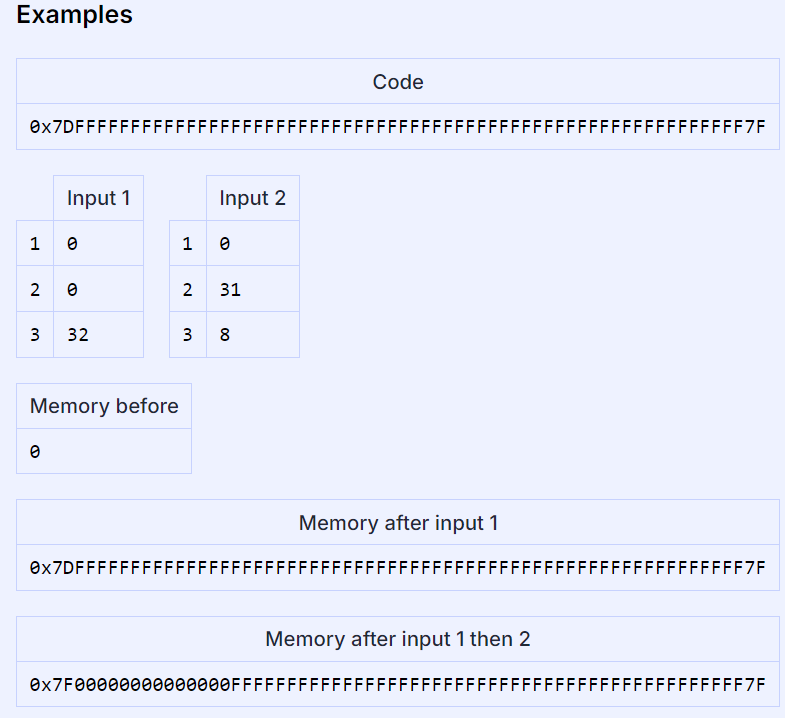
Introduction-creation code
- 合约编译成两部分:
<initCode> + <Runtimecode>(part1_runtimeCode + part2_Metadata)
Miniature Contract Examples
// SPDX-License-Identifier: MIT
pragma solidity ^0.8.17; // optimizer: 200 runs
contract Minimal {
// 空 constructor()函数不影响合约部署的字节码,存在或不存在 constructor()函数,字节码都一样
constructor() payable {}
}
编译后的字节码:
0x6080604052603f8060116000396000f3fe + 6080604052600080fdfea2646970667358221220a4c95008952415576a18240f5049a47507e1658565a8ec11a634c25a9aa17cf164736f6c63430008110033
initCode
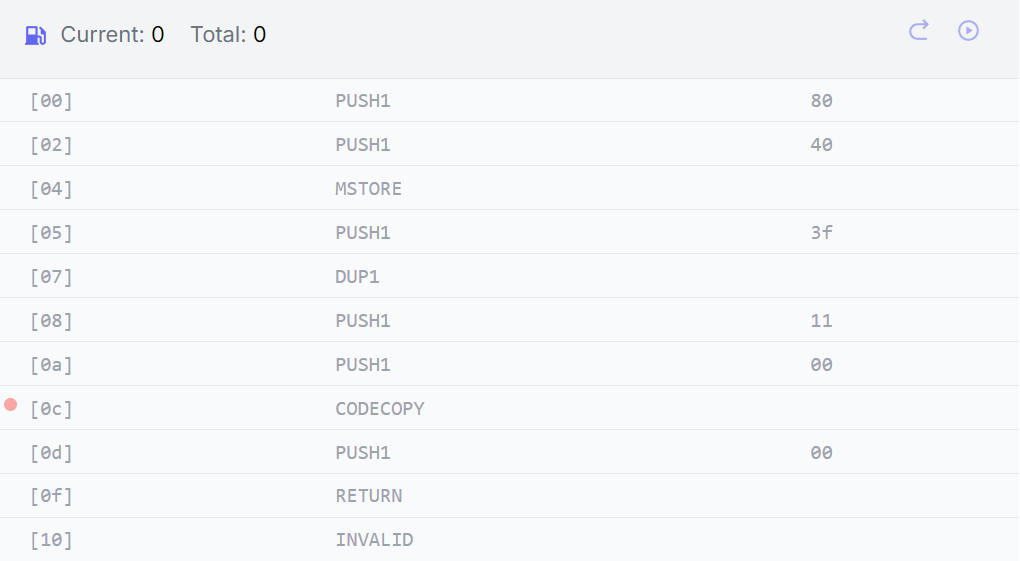
initcode执行codecopy,栈内数据自栈顶向下依次存在值:00,11,3f,3f- 从内存
0index开始,间隔0x11=17开始,跳过initCode部分,读取runtimeCode的0x3f=63bytes数据
- 从内存
return返回内存数据,除initCode部分的值,作为合约数据存储上链
payable|Non-payable constructor()
payable修饰的构造函数下的initCode:0x6080604052603f8060116000396000f3feNon-payable修饰的构造函数下的initCode:0x6080604052348015600f57600080fd5b50603f80601d6000396000f3feNon-payable的initCode更大- 构造函数需要执行
msg.value的判断:348015600f57600080fd5b50 (12 bytes) <initCode> + <extra 12 byte sequence (payable case)>
Non-payable evm codes
// check the amount of wei that was sent
CALLVALUE
DUP1
ISZERO
// Jump to 0x0f (contract deployment step)
PUSH1 0x0f
JUMPI
// revert if wei sent is greater than 0
PUSH1 0x00
DUP1
REVERT
RuntimeCode
RuntimeCode由两部分组成:<Runtimecode>(part1_runtimeCode + part2_Metadata)part1_runtimeCode存储真正的合约逻辑代码,进行函数选择器的匹配和处理part2_Metadata由两部分组成:当前合约编译环境等源数据 + 构造函数传参
- 在空合约中,
part1_runtimeCode为空,但是part2_Metadata源数据不为空
Constructor without parameters
pragma solidity 0.8.17;
contract Runtime {
address lastSender;
constructor () payable {}
receive() external payable {
lastSender = msg.sender;
}
}
编译后的字节码:<initCode> + <Runtimecode>(part1_runtimeCode + part2_Metadata)
 >part1_runtimeCode := 0x608060405236601c57600080546001600160a01b03191633179055005b600080fdfe
>
>part2_Metadata := 0xa2646970667358221220e9b731ab28726d97cbf5219f1e5eaec508f23254c60b15ed1d3456572547c5bf64736f6c63430008070033a2646970667358221220e9b731ab28726d97cbf5219f1e5eaec508f23254c60b15ed1d3456572547c5bf64736f6c63430008070033
>part1_runtimeCode := 0x608060405236601c57600080546001600160a01b03191633179055005b600080fdfe
>
>part2_Metadata := 0xa2646970667358221220e9b731ab28726d97cbf5219f1e5eaec508f23254c60b15ed1d3456572547c5bf64736f6c63430008070033a2646970667358221220e9b731ab28726d97cbf5219f1e5eaec508f23254c60b15ed1d3456572547c5bf64736f6c63430008070033
- part1_runtimeCode
msg.data != "", 由于不存在fallback()函数,直接revertmsg.value != "", 由于存在receive()函数,直接跳转到receive函数执行逻辑
Constructor with parameters
// SPDX-License-Identifier: MIT
pragma solidity ^0.8.17; // optimizer: 200 runs
contract Minimal {
// optimizer: 200contract MinimalLogic {
uint256 private x;
constructor(uint256 _x) payable {
x = _x;
}
}
编译后的字节码:<initCode> + <Runtimecode>(part1_runtimeCode + part2_Metadata)
>“Init code”: 0x608060405260405160893803806089833981016040819052601e916025565b600055603d565b600060208284031215603657600080fd5b5051919050565b603f80604a6000396000f3fe“Runtime code (metadata only)“: 0x6080604052600080fdfea26469706673582212204a131c1478e0e7bb29267fd8f6d38a660b40a25888982bd6618b720d4498b6b464736f6c63430008070033“Constructor arguments”:0000000000000000000000000000000000000000000000000000000000000001
- initCode
- 构造函数需要一个
address类型的传参,传参无效的话,直接revert - 初始化传参变量
- 构造函数需要一个
- part1_runtimeCode
msg.data != "", 由于不存在fallback()函数,直接revertmsg.value != "", 由于不存在receive()函数,直接revert
- part2_Metadata
- 当前合约编译环境等源数据
- 构造函数的传参编码到源数据最后
selfdestruct
- selfdestruct 关键字强制将当前合约余额转给传参地址
- 自毁关键字下的转账行为是不可控,任何合约内部执行 selfdestruct 后都会把余额强制转给传参地址
Dencun upgrade
Dencun 升级后针对 selfdestruct 的问题进行了修正升级:
selfdestruct交易仅仅将合约余额发送到传参地址, 并且不会清除合约状态和代码- 销毁后,不用再次通过 CREATE2 部署相同地址合约,因为原地址的状态和代码还保留在链上
- 销毁后,任何的外部调用 call|delegateCall 也不会失败
- 也不会存在代币锁仓的隐患,因为之前合约的逻辑和状态并未清空
Solidity Examples
// SPDX-License-Identifier: MIT
pragma solidity ^0.8.26;
contract Sale {
uint256 public num;
function buy() external payable {
num += 1;
// _end();
}
function _end() public {
// 仍然保留 num 状态变量的参数
selfdestruct(payable(msg.sender));
}
function bal() external view returns (uint256 baln) {
baln = address(this).balance;
}
}
contract caller {
constructor() payable {}
function buy(Sale sale) external {
(bool success, ) = address(sale).call{value: 100 wei}(
abi.encodeWithSelector(sale.buy.selector)
);
if (!success) {
revert();
}
}
}
contract-codes
判断是否是合约地址的三种方式
msg.sender==tx.originEXTCODESIZE读取code.lengthEXTCODEHASH读取code.hash
Here is some more "rare" knowledge of codesize(), extcodesize() and address(...).code.length:
1) extcodesize will always return 0 when used on a contract that is currently deploying, including address(this).
2) codesize returns the size of the (runtime + constructor) bytecode when called in the constructor.
This is useful if you are writing raw Huff/Yul and want to access the constructor arguments by counting backwards from the end.
3) codesize returns the size of the runtime bytecode (not including constructor bytecode) when called outside the constructor.
4) under the hood (for Solidity) address(this).code.length uses extcodesize(), not codesize()
msg.sender==tx.origin
tx.origin是当前交易的签名地址msg.sender是当前EVM执行环境中的交易发送地址- 对于
EOA直接发起的的合约交易,合约内部:msg.sender==tx.origin - 合约之间外部调用重启
EVM执行环境的外部调用:msg.sender!=tx.origin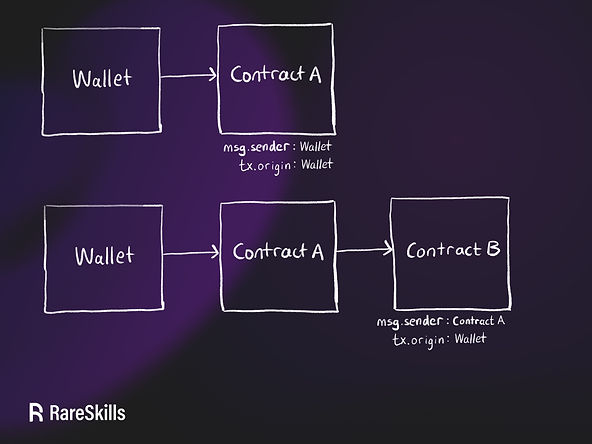
EXTCODESIZE
codeSize = 0, 不表示该地址一定是EOA地址- 有可能是预定义的
create2地址,未来会部署成为合约 - 对方在
constructor()中调用call交易,此时合约未存储上链,codeSize = 0
- 有可能是预定义的
- selfdestruct在
dencun升级后并不会清除合约状态和代码,因此 codeSize != 0
Solidity Examples
// SPDX-License-Identifier: MIT
pragma solidity ^0.8.20;
contract TestAddressSize {
event codeSize(uint256);
function constructorCodeSize() external {
uint256 codes;
address sender = msg.sender;
assembly {
codes := extcodesize(sender)
}
emit codeSize(codes);
}
// 765 gas
function codesize(address target) public view returns (bool isContract) {
if (target.code.length == 0) {
isContract = false;
} else {
isContract = true;
}
}
// 779 gas
function codesizeAssm(address target) public view returns (bool) {
uint256 size;
assembly {
size := extcodesize(target)
}
return size != 0;
}
}
contract onlyConstructor {
constructor() {
address addr = 0x10E2fC1dE57DDC788489122151a6c45254D3ba59;
(bool success, ) = addr.call(
abi.encodeWithSignature("constructorCodeSize()")
);
if (!success) {
revert();
}
}
// [
// {
// "from": "0x10E2fC1dE57DDC788489122151a6c45254D3ba59",
// "topic": "0x35bbf8dac6652434e49dd256e75001562f8cabc9ab024b4ed3f7826b3ab5a81f",
// "event": "codeSize",
// "args": {
// "0": "0"
// }
// }
// ]
}
contract afterSelfDestruct {
function deposit() external payable {}
// 销毁后并不会影响合约的使用
// 销毁保留合约的状态的代码
// 销毁仅仅是强制将合约余额转出
function kill() external {
selfdestruct(payable(msg.sender));
}
}
EXTCODEHASH
- 返回
keccak256(codes) - 如果地址
balance == 0 && codeSize == 0, 返回bytes32(0) - 如果地址
balance != 0 && codeSize == 0, 返回keccak256(""")=0xc5d2460186f7233c927e7db2dcc703c0e500b653ca82273b7bfad8045d85a470 - 如果地址
codeSize != 0, 返回keccak256(codes) - 全部 预编译合约预存
1wei,因此会返回空值的hash
// SPDX-License-Identifier: MIT
pragma solidity ^0.8.20;
contract TestAddressSize {
event codeHash(bytes32);
function constructorCodeHash() external {
bytes32 codehashs;
address sender = msg.sender;
assembly {
codehashs := extcodehash(sender)
}
emit codeHash(codehashs);
}
// gas
function codehash(address target) public view returns (bytes32 hash) {
hash = target.codehash;
}
// gas
function codesizeAssm(address target) public view returns (bytes32 hash) {
assembly {
hash := extcodehash(target)
}
}
}
contract onlyConstructor {
//0x0000000000000000000000000000000000000000000000000000000000000000
constructor() {
address addr = 0x16a90f9ec7A46514b47487bDc2F00d11740c3BA0;
(bool success, ) = addr.call(
abi.encodeWithSignature("constructorCodeSize()")
);
if (!success) {
revert();
}
}
}
contract afterSelfDestruct {
function deposit() external payable {}
// before kill: 0xd0516dff3313077772b6176aa83c5ad4da898b2f66e2dd058b612dbace072fbc
// after kill: 0xd0516dff3313077772b6176aa83c5ad4da898b2f66e2dd058b612dbace072fbc
// 销毁后并不会影响合约的使用
// 销毁保留合约的状态的代码
// 销毁仅仅是强制将合约余额转出
function kill() external {
selfdestruct(payable(msg.sender));
}
}
判断地址是否是合约地址
// SPDX-License-Identifier: MIT
pragma solidity ^0.8.0;
library ContractAddress {
function isContract(address contractAddress) internal view returns (bool) {
bytes32 existingCodeHash = contractAddress.codehash;
// https://eips.ethereum.org/EIPS/eip-1052
// keccak256('') == 0xc5d2460186f7233c927e7db2dcc703c0e500b653ca82273b7bfad8045d85a470
return
existingCodeHash != bytes32(0) &&
existingCodeHash != 0xc5d2460186f7233c927e7db2dcc703c0e500b653ca82273b7bfad8045d85a470;
}
}
获取地址的合约codes
library GetCode {
function at(address _addr) public view returns (bytes memory o_code) {
assembly {
// retrieve the size of the code, this needs assembly
let size := extcodesize(_addr)
// allocate output byte array - this could also be done without assembly
// by using o_code = new bytes(size)
o_code := mload(0x40)
// new "memory end" including padding
mstore(0x40, add(o_code, and(add(add(size, 0x20), 0x1f), not(0x1f))))
// store length in memory
mstore(o_code, size)
// actually retrieve the code, this needs assembly
extcodecopy(_addr, add(o_code, 0x20), 0, size)
}
}
}
假设:
_addr地址的代码大小是 size = 45 字节- 当前空闲内存指针
mload(0x40) = 0x80
- 获取合约代码
size
let size := extcodesize(_addr)
- 获取当前内存的空闲位置
o_code := mload(0x40)
┌───────────────┬─────────────┐
│ 地址 │ 内容 │
├───────────────┼─────────────┤
│ 0x40 │ 0x80 │ ← 当前空闲内存指针
│ o_code = 0x80 │ 分配起点 │
└───────────────┴─────────────┘
- 更新空闲内存的起始位置(防止数据重写覆盖)
mstore(0x40, add(o_code, and(add(add(size, 0x20), 0x1f), not(0x1f))))
size = 45
size + 0x20 = 77 ← 加上 bytes 头
+ 0x1f = 108 ← 向上对齐所需的偏移
& ~0x1f = 0x60 ← 清除低 5 位,变成 32 字节对齐(0x60 = 96)
new_free_ptr = o_code + 96 = 0x80 + 0x60 = 0xE0
┌───────────────┬─────────────┐
│ 地址 │ 内容 │
├───────────────┼─────────────┤
│ 0x40 │ 0xE0 │ ← 更新后的空闲指针
└───────────────┴─────────────┘
- 将合约codes size写入当前获取的内存位置
mstore(o_code, size)
┌───────────────┬────────────────────┐
│ 地址 │ 内容 │
├───────────────┼────────────────────┤
│ 0x80 │ 0x2D (45 十进制) │ ← bytes 长度头
└───────────────┴────────────────────┘
- 拷贝代码到内存中
extcodecopy(_addr, add(o_code, 0x20), 0, size)
┌───────────────┬────────────────────────────┐
│ 地址 │ 内容 │
├───────────────┼────────────────────────────┤
│ 0x80 │ 0x2D (长度 45) │ ← 数组头
│ 0xA0 │ 字节码第1字节 │
│ 0xA1 │ 字节码第2字节 │
│ ... │ ... │
│ 0xA0 + 2C │ 字节码第45字节 │
└───────────────┴────────────────────────────┘
- 最终内存布局
[0x80] ← o_code
↓
┌────────────┬────────────────────────────┐
│ 偏移 │ 内容 │
├────────────┼────────────────────────────┤
│ 0x00 │ length = 45 │
│ 0x20 │ bytecode[0] │
│ 0x21 │ bytecode[1] │
│ ... │ ... │
│ 0x4C │ bytecode[44] │
│ 0xE0 │ 下一个空闲内存指针 │ ← 对齐后更新到 0x40
└────────────┴────────────────────────────┘
最终获取数据是为什么 +0x20
在 Solidity 中,bytes/string 在内存中的布局如下:
| offset | 内容 |
|---|---|
| 0x00 | 数组长度(32 字节) |
| 0x20 | 第一个字节(data[0]) |
| 0x21 | 第二个字节(data[1]) |
| … | 后续数据 |
- o_code 是内存中动态字节数组的起始地址。
- 该地址的前 32 字节存储的是数组的 长度(也就是字节码的大小)。
- 实际数据(bytecode)从 o_code + 0x20 开始。
内存分配为:
0x80: [ 0x64 = 100 ] ← 数组长度
0xA0: [ byte 0 ] ← 字节码实际开始位置
0xA1: [ byte 1 ]
...
0xA0 + 100: [结束]
为什么需要重新定义空闲内存的起始位置
mstore(0x40, add(o_code, and(add(add(size, 0x20), 0x1f), not(0x1f))))
🧠 这句做了什么? 它的作用是:
✅ 更新 Solidity 的“空闲内存指针”,保存在位置 0x40。
这是 Solidity 的一个隐式规范,告诉编译器从哪里开始安全地分配新的内存。
内存从地址 0x80 开始,位置 0x40 是一个特殊的地方,约定用于存储“下一个空闲内存地址”。
🧨 如果你删除了这一句会怎样? 不立即报错,但未来可能造成严重问题:
✅ 当前函数内部看起来可能没有问题,因为你已经分配好了内存。
❌ 一旦后续函数或 Solidity 内部逻辑要再用 mload(0x40) 分配内存,就会错误地覆盖你之前写的内容!
❌ 如果你返回 bytes memory 或多个动态变量,编译器会依赖这个指针进行新分配。
❌ 在 Yul、inline assembly、或 ABI 编码中,这个指针非常关键,不能留错!
举个直观例子:
bytes memory a = at(someAddress);
bytes memory b = new bytes(32); // 编译器使用 mload(0x40) 分配新内存
如果没更新 0x40,b 就可能直接覆盖 a 的内容!
🧩 分两种情况对比:
✅ 正确做法(更新了 0x40)
图示:内存状态
┌────────────┬────────────────────────────┐
│ 地址 │ 内容 │
├────────────┼────────────────────────────┤
│ 0x40 │ 0xE0 ← ✅ 新的空闲地址 │ ← mstore(0x40, ...)
│ 0x80 │ a.length = 45 │ ← o_code
│ 0xA0 │ a.data[0] │
│ ... │ ... │
│ 0xE0 │ b.length = 32 │ ← 新的 b
│ 0x100 │ b.data[0] │
└────────────┴────────────────────────────┘
✅ 一切按规则对齐,数据干净。
❌ 错误做法(删除了 mstore(0x40, …))
图示:内存状态
┌────────────┬────────────────────────────┐
│ 地址 │ 内容 │
├────────────┼────────────────────────────┤
│ 0x40 │ 0x80 ← 😱 没有更新空闲指针 │ ← mload(0x40) 仍为旧值
│ 0x80 │ a.length = 45 │ ← o_code
│ 0xA0 │ a.data[0] │
│ ... │ ... │
│ 0x80 │ b.length = 32 │ ← b 从同一地址分配
│ 0xA0 │ b.data[0] │
└────────────┴────────────────────────────┘
💥 结果:
b分配的内存覆盖了a的数据- 后续读取
a会出现乱码或不一致 - 更严重时可能导致合约行为错误、
ABI解析失败
📉 可能的现象:
| 输出 | 正确写法 | 错误写法 |
|---|---|---|
a.length | 正确值(如 45) | 被 b.length = 32 覆盖变成 32 |
a[0] | 字节码首字节 | 被覆盖可能变为 0x00 |
b[0] | 正常值 | 正常值 |
| 内存布局 | 分开 | 重叠,数据冲突 |
向上对齐到32字节边界?
and(add(add(size, 0x20), 0x1f), not(0x1f))
- 背景:内存对齐
在
EVM里,内存分配通常以32字节 为单位(一个字槽word大小),对齐内存是为了:
避免跨槽读写带来的性能和安全问题
保持内存布局规范,方便 Solidity 编译器和 ABI 解析
- 具体操作
上面操作等价于
aligned_size = (size + 32 + 31) & (~31)
分解
-
size + 32 :给数据加上 32 字节的头部空间(bytes 的长度字段)
操作 功能描述 + 0x1f让非32的倍数“凑满一整块” & ~0x1f清除低5位,确保是32的倍数对齐
Preference
https://github.com/OpenZeppelin/openzeppelin-contracts/issues/5676
https://etherscan.io/tx/0xebc6f503d3c7cf9560308c8efef69a6c4a993a29224d7a4a4f13ca98d6ae0621
contract-sstore2
🔹 使用 SSTORE2 高效存储大量数据
🧱 背景:SSTORE<key,value> 的高成本
在以太坊虚拟机(EVM)中,SSTORE 是用来将数据写入链上存储的指令,
采用的是键值对(key-value)结构,每个键值都是 32 字节。
但是,使用 SSTORE 和 SLOAD(读取)都非常昂贵:
写入数据(SSTORE):
static_gas = 0
if value == current_value
base_dynamic_gas = 100
else if current_value == original_value
if original_value == 0
base_dynamic_gas = 20000
else
base_dynamic_gas = 2900
else
base_dynamic_gas = 100
// On top of the cost above, 2100 is added to base_dynamic_gas if the slot is cold.
写入合约字节码(如通过 CREATE 部署合约):
minimum_word_size = (size + 31) / 32
init_code_cost = 2 * minimum_word_size
code_deposit_cost = 200 * deployed_code_size
static_gas = 32000
dynamic_gas = init_code_cost + memory_expansion_cost + deployment_code_execution_cost + code_deposit_cost
🚀 SSTORE2 是什么?
SSTORE2 是一种创新的链上数据存储方式,它不再使用传统的 SSTORE 存储键值对,而是:
将你想要保存的数据写入一个新部署合约的字节码中
这样做的优势:
- 合约字节码是不可更改的,天然具备数据完整性
- 数据只写入一次,适合大数据量写入、只读场景
- 在数据量较大的前提下,读取/写入成本远低于
SSTORE/SLOAD
✍️ 如何使用 SSTORE2?
✅ 写入数据(部署数据合约)
- 准备数据:你希望存储的数据(如图片、
JSON、元数据等)是一个bytes数组。 - 构造初始化代码:将数据复制到内存,并把它设为新合约的运行时代码(
runtime code)。 - 部署新合约:使用
CREATE或CREATE2创建一个包含该数据的新合约。
🔧 技巧:我们可以使用一段特殊的 bytecode 进行部署,例如:
0x61_0000_80_600a_3d_39_3d_f3
这段代码是合约创建初始化代码(init_Code),它会在 CREATE 被调用时执行:
把从 offset=0x0a 开始的字节数据复制到内存,然后 RETURN 成为合约 runtime bytecode。
Init Code 是在部署时运行的,最终会将其返回值作为合约的 runtime bytecode 写入链上
🔍 字节码分解(每个指令含义)
📐 第一步:合约字节码布局
| Byte | Opcode | 含义 |
|---|---|---|
| 0x00 | 61 0041 | PUSH2 0x0041(=65 bytes) |
| 0x03 | 80 | DUP1(复制顶层:0x0041) |
| 0x04 | 60 0a | PUSH1 0x0a |
| 0x06 | 3d | RETURNDATASIZE(=0) |
| 0x07 | 39 | CODECOPY(dest, offset, size) |
| 0x08 | 3d | RETURNDATASIZE(=0) |
| 0x09 | f3 | RETURN(dest=0, size=65) |
🧠 执行流程及内存变化图解
我们以 EVM 内存为一个 0-based 的连续区域表示,使用 [offset] = value 方式可视化:
✅ 执行前:
内存和栈为空(未写入)
Stack: []
Memory: 全 0
1️⃣ PUSH2 0x0041(字节码:61 0041)
📦 Stack:
stack ← 0x0041
Top → 0x0041
2️⃣ DUP1(字节码:80)
复制栈顶元素 0x0041
📦 Stack:
Top → 0x0041
0x0041
3️⃣ PUSH1 0x0a(字节码:60 0a)
压入 0x0a,作为 code offset
📦 Stack:
Top → 0x0a
0x0041
0x0041
4️⃣ RETURNDATASIZE(字节码:3d)
RETURNDATASIZE 将最近一次外部调用(例如 call, staticcall, delegatecall 等)
返回的数据大小压入栈顶。
调用前未执行任何外部 call, 因此将 0 压入栈
📦 Stack:
Top → 0x00
0x0a
0x0041
0x0041
5️⃣ CODECOPY(字节码:39)
CODECOPY(dest, offset, size)
栈出栈顺序:
size ← 0x0041
offset ← 0x0a
dest ← 0x00
此时: 从代码 offset 0x0a = 10 bytes 开始,复制 0x41 字节(65 bytes)
写入内存 0x00 开始的区域
📊 内存变化(代码段假设)
在字节码中,从 offset 0x0a 开始是我们要写入的 data(以示例简化):
[0x0a] = 00 aa bb cc dd ee ...
其中,data 开头的 0x00 是 STOP 指令,用于防止外部直接调用执行这段字节码。
写入后,内存 0x00 处是 data:
Memory:
0x00: 00 aa bb cc dd ee ff ...
📦 Stack after CODECOPY:
只剩 size (DUP1 的副本)
Top → 0x0041
6️⃣ RETURNDATASIZE → 0
调用前未执行任何外部 call, 因此将 0 压入栈
📦 Stack:
Top → 0x00
0x0041
7️⃣ RETURN(f3)
从内存 0x00 开始返回 65 字节。
0xsequence合约最简代码
合约代码实现将全部的 codes 写入/读取
其中:
size类型uint32, 占据4 bytes- 使用
0x6000 PUSH1 00代替RETURNDATASIZE
function creationCodeFor(bytes memory _code) internal pure returns (bytes memory) {
/*
0x00 0x63 0x63XXXXXX PUSH4 _code.length size
0x01 0x80 0x80 DUP1 size size
0x02 0x60 0x600e PUSH1 14 14 size size
0x03 0x60 0x6000 PUSH1 00 0 14 size size
0x04 0x39 0x39 CODECOPY size
0x05 0x60 0x6000 PUSH1 00 0 size
0x06 0xf3 0xf3 RETURN
<CODE>
*/
return abi.encodePacked(
hex"63",
uint32(_code.length),
hex"80_60_0E_60_00_39_60_00_F3",
_code
);
}
function write(bytes memory _data) internal returns (address pointer) {
// Append 00 to _data so contract can't be called
// Build init code
bytes memory code = creationCodeFor(
abi.encodePacked(
hex'00', // STOP 防止调用codes
_data
)
);
// Deploy contract using create
assembly { pointer := create(0, add(code, 32), mload(code)) }
// Address MUST be non-zero
if (pointer == address(0)) revert WriteError();
}
📥 读取数据(从合约字节码中读取)
获取存储数据的合约地址(部署时返回)
使用 EXTCODECOPY 从合约字节码中读取数据
从第一个字节偏移 1(跳过 STOP 指令)开始读取
🧠 总结
| 比较项 | SSTORE | SSTORE2 |
|---|---|---|
| 存储方式 | 键值对(slot) | 写入合约字节码 |
| 写入成本 | 22,100 gas/32B | 200 gas/B(写数据越多越省) |
| 是否可变 | 可变(覆盖) | 不可变(合约代码不能更改) |
| 是否可读取 | 使用 SLOAD | 使用 EXTCODECOPY 读取 bytecode |
| 是否适合大数据 | ❌ | ✅ 非常适合一次写入,频繁读取 |
SSTORE2Map/SSTORE3
SSTORE2 使用 CREATE/CREATE2 创建目标合约
SSTORE3 和 SSTORE2Map 结合 CREATE3,使用 salt 值作为 key,用于产生确定的 Proxy,
然后 Proxy 基于 SSTORE2 中的合约 codes 部署目标合约
function write(string memory _key, bytes memory _data) internal returns (address pointer) {
return write(keccak256(bytes(_key)), _data);
}
+-------------------------+
| SSTORE2Map Contract |
|-------------------------|
| - call SSTORE2Map'write (salt,init_code) |
|-------------------------|
| - Deploy Proxy via |
| CREATE2(salt, bytecode) |
| |
| - Call Proxy with |
| init_code + value |
+-------------------------+
|
v
+-------------------------+
| Proxy Contract |
|-------------------------|
| - Receives init_code |
| - Executes CREATE |
| with that init_code |
| - Returns new address |
+-------------------------+
|
v
+-------------------------+
| Final Deployed Contract |
+-------------------------+
event事件
Event 事件是EVM上日志的抽象,具有两大特点:
emit触发事件,可以直接过滤、订阅事件- 经济友好,通过
Event存储数据,每次存储大概花销2000gas
event Transfer(address indexed from, address indexed to, uint256 value);
事件Transfer内部参数表示需要记录在链上的变量类型和参数名称
- 通过
indexed关键字,单独将事件参数作为一个topic进行存储和索引 - 一个
Event最多拥有三个indexed数据 - 没有
indexed关键字修饰的参数作为data变量存储在data域中,作为参数解析
Golang 解析 event事件
func ParseLogFromReceipet(contract, txhash string) {
receipet, err := client.TransactionReceipt(context.Background(), common.HexToHash(txhash))
if err != nil {
log.Fatalf("Error in get TransactionReceipt: %s", err)
}
if receipet.Status == 0 {
fmt.Printf("Tx has failed\n")
return
}
logs := receipet.Logs
ParseLogs(logs, contract)
}
func ParseLogs(logs []*types.Log, contract string) bool {
for _, logData := range logs {
if logData.Address != common.HexToAddress(contract) {
continue
}
Sender := common.HexToAddress(logData.Topics[1].Hex())
types, _ := strconv.ParseInt(hexutil.Encode(logData.Topics[2].Bytes())[2:], 16, 64)
uuid, _ := strconv.ParseInt(hexutil.Encode(logData.Topics[3].Bytes())[2:], 16, 64)
fmt.Printf("Contract: %s, Sender: %s, types: %d, uuid: %d\n", contract, Sender, types, uuid)
return true
}
return false
}
event topic过滤
同时过滤topic1 + topic2 的 logs
for startBlockHeight < latestblockNum {
toblock := startBlockHeight + 10000
if toblock > latestblockNum {
toblock = latestblockNum
}
query := ethereum.FilterQuery{
FromBlock: big.NewInt(startBlockHeight),
ToBlock: big.NewInt(toblock),
Addresses: []common.Address{common.HexToAddress(contract)},
Topics: [][]common.Hash{{common.HexToHash("topic1"), common.HexToHash("topic2")}},
}
logs, err := mainnetLPClient.FilterLogs(context.Background(), query)
if err != nil {
fmt.Printf("Error in filter logs: error:%v", err)
return
}
}
接口
- 接口合约定义函数骨架
- 接口合约通过interface关键字修饰
- 接口合约不能继承除接口外的其他合约
- 接口合约不能定义状态变量
- 接口合约不能包含构造函数
- 接口函数必须使用external修饰
- 接口函数不需要virtual修饰,因为继承接口需要实现接口内的全部函数
- 继承接口合约,必须实现接口内的全部函数
// SPDX-License-Identifier: MIT
pragma solidity ^0.8.26;
import "@openzeppelin/contracts/token/ERC721/IERC721Receiver.sol";
interface IERC721 {
event Getbal(address indexed owner);
function balanceOf(address owner) external returns (uint256 balance);
function ownerOf(uint256 tokenId) external view returns (address owner);
}
contract myToken is IERC721 {
mapping(address => uint256) balances;
function deposit() public payable {
balances[msg.sender] += 1000;
}
function balanceOf(address owner) external returns (uint256) {
emit Getbal(owner);
return balances[owner];
}
function ownerOf(uint256 tokenId) external view returns (address owner) {}
function onERC721Received(
address,
address,
uint256,
bytes calldata
) external pure returns (bytes4) {
return IERC721Receiver.onERC721Received.selector;
}
}
contract interactBAYC {
// 利用BAYC地址创建接口合约变量(ETH主网)
IERC721 BAYC = IERC721(0xAc40c9C8dADE7B9CF37aEBb49Ab49485eBD3510d);
// 通过接口调用BAYC的balanceOf()查询持仓量
function balanceOfBAYC(address owner) external returns (uint256 balance) {
return BAYC.balanceOf(owner);
}
}
库合约
- 库合约使用library关键字修饰
- 库合约作为完整函数的封包使用
- 库合约不能接收token
- 库合约不能被继承或继承别的合约
- 库合约不能存在状态变量
- 库合约不能定义构造函数
- 库合约的使用分为两种:
- 通过
Using library_name for type,此时type类型的变量就可以调用库合约内部函数 - 直接通过
library_name调用函数
- 通过
库合约修饰符
- 仅带有
Internal修饰符的库合约函数代码直接被编码到执行合约中,通过jump跳转执行 - 带有
external修饰符的库合约,必须先被部署在链上,在将链上的库合约地址 编码到执行合约,执行合约通过delegateCall库合约 DelegateCall比jump跳转执行花费更多的gas- 并且带有
external函数的库合约必须先部署在链上,也需要额外的合约部署成本
Solidity Library Internal Function Example
- 仅使用
internal修饰的library合约不需要被部署到区块链上 - 库合约的内部函数被编码到当前执行合约中,直接
jump到当前代码执行
Example: ContractsA 使用 库合约 LibInternal 中的 FuncA
编译合约 ContractA
编译库合约 LibInternal
库合约中的 funcA bytecode 被复制编码到 ContractA bytecode
ContractA bytecode 部署到链上
ContractA 调用 FuncA 的方式和自己内部函数一样,执行 selector 匹配 以及jump 跳转
Solidity Library External Function Example
- 调用任一带有
external修饰的library合约函数,必须先把库合约部署到区块链上 - 执行合约通过
delegateCall调用库合约函数中的external函数
Example: ContractsB 调用库合约 LibInternal 中的 External 修饰的 FuncA
编译合约 ContractB
编译库合约 LibExternal
LibExternal 首先被部署到链上
ContractB bytecode 中嵌入库合约地址,方便后续执行 delegateCall 调用
ContractB 被部署到链上
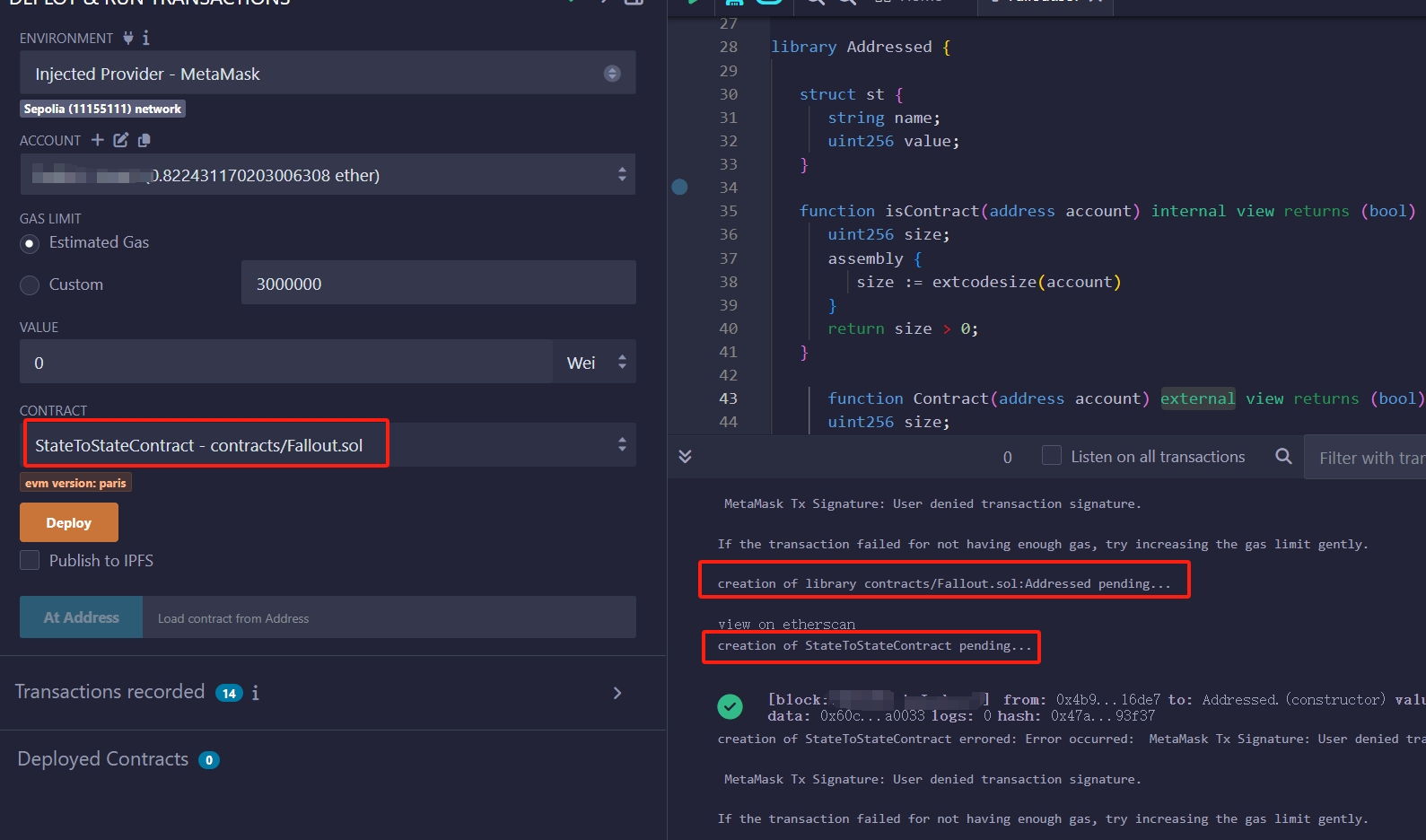
// SPDX-License-Identifier: MIT
pragma solidity ^0.8.26;
library Address {
struct st {
string name;
uint256 value;
}
function isContract(address account) internal view returns (bool) {
uint256 size;
assembly {
size := extcodesize(account)
}
return size > 0;
}
}
contract StateToStateContract {
using Address for address;
function isSC(address _addr) public view returns (bool) {
return Address.isContract(_addr); //_addr.isContract();
}
}
preference
Difference of internal and external library
抽象合约
- 抽象合约介于接口合约和完整合约之间,内部存在未定的函数,不能被直接部署
- 抽象通过abstract关键字修饰,内部包含至少一个未实现具体功能的函数方法(没有
{}) - 抽象合约是用来被继承后补全使用的base contract
逻辑未定函数
- 未实现的函数必须使用virtual修饰,支持后续继承合约的override重写
- 继承函数时,必须继承函数的全部函数、变量、数据结构、修饰器
- 必须override重写函数,补全抽象合约中未定的函数
- 不能修改函数[名称、修饰符、返回类型]、传参的[参数类型、参数数量]
- 允许继承
immutable|constant变量 immutable直接在继承时初始化constant直接继承使用
Solidity Contracts
// SPDX-License-Identifier: MIT
pragma solidity ^0.8.26;
/// @notice Modern and gas efficient ERC20 + EIP-2612 implementation.
/// @author Solmate (https://github.com/transmissions11/solmate/blob/main/src/tokens/ERC20.sol)
/// @author Modified from Uniswap (https://github.com/Uniswap/uniswap-v2-core/blob/master/contracts/UniswapV2ERC20.sol)
/// @dev Do not manually set balances without updating totalSupply, as the sum of all user balances must not exceed it.
abstract contract ERC20 {
/*//////////////////////////////////////////////////////////////
EVENTS
//////////////////////////////////////////////////////////////*/
event Transfer(address indexed from, address indexed to, uint256 amount);
event Approval(
address indexed owner,
address indexed spender,
uint256 amount
);
/*//////////////////////////////////////////////////////////////
METADATA STORAGE
//////////////////////////////////////////////////////////////*/
string public name;
string public symbol;
uint8 public immutable decimals;
/*//////////////////////////////////////////////////////////////
ERC20 STORAGE
//////////////////////////////////////////////////////////////*/
uint256 public totalSupply;
mapping(address => uint256) public balanceOf;
mapping(address => mapping(address => uint256)) public allowance;
/*//////////////////////////////////////////////////////////////
EIP-2612 STORAGE
//////////////////////////////////////////////////////////////*/
uint256 internal immutable INITIAL_CHAIN_ID;
bytes32 internal immutable INITIAL_DOMAIN_SEPARATOR;
mapping(address => uint256) public nonces;
/*//////////////////////////////////////////////////////////////
CONSTRUCTOR
//////////////////////////////////////////////////////////////*/
constructor(
string memory _name,
string memory _symbol,
uint8 _decimals
) {
name = _name;
symbol = _symbol;
decimals = _decimals;
INITIAL_CHAIN_ID = block.chainid;
INITIAL_DOMAIN_SEPARATOR = computeDomainSeparator();
}
/*//////////////////////////////////////////////////////////////
ERC20 LOGIC
//////////////////////////////////////////////////////////////*/
function approve(address spender, uint256 amount)
public
virtual
returns (bool)
{
allowance[msg.sender][spender] = amount;
emit Approval(msg.sender, spender, amount);
return true;
}
function transfer(address to, uint256 amount)
public
virtual
returns (bool)
{
balanceOf[msg.sender] -= amount;
// Cannot overflow because the sum of all user
// balances can't exceed the max uint256 value.
unchecked {
balanceOf[to] += amount;
}
emit Transfer(msg.sender, to, amount);
return true;
}
function transferFrom(
address from,
address to,
uint256 amount
) public virtual returns (bool) {
uint256 allowed = allowance[from][msg.sender]; // Saves gas for limited approvals.
if (allowed != type(uint256).max)
allowance[from][msg.sender] = allowed - amount;
balanceOf[from] -= amount;
// Cannot overflow because the sum of all user
// balances can't exceed the max uint256 value.
unchecked {
balanceOf[to] += amount;
}
emit Transfer(from, to, amount);
return true;
}
/*//////////////////////////////////////////////////////////////
EIP-2612 LOGIC
//////////////////////////////////////////////////////////////*/
function permit(
address owner,
address spender,
uint256 value,
uint256 deadline,
uint8 v,
bytes32 r,
bytes32 s
) public virtual;
function DOMAIN_SEPARATOR() public view virtual returns (bytes32) {
return
block.chainid == INITIAL_CHAIN_ID
? INITIAL_DOMAIN_SEPARATOR
: computeDomainSeparator();
}
function computeDomainSeparator() internal view virtual returns (bytes32) {
return
keccak256(
abi.encode(
keccak256(
"EIP712Domain(string name,string version,uint256 chainId,address verifyingContract)"
),
keccak256(bytes(name)),
keccak256("1"),
block.chainid,
address(this)
)
);
}
/*//////////////////////////////////////////////////////////////
INTERNAL MINT/BURN LOGIC
//////////////////////////////////////////////////////////////*/
function _mint(address to, uint256 amount) internal virtual {
totalSupply += amount;
// Cannot overflow because the sum of all user
// balances can't exceed the max uint256 value.
unchecked {
balanceOf[to] += amount;
}
emit Transfer(address(0), to, amount);
}
function _burn(address from, uint256 amount) internal virtual {
balanceOf[from] -= amount;
// Cannot underflow because a user's balance
// will never be larger than the total supply.
unchecked {
totalSupply -= amount;
}
emit Transfer(from, address(0), amount);
}
}
contract myToken is ERC20 {
constructor(
string memory _name,
string memory _symbol,
uint8 _decimals
) ERC20(_name, _symbol, _decimals) {}
function permit(
address owner,
address spender,
uint256 value,
uint256 deadline,
uint8 v,
bytes32 r,
bytes32 s
) public virtual override {
require(deadline >= block.timestamp, "PERMIT_DEADLINE_EXPIRED");
// Unchecked because the only math done is incrementing
// the owner's nonce which cannot realistically overflow.
unchecked {
address recoveredAddress = ecrecover(
keccak256(
abi.encodePacked(
"\x19\x01",
DOMAIN_SEPARATOR(),
keccak256(
abi.encode(
keccak256(
"Permit(address owner,address spender,uint256 value,uint256 nonce,uint256 deadline)"
),
owner,
spender,
value,
nonces[owner]++,
deadline
)
)
)
),
v,
r,
s
);
require(
recoveredAddress != address(0) && recoveredAddress == owner,
"INVALID_SIGNER"
);
allowance[recoveredAddress][spender] = value;
}
emit Approval(owner, spender, value);
}
}
继承合约
继承合约时,也需要初始化合约的构造函数
合约函数的继承
- 按照继承顺序,继承父合约的全部状态变量
immutable变量需要在 构造函数中声明constant变量直接继承使用- 按照继承顺序,继承父合约的全部修饰器
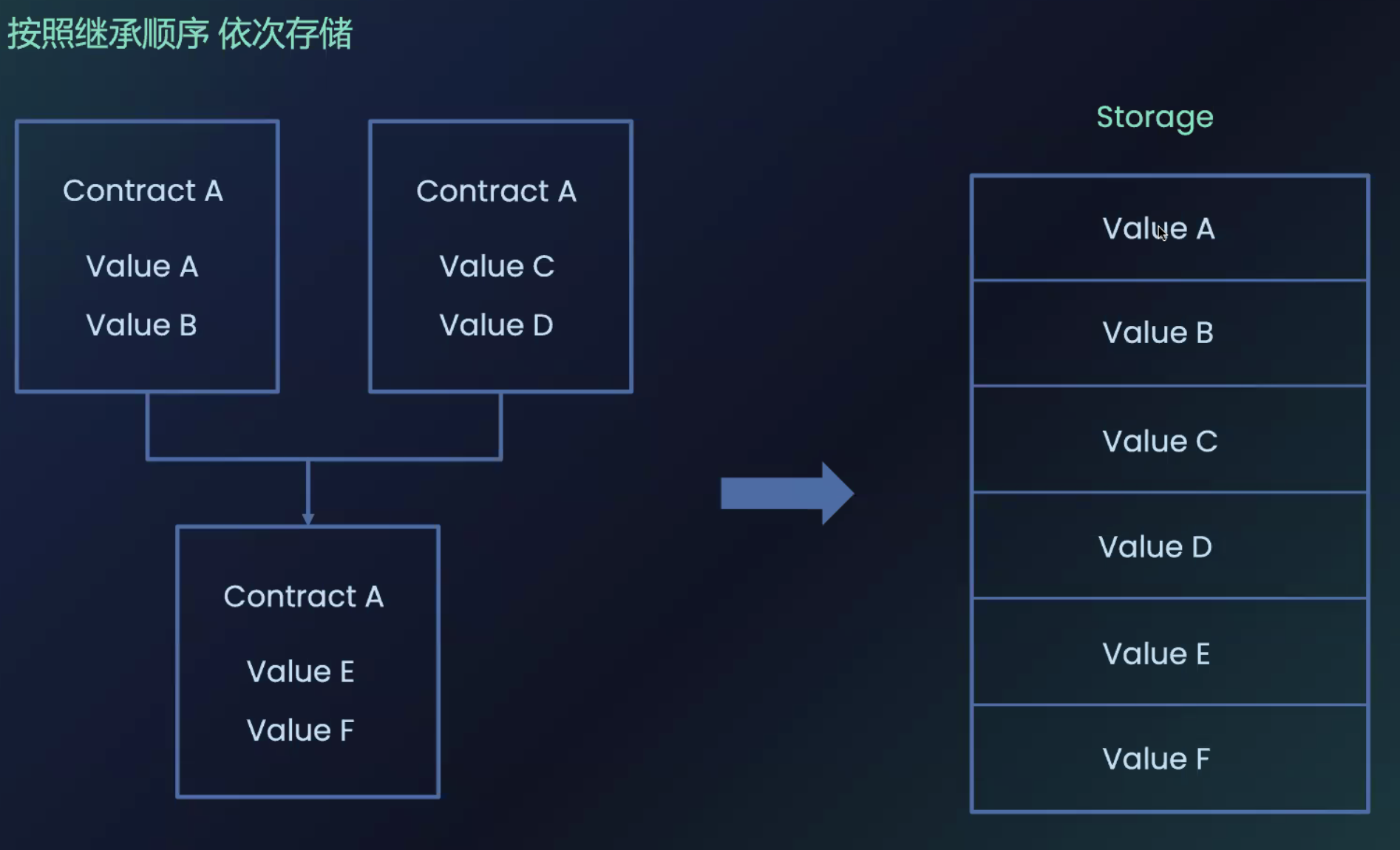
// SPDX-License-Identifier: LGPL-3.0-only
pragma solidity >=0.7.0 <0.9.0;
contract parent {
uint256 public immutable base;
uint256 public constant DAY = 1 days;
uint256 public num;
constructor(uint256 _base) {
base = _base;
}
modifier isOdd(uint256 number) {
require(number % 2 == 0);
_;
}
function checkNumber(uint256 number) external isOdd(number) {
//do someThing
}
}
contract a is parent {
constructor(uint256 _base) parent(_base) {
base = _base;
}
function doAnotherCheck(uint256 number) external isOdd(number) {
// num in slot0
// immutable|constant 直接编码到合约codes,不占slot
num += number;
}
}
- 按照继承顺序,继承父合约的全部函数
override可以重写函数super调用父合约的函数,补充增加函数的限制条件
- 后继承的函数会重写之前继承的函数,因此不能菱形继承(函数互相重写依赖)
// SPDX-License-Identifier: MIT
pragma solidity ^0.8.26;
/* Graph of inheritance
A
/ \
B C
\
D,
*/
contract A {
function foo() public pure virtual returns (string memory) {
return "A";
}
}
// Contracts inherit other contracts by using the keyword 'is'.
contract B is A {
// Override A.foo()
function foo() public pure virtual override returns (string memory) {
return "B";
}
}
contract C is A {
// Override A.foo()
function foo() public pure virtual override returns (string memory) {
return "C";
}
}
// Contracts can inherit from multiple parent contracts.
// When a function is called that is defined multiple times in
// different contracts, parent contracts are searched from
// right to left, and in depth-first manner.
contract D is B, C {
// D.foo() returns "C"
// since C is the right most parent contract with function foo()
function foo() public pure override(B, C) returns (string memory) {
return super.foo();// C ->foo() ==>return C
}
}
- 父合约中
private修饰的状态变量无法直接读取或更新,但可以使用sload|sstore直接操作slot - 父合约中
private修饰的函数无法调用
// SPDX-License-Identifier: LGPL-3.0-only
pragma solidity >=0.7.0 <0.9.0;
contract parent {
uint256 public immutable base;
uint256 public num; //slot0
uint256 private prinum; //slot1
uint256 public num2; // slot2
constructor(uint256 _base) {
base = _base;
}
modifier isOdd(uint256 number) {
require(number % 2 == 0);
_;
}
function checkNumber(uint256 number) external isOdd(number) {
//do someThing
}
}
contract a is parent {
constructor(uint256 _base) parent(_base) {
base = _base;
}
function getSlotValue(uint256 slot) public view returns (bytes32 value) {
assembly {
value := sload(slot)
}
}
function sstore_x(uint256 slot, uint256 newval) public {
assembly {
sstore(slot, newval)
}
}
}
代理合约
- 代理合约底层采用 delegateCall,分离逻辑和数据。
- 由于逻辑和数据分离,后续可以灵活替换逻辑业务
- 代理合约按照逻辑合约代码去更新/读取
EVM环境中的slot的状态变量- 因此替换逻辑合约时,应该保持
slot的状态变量的顺序 - 新增参数只能在末端添加
- 因此替换逻辑合约时,应该保持

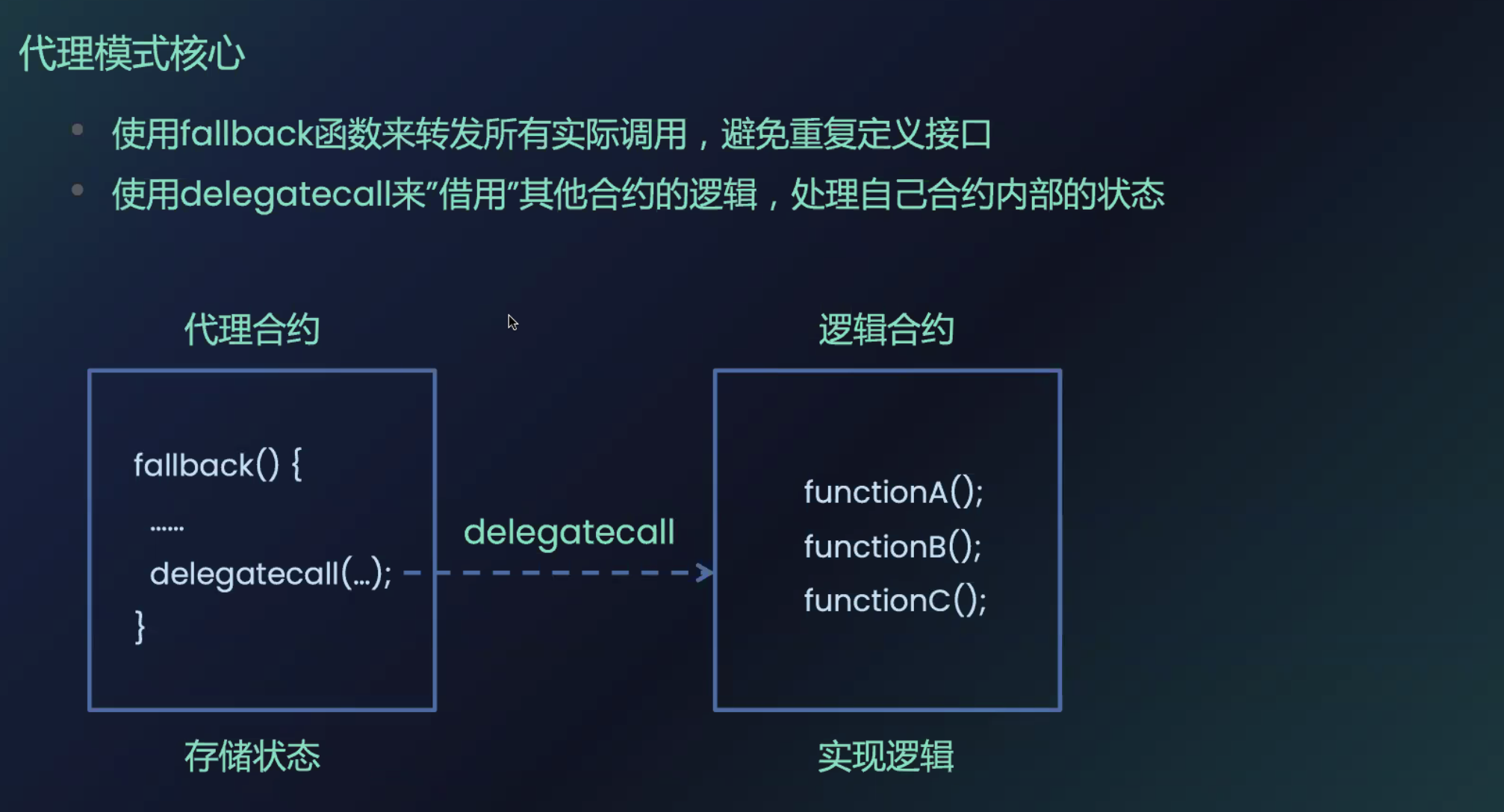
代理合约逻辑
- 用户直接对接代理合约,代理合约存储合约数据
- 代理合约
delegateCall调用逻辑合约,只能更改代理合约内部的状态变量
- 代理合约
- 逻辑合约仅仅负责代理合约数据处理的逻辑
- 逻辑合约的数据不受代理合约的影响
- 因此,需要独立初始化代理合约和逻辑合约的内部参数
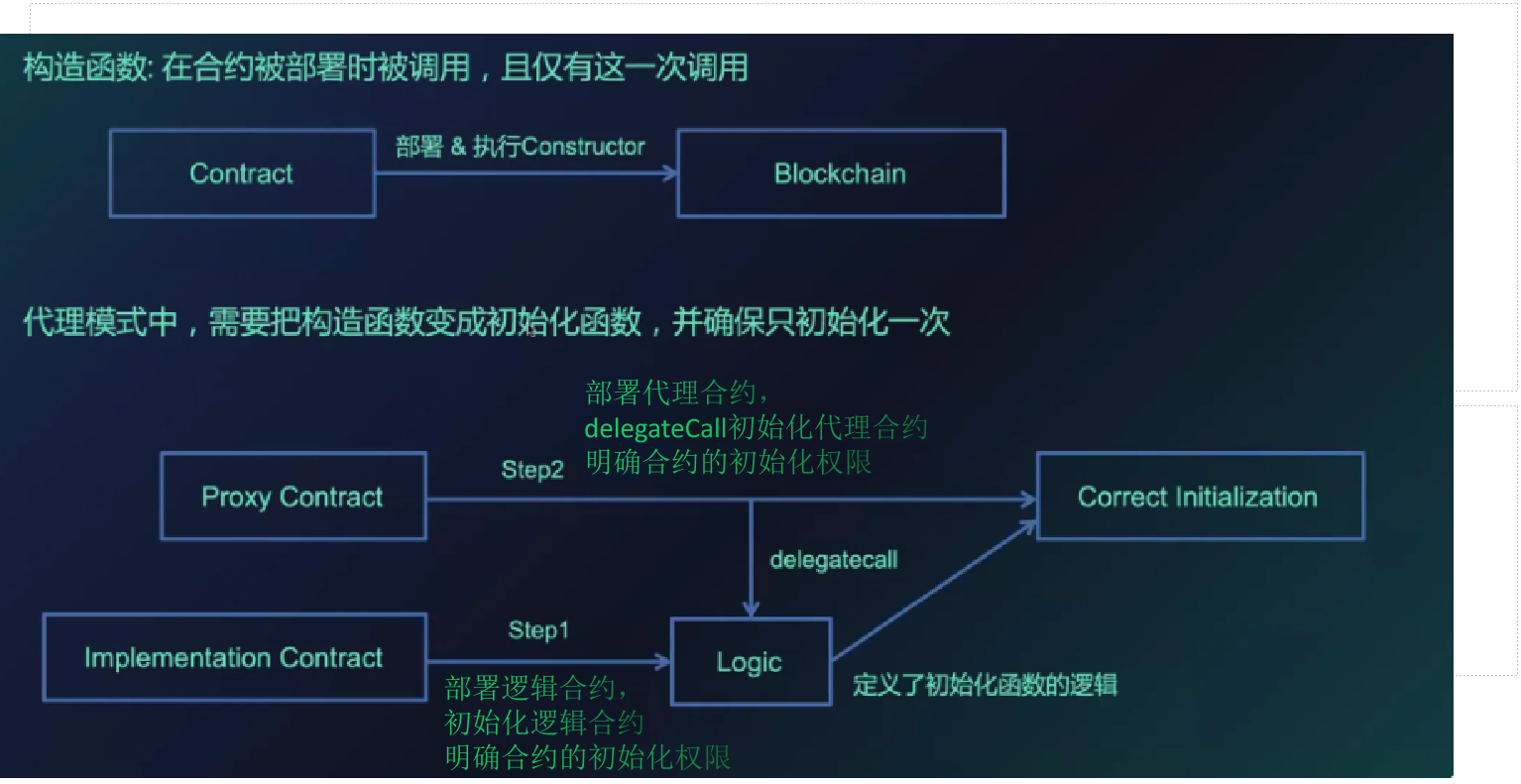
代理合约插槽存储
This is the keccak-256 hash of “eip1967.proxy.implementation” subtracted by 1.
bytes32 internal constant IMPLEMENTATION_SLOT = 0x360894a13ba1a3210667c828492db98dca3e2076cc3735a920a3ca505d382bbc;
This is the keccak-256 hash of “eip1967.proxy.admin” subtracted by 1.
bytes32 internal constant ADMIN_SLOT = 0xb53127684a568b3173ae13b9f8a6016e243e63b6e8ee1178d6a717850b5d6103;
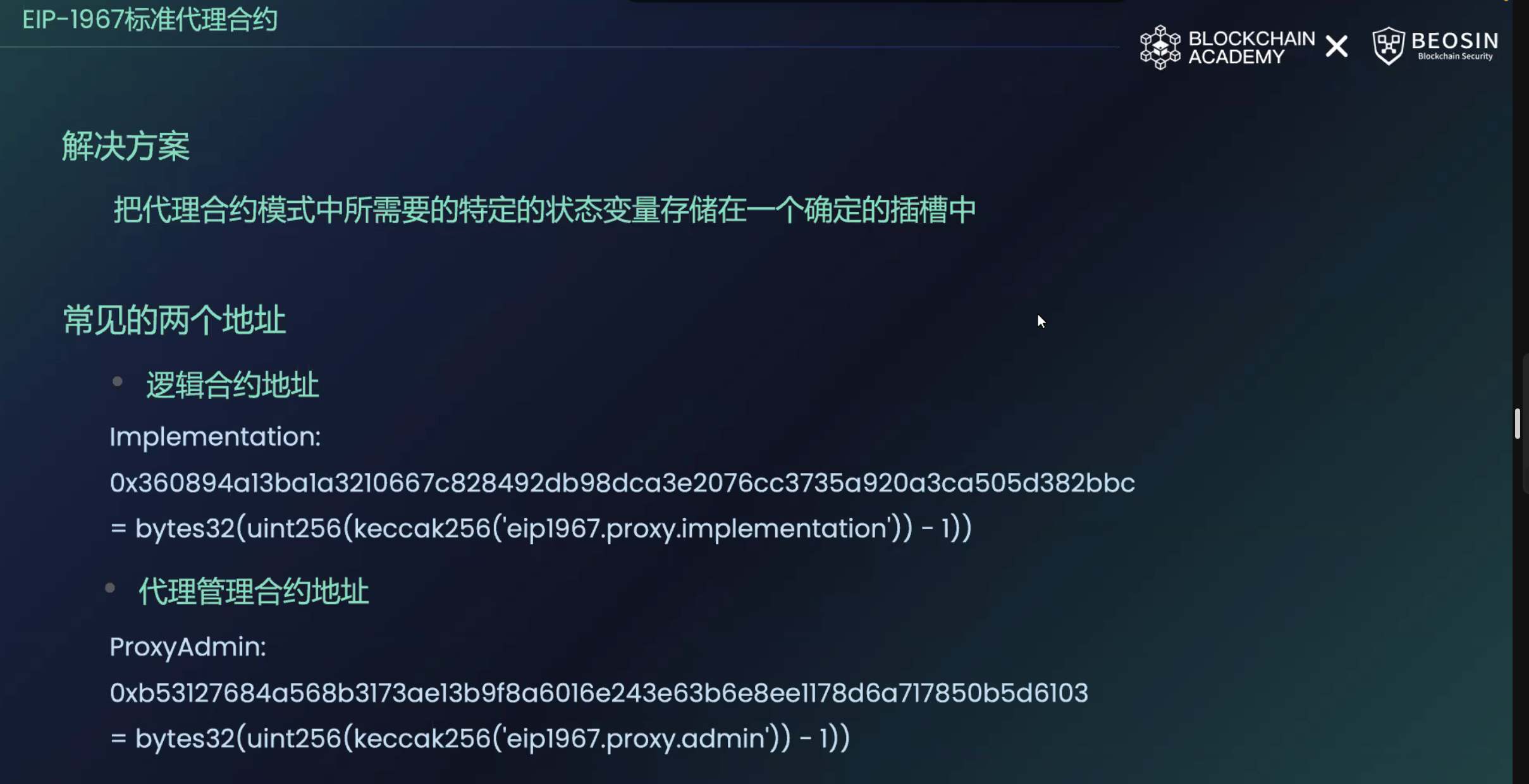
最简代理合约(不可升级clone)

- 最开始的10 bytes 表示
initcode,用来部署最小代理合约
InitCodes
// copy the runtime bytecode of the minimal proxy
// starting from offset 10, and save it to the blockchain
3d [00] RETURNDATASIZE
60 [01] PUSH1 2d
80 [03] DUP1
//push 10 - offset to copy runtime code from
60 [04] PUSH1 0a
3d [06] RETURNDATASIZE
// copy the runtime code and save it to the blockchain
39 [07] CODECOPY // 表示偏移量为0x0a = 10 bytes, 拷贝 0x2d = 45bytes 的 runtimeCodes
81 [08] DUP2
f3 [09] RETURN
RuntimeCodes
| 0x00000000 36 calldatasize cds
| 0x00000001 3d returndatasize 0 cds
| 0x00000002 3d returndatasize 0 0 cds
| 0x00000003 37 calldatacopy
| 0x00000004 3d returndatasize 0
| 0x00000005 3d returndatasize 0 0
| 0x00000006 3d returndatasize 0 0 0
| 0x00000007 36 calldatasize cds 0 0 0
| 0x00000008 3d returndatasize 0 cds 0 0 0
| 0x00000009 73bebebebebe. push20 0xbebebebe 0xbebe 0 cds 0 0 0
| 0x0000001e 5a gas gas 0xbebe 0 cds 0 0 0
| 0x0000001f f4 delegatecall suc 0
| 0x00000020 3d returndatasize rds suc 0
| 0x00000021 82 dup3 0 rds suc 0
| 0x00000022 80 dup1 0 0 rds suc 0
| 0x00000023 3e returndatacopy suc 0
| 0x00000024 90 swap1 0 suc
| 0x00000025 3d returndatasize rds 0 suc
| 0x00000026 91 swap2 suc 0 rds
| 0x00000027 602b push1 0x2b 0x2b suc 0 rds
| ,=< 0x00000029 57 jumpi 0 rds
| | 0x0000002a fd revert
| `-> 0x0000002b 5b jumpdest 0 rds
\ 0x0000002c f3 return
其中,runtime bytecodes 363d3d373d3d3d363d73bebebebebebebebebebebebebebebebebebebebe5af43d82803e903d91602b57fd5bf3 占据 45 bytes
合约创建允许的最大为 24576 bytes,因此在创建代理合约时的传参 size 必须小于 24531
function _cloneCodeWithImmutableArgs(
address implementation,
bytes memory args
) private pure returns (bytes memory) {
if (args.length > 24531) revert CloneArgumentsTooLong();
return
abi.encodePacked(
hex"61",
uint16(args.length + 45),
hex"3d81600a3d39f3363d3d373d3d3d363d73",
implementation,
hex"5af43d82803e903d91602b57fd5bf3",
args
);
}
examples
contract CloneFactory {
function createClone(address target) internal returns (address result) {
bytes20 targetBytes = bytes20(target);
assembly {
let clone := mload(0x40)
mstore(clone, 0x3d602d80600a3d3981f3363d3d373d3d3d363d73000000000000000000000000)
mstore(add(clone, 0x14), targetBytes)
mstore(add(clone, 0x28), 0x5af43d82803e903d91602b57fd5bf30000000000000000000000000000000000)
result := create(0, clone, 0x37) //0x14 + 0x14 + 0x0f
}
}
function isClone(address target, address query) internal view returns (bool result) {
bytes20 targetBytes = bytes20(target);
assembly {
let clone := mload(0x40)
mstore(clone, 0x363d3d373d3d3d363d7300000000000000000000000000000000000000000000)
mstore(add(clone, 0xa), targetBytes)
mstore(add(clone, 0x1e), 0x5af43d82803e903d91602b57fd5bf30000000000000000000000000000000000)
let other := add(clone, 0x40)
extcodecopy(query, other, 0, 0x2d)
result := and(
eq(mload(clone), mload(other)),
eq(mload(add(clone, 0xd)), mload(add(other, 0xd)))
)
}
}
}
简单可升级代理合约实现
逻辑合约地址
- eip1967 允许函数更新
IMPLEMENTATION_SLOT数据 (严格的权限控制),
initialize
- 一般情况下,逻辑合约定义
initialize()函数,按照插槽顺序初始化代理合约数据- 但是需要注意:
initialize()应该只能调用一次,或者拥有严格的权限控制 - 代理合约的初始化不会影响逻辑合约的状态变量
- 逻辑合约必须单独执行数据的初始化,并确保逻辑合约中的初始化只能调用一次,或者拥有严格的权限控制
- 但是需要注意:
// SPDX-License-Identifier: MIT
pragma solidity ^0.8.19;
import "erc721a/contracts/extensions/ERC721ABurnable.sol";
import "@openzeppelin/contracts/access/Ownable.sol";
import "@openzeppelin/contracts/proxy/ERC1967/ERC1967Proxy.sol";
import "@openzeppelin/contracts/access/Ownable.sol";
contract LogisNFT is Ownable, ERC721ABurnable {
bool public mintable;
uint256 public maxSupply;
uint256 private initilaized;
address private launchcaller;
// Current base URI.
string public currentBaseURI;
// The suffix for the token URL, e.g. ".json".
string private tokenURISuffix;
string private nftname;
string private nftsymbol;
error NotMintable();
constructor() payable ERC721A(nftname, nftsymbol) Ownable(_msgSender()) {
initilaized = 1;
}
function initailize(
string memory _name,
string memory _symbol,
string memory _tokenURISuffix,
string memory _currentBaseURI,
uint256 _maxSupply,
address _caller
) public virtual {
require((initilaized == 0), "ALREADY_INITIALIZED");
nftname = _name;
nftsymbol = _symbol;
tokenURISuffix = _tokenURISuffix;
currentBaseURI = _currentBaseURI;
maxSupply = _maxSupply;
launchcaller = _caller;
initilaized = 1;
}
/**
* @dev Returns the token collection name.
*/
function name()
public
view
virtual
override(ERC721A, IERC721A)
returns (string memory)
{
return nftname;
}
/**
* @dev Returns the token collection symbol.
*/
function symbol()
public
view
virtual
override(ERC721A, IERC721A)
returns (string memory)
{
return nftsymbol;
}
/**
* @dev Returns the address of the current owner.
*/
function caller() public view virtual returns (address) {
return launchcaller;
}
/**
* @dev Sets mintable.
*/
function setMintable(bool _mintable) external onlyOwner {
mintable = _mintable;
}
}
contract ProxyBase is ERC1967Proxy, Ownable {
constructor(
address implementation,
bytes memory _data,
address _owner
) ERC1967Proxy(implementation, _data) Ownable(_owner) {}
function implement() external view returns (address) {
return _implementation();
}
function upgradeImpl(address implementation, bytes memory _data)
public
virtual
onlyOwner
{
ERC1967Utils.upgradeToAndCall(implementation, _data);
}
function renounceOwnership() public view override onlyOwner {
revert("CLOSED_INTERFACE");
}
receive() external payable {}
}
contract Factory is Ownable {
address[] public proxys;
event ProxyCreated(address indexed _account);
constructor() Ownable(_msgSender()) {}
function newproxy(
address implementation,
string memory _name,
string memory _symbol,
string memory _tokenURISuffix,
string memory _currentBaseURI,
uint256 _maxSupply,
address _caller,
address _owner
) external onlyOwner {
bytes memory _data = abi.encodeWithSignature(
"initailize(string,string,string,string,uint256,address)",
_name,
_symbol,
_tokenURISuffix,
_currentBaseURI,
_maxSupply,
_caller
);
ProxyBase proxy = new ProxyBase(implementation, _data, _owner);
proxys.push(address(proxy));
emit ProxyCreated(address(proxy));
}
function renounceOwnership() public view override onlyOwner {
revert("CLOSED_INTERFACE");
}
}
合约升级

- 代理合约直接
delegateCall逻辑合约 - 按照逻辑合约的代码更新 代理合约
EVM slot数据
因此,合于升级后不能影响旧的状态变量相对顺序
- 合约升级只能添加新的函数、事件、
error、结构体、immutable|constant变量 - 合约升级允许更新函数逻辑
- 合约升级可以在最后添加新的状态变量,确保旧状态变量的顺序
- 合约升级不能更改状态变量顺序、不能继承新的合约(会改变状态变量顺序)
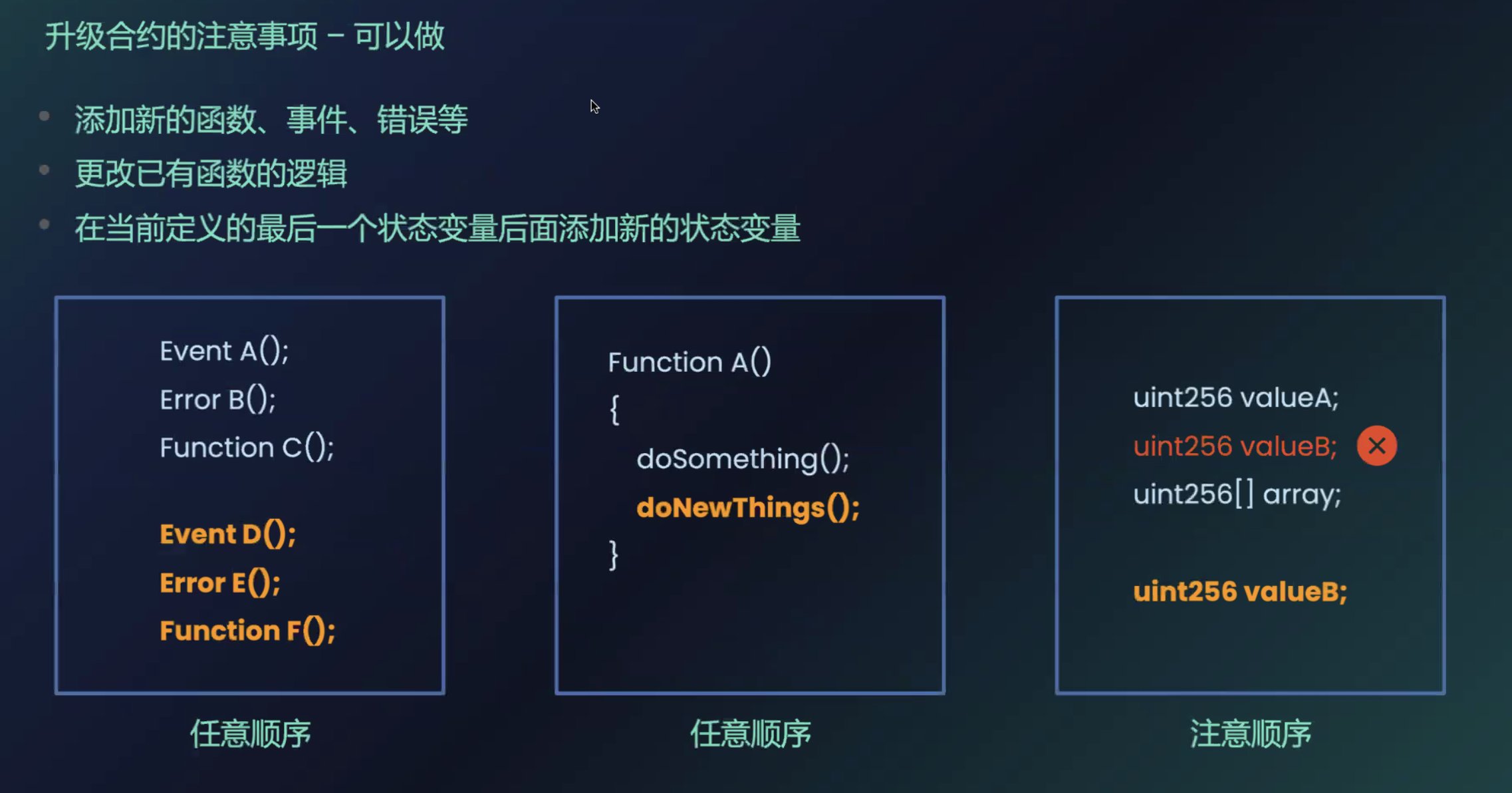
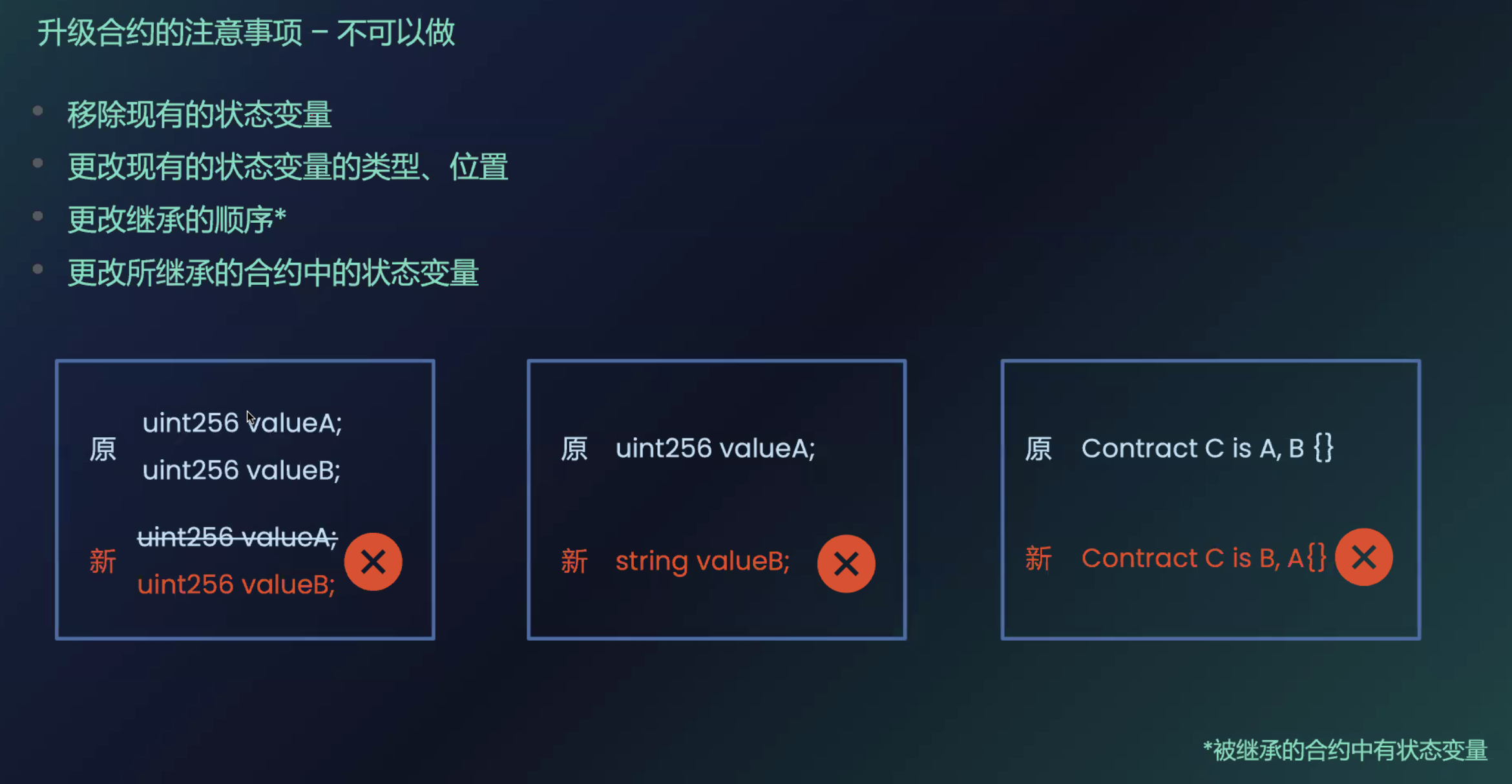
beacon代理合约
- 多个代理合约使用同一个逻辑合约,并且通过单笔交易可以升级多个代理合约的逻辑合约地址
- 适用于一个逻辑产生多个衍生合约的场景(班级学生采用同一个逻辑管理,但是每人拥有各自的状态)
beacon合约
beacon合约作为灯塔,提供当前implementation地址- 全部代理合约去
beacon合约读取逻辑合约地址,发送delegateCall交易
![]()
- 更换新的逻辑合约后,只需要更新
beacon合约的IMPLEMENTATION_SLOT数据,就可以实现all proxy的逻辑地址更新
![]()
// SPDX-License-Identifier: MIT
pragma solidity ^0.8.19;
import "erc721a/contracts/extensions/ERC721ABurnable.sol";
import "@openzeppelin/contracts/access/Ownable.sol";
import "@openzeppelin/contracts/proxy/beacon/BeaconProxy.sol";
import "@openzeppelin/contracts/proxy/beacon/UpgradeableBeacon.sol";
import "@openzeppelin/contracts/access/Ownable.sol";
contract LogisNFT is Ownable, ERC721ABurnable {
bool public mintable;
uint256 public maxSupply;
uint256 private initilaized;
address private launchcaller;
// Current base URI.
string public currentBaseURI;
// The suffix for the token URL, e.g. ".json".
string private tokenURISuffix;
string private nftname;
string private nftsymbol;
error NotMintable();
constructor() payable ERC721A(nftname, nftsymbol) Ownable(_msgSender()) {
initilaized = 1;
}
function initailize(
string memory _name,
string memory _symbol,
string memory _tokenURISuffix,
string memory _currentBaseURI,
uint256 _maxSupply,
address _caller
) public virtual {
require((initilaized == 0), "ALREADY_INITIALIZED");
nftname = _name;
nftsymbol = _symbol;
tokenURISuffix = _tokenURISuffix;
currentBaseURI = _currentBaseURI;
maxSupply = _maxSupply;
launchcaller = _caller;
initilaized = 1;
}
/**
* @dev Returns the token collection name.
*/
function name()
public
view
virtual
override(ERC721A, IERC721A)
returns (string memory)
{
return nftname;
}
/**
* @dev Returns the token collection symbol.
*/
function symbol()
public
view
virtual
override(ERC721A, IERC721A)
returns (string memory)
{
return nftsymbol;
}
/**
* @dev Returns the address of the current owner.
*/
function caller() public view virtual returns (address) {
return launchcaller;
}
/**
* @dev Sets mintable.
*/
function setMintable(bool _mintable) external onlyOwner {
mintable = _mintable;
}
}
// 管理Implementation
contract Beacon is UpgradeableBeacon {
constructor(address implementation_)
UpgradeableBeacon(implementation_, _msgSender())
{}
}
// 管理beacon,用户直接交互的合约
// address private immutable _beacon;
// beacon地址不允许更新,值直接写到合约codes,读取的一直是合约codes中初始化的那个值
// Factory产生的子合约
contract ProxyBase is BeaconProxy, Ownable {
constructor(
address beacon,
bytes memory data, // delegateCall implementation()'s address
address _owner
) BeaconProxy(beacon, data) Ownable(_owner) {}
function implement() external view returns (address) {
return _implementation();
}
function renounceOwnership() public view override onlyOwner {
revert("CLOSED_INTERFACE");
}
function getBeacon() external view returns (address) {
return _getBeacon();
}
receive() external payable {}
}
contract Factory is Ownable {
address[] public proxys;
event ProxyCreated(address indexed _account);
constructor() Ownable(_msgSender()) {}
function newproxy(
address beacon,
string memory _name,
string memory _symbol,
string memory _tokenURISuffix,
string memory _currentBaseURI,
uint256 _maxSupply,
address _caller,
address _owner
) external onlyOwner {
bytes memory _data = abi.encodeWithSignature(
"initailize(string,string,string,string,uint256,address)",
_name,
_symbol,
_tokenURISuffix,
_currentBaseURI,
_maxSupply,
_caller
);
ProxyBase proxy = new ProxyBase(beacon, _data, _owner);
proxys.push(address(proxy));
emit ProxyCreated(address(proxy));
}
function renounceOwnership() public view override onlyOwner {
revert("CLOSED_INTERFACE");
}
}
合约调用
Call
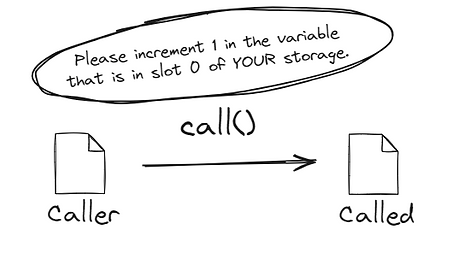
call的外部调用在low-level层面新启一个EVM作为外部合约被call后的交易的执行环境- 在新启的
EVM执行环境中,整体复制外部合约的代码- 按照外部合约的逻辑执行当前交易,更新外部合约的状态变量
- 对于外部合约来讲,当前被
call的交易处在新的EVM执行环境,交易的发起方就是发起调用的合约地址
High-level
contract interface
- 通过函数接口调用外部合约函数,_Name(_Address).func()
call返回(bool success, bytes memory data)- 通过函数直接调用的话,
Solidity在语言层面直接判断返回值 - 返回值如果为
false,抛出revert()异常- 通过 try/catch捕获异常
- 通过函数直接调用的话,
Low-level
function selector
- 外部函数支持通过合约函数选择器传参调用,
abi.encodeWithSignature | encodeWithSelector | encodePackedpublic|external修饰的函数允许外部调用 以及 继承的合约使用internal|private修饰的函数不支持外部调用internal修饰的函数允许继承使用private修饰的函数不允许继承使用
- 外部调用返回
(bool success, bytes memory data)boolean表明当前调用是否成功data是执行函数返回的数据call执行失败的话,不会revert回滚交易,因此需要执行异常判断
call外部合约不存在的函数- 外部合约存在缺省
fallback(),就执行fallback()逻辑 - 不存在缺省函数的话,直接返回
false
- 外部合约存在缺省
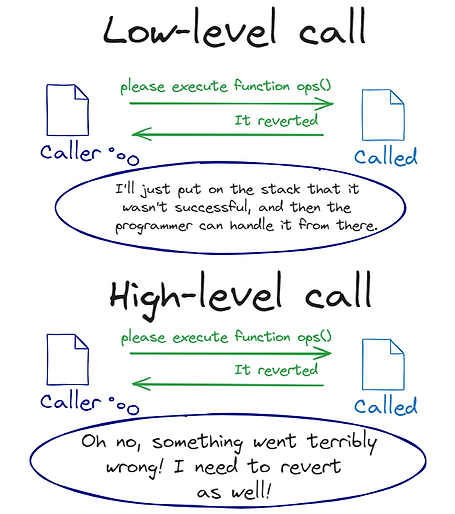
Call types validation
call- 交易执行在新的
EVM执行环境 address(this)= 被调用的外部合约的地址
- 交易执行在新的
Solidity Examples
// SPDX-License-Identifier: MIT
pragma solidity ^0.8.26;
contract Caller {
// first call to ops()
// just return false, but not revert
function callByCall(address _address) public returns (bool) {
(bool success, bytes memory returndata) = _address.call(
abi.encodeWithSignature("ops()")
);
if (!success) _revert(returndata, "Call_Faliure");
return success;
}
// second call to ops()
// it will revert()
function callByInterface(address _address) public {
Called called = Called(_address);
called.ops();
}
function _revert(bytes memory returndata, string memory errorMessage)
private
pure
{
// Look for revert reason and bubble it up if present
if (returndata.length > 0) {
// The easiest way to bubble the revert reason is using memory via assembly
/// @solidity memory-safe-assembly
assembly {
let returndata_size := mload(returndata)
revert(add(32, returndata), returndata_size)
}
} else {
revert(errorMessage);
}
}
}
contract Called {
// ops() always reverts
function ops() public {
revert();
}
}
Calling address(0)
High-level
- high-level 在
solidity层面直接发起外部合约调用- 在发起对地址的调用前先校验
caller是否合法- 只能对合约代码不为空的地址发起外部调用
- 在发起对地址的调用前先校验
Lower-level
lower-level在EVM层面直接发起外部合约调用- 直接发起对地址的调用,不会在语言层面校验
caller是否合法
- 直接发起对地址的调用,不会在语言层面校验

外部调用 Error:
- 执行中遇到
REVERT关键字 out-of-gas- 异常(
/0,out-of-bound)
Solidity Contracts
// SPDX-License-Identifier: MIT
pragma solidity ^0.8.26;
interface ERC20 {
function transferFrom(
address from,
address to,
uint256 amount
) external returns (bool);
}
contract receiver {
constructor() {}
event ReceiveReceived(address Sender, uint256 Value);
event FallbackReceived(address Sender, uint256 Value);
receive() external payable {
emit ReceiveReceived(msg.sender, msg.value);
}
fallback() external payable {
emit FallbackReceived(msg.sender, msg.value);
}
}
contract payer {
constructor() payable {}
function sendValue(address payable recipient, uint256 amount) external {
bool success = recipient.send(amount); //ReceiveReceived
if (!success) {
revert("Send Trans Failure");
}
}
function transferValue(address payable recipient, uint256 amount) external {
recipient.transfer(amount); //ReceiveReceived
}
function callSendValue(
address payable recipient,
uint256 amount,
bytes memory _data
) external {
(bool success, ) = recipient.call{value: amount}(_data); //ReceiveReceived
if (!success) {
revert("call_send_value_failure");
}
}
// 11053 gas cost
function safeTransferNativeToken(
address to,
uint256 amount,
uint256 txGas
) external {
bool success;
/// @solidity memory-safe-assembly
assembly {
// Transfer the ETH and store if it succeeded or not.
//success := call(gas(), to, amount, 0, 0, 0, 0)
success := call(txGas, to, amount, 0, 0, 0, 0)
}
require(success, "ETH_TRANSFER_FAILED");
}
function safeTransfer(
ERC20 token,
address to,
uint256 amount
) internal {
bool success;
/// @solidity memory-safe-assembly
assembly {
// Get a pointer to some free memory.
let freeMemoryPointer := mload(0x40)
// Write the abi-encoded calldata into memory, beginning with the function selector.
mstore(
freeMemoryPointer,
0xa9059cbb00000000000000000000000000000000000000000000000000000000
)
mstore(
add(freeMemoryPointer, 4),
and(to, 0xffffffffffffffffffffffffffffffffffffffff)
) // Append and mask the "to" argument.
mstore(add(freeMemoryPointer, 36), amount) // Append the "amount" argument. Masking not required as it's a full 32 byte type.
success := and(
// Set success to whether the call reverted, if not we check it either
// returned exactly 1 (can't just be non-zero data), or had no return data.
or(
and(eq(mload(0), 1), gt(returndatasize(), 31)),
iszero(returndatasize())
),
// We use 68 because the length of our calldata totals up like so: 4 + 32 * 2.
// We use 0 and 32 to copy up to 32 bytes of return data into the scratch space.
// Counterintuitively, this call must be positioned second to the or() call in the
// surrounding and() call or else returndatasize() will be zero during the computation.
call(gas(), token, 0, freeMemoryPointer, 68, 0, 32)
)
}
require(success, "TRANSFER_FAILED");
}
}
合约调用
delegateCall
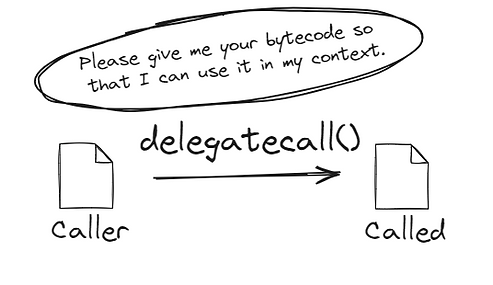
delegateCall在low-level层将外部合约的代码整个复制到当前EVM环境,与origin交易复用同一个EVM执行环境delegateCall执行在本合约的EVM环境delegateCall拥有完整的外部调用合约的合约代码delegateCall按照外部合约代码去更新/读取EVM环境中的slot的状态变量
返回状态
delegateCall返回(bool success, bytes memory data)boolean表明当前调用是否成功data是执行函数返回的数据delegateCall执行失败的话,不会revert回滚交易,因此需要执行异常判断
delegateCall外部合约不存在的函数- 外部合约存在缺省
fallback(),就执行fallback()逻辑 - 不存在缺省函数的话,直接返回
false
- 外部合约存在缺省
Solidity Examples
delegateCall按照外部合约代码去更新/读取EVM环境中的slot的状态变量- 示例合约在
EVM中的逻辑为:slot1 += slot0- 本合约按照上述逻辑更新自己合约内部的
slot参数
- 本合约按照上述逻辑更新自己合约内部的
// SPDX-License-Identifier: LGPL-3.0-only
pragma solidity >=0.7.0 <0.9.0;
contract Called {
uint256 base = 3;
uint256 public number; //slot 1
function increment() public returns (uint256) {
number += base; // slot1 += slot0
return number;
}
}
contract Caller {
uint256 base = 99; // 按照业务逻辑会读取slot0数据,参与计算
uint256 public myNumber; // 每次调用:slot1 += slot0(myNumber+=99)
// there is a new storage variable here
address public calledAddress = 0xd9145CCE52D386f254917e481eB44e9943F39138;
function execute(address to, uint256 txGas)
external
returns (bool success)
{
bytes memory data = abi.encodeWithSignature("increment()");
return _execute(to, data, txGas);
}
function _execute(
address to,
bytes memory data,
uint256 txGas
) internal returns (bool success) {
assembly {
success := delegatecall(
txGas,
to,
add(data, 0x20),
mload(data),
0,
0
)
}
}
function delegateCallIncrement(
address delegatedCalled //28187 gas cost
) public returns (uint256) {
(bool success, bytes memory resdata) = delegatedCalled.delegatecall(
abi.encodeWithSignature("increment()") //0xd09de08a
);
if (!success) {
assembly {
revert(add(resdata, 32), mload(resdata))
}
} else {
// 解码call|delegateCall的返回值
return abi.decode(resdata, (uint256));
}
}
}
Immutable|Constant in delegateCall
delegateCall是将外部合约的代码整个拷贝到当前EVM执行immutable|constant是编码到合约代码存储,并不占据slot存储- 也就是
immutable|constant类型的数据,是从外部合约代码直接读取
// SPDX-License-Identifier: MIT
pragma solidity ^0.8.26;
contract Caller {
uint256 private immutable a = 3;
function getValueDelegate(address called) public returns (uint256) {
(bool success, bytes memory data) = address(called).delegatecall(
abi.encodeWithSignature("getValue()")
);
if (!success) {
_revert(data, "Calles_Failure");
}
return abi.decode(data, (uint256)); // returns 2
}
function _revert(bytes memory returndata, string memory errorMessage)
private
pure
{
// Look for revert reason and bubble it up if present
if (returndata.length > 0) {
// The easiest way to bubble the revert reason is using memory via assembly
/// @solidity memory-safe-assembly
assembly {
let returndata_size := mload(returndata)
revert(add(32, returndata), returndata_size)
}
} else {
revert(errorMessage);
}
}
}
contract Called {
uint256 private immutable a = 2;
function getValue() public pure returns (uint256) {
return a;
}
}
Call types validation
delegateCall- 交易执行在当前的
EVM执行环境 address(this)= 当前合约的地址__self是immutable类型数据,因此该值不从slot读取,而是从外部合约代码读取:读取到的是外部合约的合约地址- 因此,采用
delegateCall的话,两者的地址应该不同
- 交易执行在当前的
call- 交易执行在新的
EVM执行环境 address(this)= 被调用的外部合约的地址__self是immutable类型数据,因此该值不从slot读取,而是从外部合约代码读取:读取到的是外部合约的合约地址- 因此,采用
call的话,两者的地址应该相同
- 交易执行在新的
总之:
delegateCall –> require(address(this) != __self)
call –> require(address(this) == __self)
address private immutable __self = address(this);
/**
* @dev Check that the execution is being performed through a delegatecall call
* 要求使用delegateCall调用该修饰器修饰的函数
* 使用delegateCall调用时:
** 1. address(this) = 当前合约的地址
** 2. __self是immutable类型数据,从外部合约代码读取,读取到的应该是 外部合约的合约地址
* 因此,采用 delegateCall的话,两者的地址应该不同
*/
modifier onlyProxy() {
require(
address(this) != __self,
"Function must be called through delegatecall"
);
require(
_getImplementation() == __self,
"Function must be called through active proxy"
);
_;
}
/**
* @dev Check that the execution is not being performed through a delegate call.
* 要求使用call调用该修饰器修饰的函数
* 使用call调用时, 交易被打包进新的EVM 执行环境
** 1. address(this) = 外部调用的合约地址
** 2. __self是immutable类型数据,从外部合约代码读取,读取到的应该是 外部合约的合约地址
* 因此,采用 call的话,两者的地址应该相同
*/
modifier notDelegated() {
require(
address(this) == __self,
"UUPSUpgradeable: must not be called through delegatecall"
);
_;
}
staticCall
staticcall{gas: gasAmount}(abiEncodedArguments);staticcall外部合约函数只读数据- 函数必须被
view|pure修饰,表明只读
- 函数必须被
- 天然适用于 预编译合约
staticcall无法更新状态变量:- 更新合约内部的状态变量
emit event触发链上事件- 创建其他合约
self destruct销毁合约(合约余额强制转移到传参地址)- 转账,更新账户余额
- 调用其他未标记
pure/view的函数 - 使用内联编码更改状态数据库
Solidity Examples
// SPDX-License-Identifier: MIT
pragma solidity ^0.8.26;
interface IERC20 {
function balanceOf(address) external view returns (uint256);
}
contract Token is IERC20 {
mapping(address => uint256) balance;
function mint(address addr, uint256 qty) external {
balance[addr] += qty;
}
function balanceOf(address addr) external view returns (uint256) {
return balance[addr];
}
}
contract ERC20User {
// 5837 gas cost
function myBalance(IERC20 token, address addr)
public
view
returns (uint256 balance)
{
balance = token.balanceOf(addr);
}
// 6294 gas cost
function myBalanceLowLevelEquivalent(IERC20 token, address addr)
public
view
returns (uint256 balance)
{
(bool ok, bytes memory result) = address(token).staticcall(
abi.encodeWithSignature("balanceOf(address)", addr)
);
require(ok);
balance = abi.decode(result, (uint256));
}
}
Security Issues
Denial of Service
staticCall 支持指定 gas 63/64 执行只读的调用,但是对方函数逻辑不明,存在恶意消耗 gas 的安全隐患
Read only Re-entrancy
只读函数会受到其他函数的影响
Preference
https://www.rareskills.io/post/solidity-staticcall
预编译合约(0x01 to 0x09)
预编译合约不是以 solidity 编写并且编译成 bytecodes 的合约代码,而是被编码到 Ethereum Procotol 中的函数功能, 因此调用 Precompile 合约不涉及底层合约间的调用(不涉及存储空间的读写,节省合约调用 gas),EVM 直接从协议代码中执行
- Elliptic curve digital signature recovery
- 0x01: ecRecover
- 签名验证失败会返回
address(0),不会revert整笔交易 - 需要进行签名地址校验 ECDSA校验签名
- 签名验证失败会返回
// SPDX-License-Identifier: MIT
// OpenZeppelin Contracts (last updated v5.1.0) (utils/cryptography/ECDSA.sol)
pragma solidity ^0.8.20;
/**
* @dev Elliptic Curve Digital Signature Algorithm (ECDSA) operations.
*
* These functions can be used to verify that a message was signed by the holder
* of the private keys of a given address.
*/
library ECDSA {
enum RecoverError {
NoError,
InvalidSignature,
InvalidSignatureLength,
InvalidSignatureS
}
/**
* @dev The signature derives the `address(0)`.
*/
error ECDSAInvalidSignature();
/**
* @dev The signature has an invalid length.
*/
error ECDSAInvalidSignatureLength(uint256 length);
/**
* @dev The signature has an S value that is in the upper half order.
*/
error ECDSAInvalidSignatureS(bytes32 s);
/**
* @dev Returns the address that signed a hashed message (`hash`) with `signature` or an error. This will not
* return address(0) without also returning an error description. Errors are documented using an enum (error type)
* and a bytes32 providing additional information about the error.
*
* If no error is returned, then the address can be used for verification purposes.
*
* The `ecrecover` EVM precompile allows for malleable (non-unique) signatures:
* this function rejects them by requiring the `s` value to be in the lower
* half order, and the `v` value to be either 27 or 28.
*
* IMPORTANT: `hash` _must_ be the result of a hash operation for the
* verification to be secure: it is possible to craft signatures that
* recover to arbitrary addresses for non-hashed data. A safe way to ensure
* this is by receiving a hash of the original message (which may otherwise
* be too long), and then calling {MessageHashUtils-toEthSignedMessageHash} on it.
*
* Documentation for signature generation:
* - with https://web3js.readthedocs.io/en/v1.3.4/web3-eth-accounts.html#sign[Web3.js]
* - with https://docs.ethers.io/v5/api/signer/#Signer-signMessage[ethers]
*/
function tryRecover(
bytes32 hash,
bytes memory signature
) internal pure returns (address recovered, RecoverError err, bytes32 errArg) {
if (signature.length == 65) {
bytes32 r;
bytes32 s;
uint8 v;
// ecrecover takes the signature parameters, and the only way to get them
// currently is to use assembly.
assembly ("memory-safe") {
r := mload(add(signature, 0x20))
s := mload(add(signature, 0x40))
v := byte(0, mload(add(signature, 0x60)))
}
return tryRecover(hash, v, r, s);
} else {
return (address(0), RecoverError.InvalidSignatureLength, bytes32(signature.length));
}
}
/**
* @dev Returns the address that signed a hashed message (`hash`) with
* `signature`. This address can then be used for verification purposes.
*
* The `ecrecover` EVM precompile allows for malleable (non-unique) signatures:
* this function rejects them by requiring the `s` value to be in the lower
* half order, and the `v` value to be either 27 or 28.
*
* IMPORTANT: `hash` _must_ be the result of a hash operation for the
* verification to be secure: it is possible to craft signatures that
* recover to arbitrary addresses for non-hashed data. A safe way to ensure
* this is by receiving a hash of the original message (which may otherwise
* be too long), and then calling {MessageHashUtils-toEthSignedMessageHash} on it.
*/
function recover(bytes32 hash, bytes memory signature) internal pure returns (address) {
(address recovered, RecoverError error, bytes32 errorArg) = tryRecover(hash, signature);
_throwError(error, errorArg);
return recovered;
}
/**
* @dev Overload of {ECDSA-tryRecover} that receives the `r` and `vs` short-signature fields separately.
*
* See https://eips.ethereum.org/EIPS/eip-2098[ERC-2098 short signatures]
*/
function tryRecover(
bytes32 hash,
bytes32 r,
bytes32 vs
) internal pure returns (address recovered, RecoverError err, bytes32 errArg) {
unchecked {
bytes32 s = vs & bytes32(0x7fffffffffffffffffffffffffffffffffffffffffffffffffffffffffffffff);
// We do not check for an overflow here since the shift operation results in 0 or 1.
uint8 v = uint8((uint256(vs) >> 255) + 27);
return tryRecover(hash, v, r, s);
}
}
/**
* @dev Overload of {ECDSA-recover} that receives the `r and `vs` short-signature fields separately.
*/
function recover(bytes32 hash, bytes32 r, bytes32 vs) internal pure returns (address) {
(address recovered, RecoverError error, bytes32 errorArg) = tryRecover(hash, r, vs);
_throwError(error, errorArg);
return recovered;
}
/**
* @dev Overload of {ECDSA-tryRecover} that receives the `v`,
* `r` and `s` signature fields separately.
*/
function tryRecover(
bytes32 hash,
uint8 v,
bytes32 r,
bytes32 s
) internal pure returns (address recovered, RecoverError err, bytes32 errArg) {
// EIP-2 still allows signature malleability for ecrecover(). Remove this possibility and make the signature
// unique. Appendix F in the Ethereum Yellow paper (https://ethereum.github.io/yellowpaper/paper.pdf), defines
// the valid range for s in (301): 0 < s < secp256k1n ÷ 2 + 1, and for v in (302): v ∈ {27, 28}. Most
// signatures from current libraries generate a unique signature with an s-value in the lower half order.
//
// If your library generates malleable signatures, such as s-values in the upper range, calculate a new s-value
// with 0xFFFFFFFFFFFFFFFFFFFFFFFFFFFFFFFEBAAEDCE6AF48A03BBFD25E8CD0364141 - s1 and flip v from 27 to 28 or
// vice versa. If your library also generates signatures with 0/1 for v instead 27/28, add 27 to v to accept
// these malleable signatures as well.
if (uint256(s) > 0x7FFFFFFFFFFFFFFFFFFFFFFFFFFFFFFF5D576E7357A4501DDFE92F46681B20A0) {
return (address(0), RecoverError.InvalidSignatureS, s);
}
// If the signature is valid (and not malleable), return the signer address
address signer = ecrecover(hash, v, r, s);
if (signer == address(0)) {
return (address(0), RecoverError.InvalidSignature, bytes32(0));
}
return (signer, RecoverError.NoError, bytes32(0));
}
/**
* @dev Overload of {ECDSA-recover} that receives the `v`,
* `r` and `s` signature fields separately.
*/
function recover(bytes32 hash, uint8 v, bytes32 r, bytes32 s) internal pure returns (address) {
(address recovered, RecoverError error, bytes32 errorArg) = tryRecover(hash, v, r, s);
_throwError(error, errorArg);
return recovered;
}
/**
* @dev Optionally reverts with the corresponding custom error according to the `error` argument provided.
*/
function _throwError(RecoverError error, bytes32 errorArg) private pure {
if (error == RecoverError.NoError) {
return; // no error: do nothing
} else if (error == RecoverError.InvalidSignature) {
revert ECDSAInvalidSignature();
} else if (error == RecoverError.InvalidSignatureLength) {
revert ECDSAInvalidSignatureLength(uint256(errorArg));
} else if (error == RecoverError.InvalidSignatureS) {
revert ECDSAInvalidSignatureS(errorArg);
}
}
}
- Hash methods to interact with bitcoin and zcash
- 0x02 and 0x03: SHA-256 and RIPEMD-160
Ethereum使用keccak256作为地址的哈希算法Bitcoin使用SHA-256 and RIPEMD-160作为基础的哈希计算
// SPDX-License-Identifier: MIT
pragma solidity ^0.8.26;
contract Called {
function hashSha256(uint256 numberToHash) public view returns (bytes32 h) {
(bool ok, bytes memory out) = address(2).staticcall(
abi.encode(numberToHash)
);
require(ok);
h = abi.decode(out, (bytes32));
}
function hashSha256Yul(uint256 numberToHash) public view returns (bytes32) {
assembly {
mstore(0, numberToHash) // store number in the zeroth memory word
let ok := staticcall(gas(), 2, 0, 32, 0, 32)
if iszero(ok) {
revert(0, 0)
}
return(0, 32)
}
}
function hashRIPEMD160(bytes calldata data)
public
view
returns (bytes20 h)
{
(bool ok, bytes memory out) = address(3).staticcall(data);
require(ok);
h = bytes20(abi.decode(out, (bytes32)) << 96);
}
}
Goland Sha256:
s := hexutil.EncodeBig(big.NewInt(12))
prefix := ""
num := 64 - len(s[2:])
for index := 0; index < num; index++ {
prefix += "0"
}
s = s[:2] + prefix + s[2:]
//fmt.Println(s)
byteD, err := hexutil.Decode(s)
if err != nil {
fmt.Println(err)
}
h := sha256.New()
h.Write(byteD)
bs := h.Sum(nil)
fmt.Println(hexutil.Encode(bs))
- Memory copying
- Address 0x04: Identity
- 拷贝内存数据
- Methods to enable elliptic curve math for zero knowledge proofs
- Address 0x05: Modexp
- 幂模运算
// SPDX-License-Identifier: MIT
pragma solidity ^0.8.26;
contract MoxExp {
function modExp(
uint256 base,
uint256 exp,
uint256 mod
) public view returns (uint256) {
bytes memory precompileData = abi.encode(32, 32, 32, base, exp, mod);
(bool ok, bytes memory data) = address(5).staticcall(precompileData);
require(ok, "expMod failed");
return abi.decode(data, (uint256));
}
function Exp(uint256 base, uint256 exp) public view returns (uint256) {
uint256 max = type(uint256).max;
bytes memory precompileData = abi.encode(32, 32, 32, base, exp, max);
(bool ok, bytes memory data) = address(5).staticcall(precompileData);
require(ok, "expMod failed");
return abi.decode(data, (uint256));
}
}
- Address 0x06 and 0x07 and 0x08: ecAdd, ecMul, and ecPairing (EIP-196 and EIP-197)
- ECC 运算用于零知识证明和 TornadoCash
Preference
https://www.evm.codes/precompiled?fork=grayGlacier
https://www.nervos.org/knowledge-base/what_are-precompiles_(explainCKBot)
MerkleProof
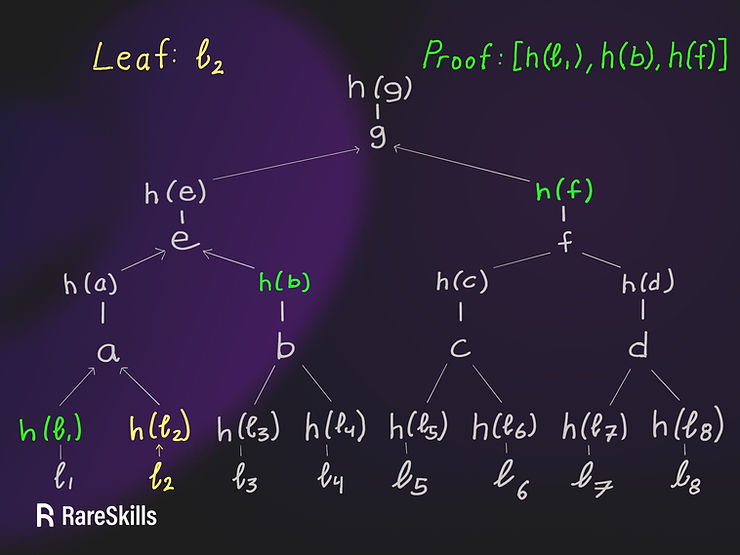
构建树
h(a) = h(h(ℓ₁) + h(ℓ₂))
h(e) = h(h(a) + h(b))
h(g) = h(h(e) + h(f))
return root == h(g)
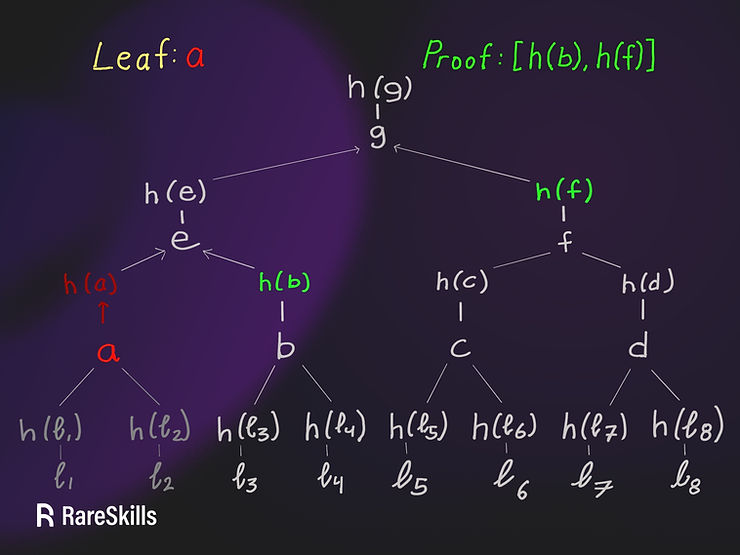
Questions
The attack requires 64 byte leaves
MerkleTree 只运算叶子节点数据的 hash ,上述构造树的过程中:
- 数据
ℓ₁的 叶子节点数据h(ℓ₁) = 32 bytes a = h(ℓ₁) + h(ℓ₂) = 64 bytes
MerkleTree校验仅支持32bytes的叶子节点数据
校验过程中必须将提供的原值 hash 后参与计算
因此,攻击者无法提供 a = 64 bytes 的原值,proof = [h(b), h(f)] 跳过校验
如果 攻击者提供 h(a) 作为原址,原值再次 hash 后将不满足树的校验
因此,32bytes 的叶子节点可以有效限制 攻击者跳过真实叶子节点的校验攻击问题
MerkleTree校验如果支持64bytes的叶子节点数据
校验过程中必须将 提供的原值 hash 后参与计算
因此,攻击者可以提供 a = 64 bytes 的原值,proof = [h(b), h(f)] 跳过校验
因此,64bytes 的叶子节点不能限制 攻击者跳过真实叶子节点的校验攻击问题,存在安全问题
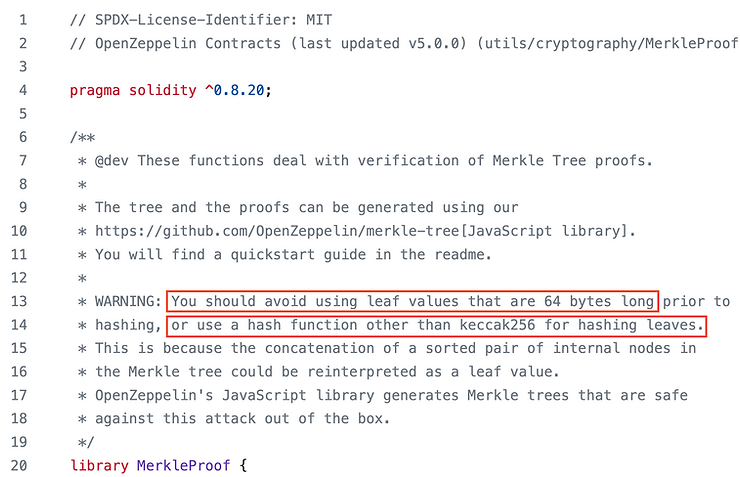
叶子节点和父节点采用不同的hash运算
- 再不限制叶子节点数据的前提下,可以通过采用不同的节点运算方式避免攻击问题
- 为简化使用,叶子节点执行双
hash h’(x) = h(h(x)) - 父节点只进行单次
hash参与构建- 此时,攻击者提供
a值 - 根据
hash运算规则,a执行 两次hash参与校验,此时不满足树的校验
- 此时,攻击者提供
preference
merkle-tree-second-preimage-attack
openzeppelin-merkle-proof-golang
校验签名:
ECDSA(Elliptic Curve Digital Signature Algorithm) 用来对特定的数据进行密码学上的计算,运行数据的签名者(signer)签名封装数据,签名公钥(verifier)可以校验解封数据
- 签名数据被篡改的话,公钥无法解封出正确的数据
- 签名公钥和私钥不配对的话,数据无法解封
Signing
- Create message to sign
- Hash the message
- Sign the hash (off chain, keep your private key secret)
Verify
- Recreate hash from the original message
- Recover signer from signature and hash
- Compare recovered signer to claimed signer
preference
Common mistakes
Div before Mul
Solidity只有整数,不支持小数运算,默认的整数乘除向下取整。
**// Wrong way:**
If principal = 3000,
interest = principal / 3333 * 10000
interest = 3000 / 3333 * 10000
interest = 0 * 10000 (rounding down in division)
interest = 0
// **Correct Calculation:**
If principal = 3000,
interest = principal * 10000 / 3333
interest = 3000 * 10000 / 3333
interest = 30000000 / 3333 interest approx 9000
// SPDX-License-Identifier: MIT
pragma solidity ^0.8.0;
import "@openzeppelin/contracts/utils/math/Math.sol";
import "https://github.com/abdk-consulting/abdk-libraries-solidity/blob/master/ABDKMath64x64.sol";
contract MathPaper {
// k, N 都是整数
function func1(uint256 k, uint256 N) public pure returns (uint64) {
uint256 numerator = k + N + 1;
uint256 denominator = N + 1;
return log2(numerator) - log2(denominator);
}
function func3(uint256 dt, uint256 e) public pure returns (uint256) {
if (dt < e) {
return 100;
}
uint256 exp = Math.ceilDiv((dt - e) * 100, e); //0.2==>20
uint256 dominator = power(100, exp);
return 1000000 / dominator;
}
function power(uint256 base, uint256 exp) public pure returns (uint256) {
// Represent base as a fixed-point number.
int128 baseFixed = ABDKMath64x64.fromUInt(base);
// Calculate ln(base)
int128 lnBase = ABDKMath64x64.ln(baseFixed);
// Represent exp as a fixed-point number.
int128 expFixed = ABDKMath64x64.divu(exp, 100);
// Calculate ln(base) * exp
int128 product = ABDKMath64x64.mul(lnBase, expFixed);
// Calculate e^(ln(base) * exp)
int128 result = ABDKMath64x64.exp(product);
// Multiply by 10^5 to keep 5 decimal places
result = ABDKMath64x64.mul(result, ABDKMath64x64.fromUInt(10**2));
// Convert the fixed-point result to a uint and return it.
return ABDKMath64x64.toUInt(result);
}
function log2(uint256 base) public pure returns (uint64) {
// Represent base as a fixed-point number.
int128 baseFixed = ABDKMath64x64.fromUInt(base);
// Calculate ln(base)
int128 lnBase = ABDKMath64x64.log_2(baseFixed) * 1e4;
uint64 t = ABDKMath64x64.toUInt(lnBase);
return t;
}
}
Not following check-effects-interaction
check-effects-interaction模式将合约交互放在条件校验、数据更新之后,防止重入攻击。- 合约交互包含 外部合约的
call|delegateCall|staticCall调用、Native Token转账 - 合约交互操作应该放在整个函数的最后,确保无法正常执行重入攻击(即使重入,数据也是已经更新后的数值)
重入攻击的示例:
// SPDX-License-Identifier: MIT
pragma solidity 0.8.26;
// DO NOT USE
contract BadBank {
mapping(address => uint256) public balances;
constructor() payable {
require(msg.value == 10 ether, "deposit 10 eth");
}
function deposit() external payable {
balances[msg.sender] += msg.value;
}
function withdraw() external {
// should be after the check and effects
(bool ok, ) = msg.sender.call{value: balances[msg.sender]}("");
require(ok, "transfer failed");
// shoule be the first
balances[msg.sender] = 0;
}
}
contract attack {
function deposit(BadBank bank) external payable {
bank.deposit{value: msg.value}();
bank.withdraw();
}
receive() external payable {
if (msg.sender.balance >= 1 ether) {
BadBank(msg.sender).withdraw();
}
}
}
Transfer Native Token by ‘transfer’ or ‘send’
transfer or send转账模式- 为了避免重入攻击,只传递有限的 gas,让调用的合约不能执行过多的合约逻辑
- 默认调用时传递
2300 gas,其中transfer执行失败会revert,send不会revert但是会返回待处理的boolean
sload字节码在升级后的gas 花销分为:non-warm-2100, warm-100- 升级后如果仍然传递默认的
2300gas,也无法容忍 对方合约中fallback|receiver存在读取地址的行为
- 升级后如果仍然传递默认的
// in the bank receiver() function, recors the deposit behavior
receive() external payable {
balances[msg.sender] += msg.value;
}
// In the call contract, the deposit transfer function will fail, because only passing 2300 gas could not support the record behavior
contract attack {
function transfer(BadBank bank) external payable {
payable(address(bank)).transfer(msg.value);
}
}
- 在
check-effects-interation模式中使用 call 进行安全转账,处理 call 调用返回的 (bool success, bytes data)
function sendValue(address payable recipient, uint256 amount) internal {
if (address(this).balance < amount) {
revert Errors.InsufficientBalance(address(this).balance, amount);
}
(bool success, ) = recipient.call{value: amount}("");
if (!success) {
revert Errors.FailedCall();
}
}
misusing of tx.origin and msg.sender
tx.origin指的是当前交易的签名者,初始构造者,在整个交易的生命周期中不会发生变化msg.sender指的是当前EVM环境中的交易发起方,会随着 EVM 环境的话变化而返回不同的地址
Not using safeTransfer in ERC20
- ERC20代币存在两套不同的转账函数
- 有些代币的转账函数不存在返回值,比如 USDT的转账
- 有些代币的转账函数存在返回值,比如标准的ERC20合约
- 针对不同的转账标准, safeTransfer 可以处理全部情况
- 在外部调用存在 revert 的情况下,直接 revert
- 外部调用不存在返回值的情况下,如果被调用者不是一个合约地址的话,直接 revert报错
- 外部调用不存在返回值的情况下,如果被调用者是一个合法合约地址的话,交易成功
- 外部调用存在返回值的情况下,如果返回值不是 1(true),直接 revert报错
function _callOptionalReturn(IERC20 token, bytes memory data) private {
uint256 returnSize;
uint256 returnValue;
assembly ("memory-safe") {
let success := call(gas(), token, 0, add(data, 0x20), mload(data), 0, 0x20)
// bubble errors
if iszero(success) {
let ptr := mload(0x40)
returndatacopy(ptr, 0, returndatasize())
revert(ptr, returndatasize())
}
returnSize := returndatasize()
returnValue := mload(0)
}
if (returnSize == 0 ? address(token).code.length == 0 : returnValue != 1) {
revert SafeERC20FailedOperation(address(token));
}
}
No need safeMath in solidity ^0.8.0+
Invalid access control or Uninitialized functions in the logic contract
使用确定的循环问题
使用确定的solidity 版本
Preference
https://www.rareskills.io/post/solidity-beginner-mistakes
EIP7702
EIP7702 允许扩展 EOA 地。
- 升级后的核心有点由于支持批量交易,允许
EOA地址像合约一样执行底层call - 允许
gas代付,通过签名校验允许任意地址提交自身交易(只需要给自己转账,附加上calldata) - 由于升级成合约,可以扩展更加灵活性的功能
EOA 地址扩展的合约 Code 为(0xef0100 || address),因为根据EIP3541不允许部署 0xef 开头的合约。
GetCodes
0xef0100 开头的 bytecodes 表示当前地址是扩展的 EOA 地址
func AccountCodes(address common.Address) string {
res, err := client.CodeAt(context.Background(), address, nil)
if err != nil {
log.Fatal(err)
}
log.Printf("codes: %s", hexutil.Encode(res))
//0xef010080296ff8d1ed46f8e3c7992664d13b833504c2bb
return hexutil.Encode(res)
}
因此,通过下面代码能够判断出当前地址是否是扩展的 EOA 地址
bytes3 internal constant _DELEGATION_PREFIX = 0xef0100;
function isEOA(address target) internal view returns (bool) {
bytes memory code = target.code;
// Add here a comment addressing the normal disclaimers around
// construction-time issues and zero-length contracts.
return (code.length == 0 || bytes3(code) == _DELEGATION_PREFIX);
}
/**
* @dev Returns the address of the delegate if `account` as an EIP-7702 delegation setup, or address(0) otherwise.
*/
function fetchDelegate(address account) internal view returns (address) {
bytes23 delegation = bytes23(account.code);
return bytes3(delegation) == EIP7702_PREFIX ? address(bytes20(delegation << 24)) : address(0);
}
合约验签:
abstract contract SignerERC7702 is AbstractSigner {
/**
* @dev Validates the signature using the EOA's address (i.e. `address(this)`).
*/
function _rawSignatureValidation(
bytes32 hash,
bytes calldata signature
) internal view virtual override returns (bool) {
(address recovered, ECDSA.RecoverError err, ) = ECDSA.tryRecover(hash, signature);
return address(this) == recovered && err == ECDSA.RecoverError.NoError;
}
}
OKX WalletCore
OKX 钱包升级升级 7702 后,和该钱包交互只需要执行 calldata 不为空的 transfer 交易, calldata 自动匹配代理合约的函数执行功能函数
代理合约主要存在三种类型交易:
executeFromSelf
只能 EOA 地址自己执行,在 transfer_To_Self 交易的同时附加上 calldata,底层逻辑会自动匹配合约函数执行
modifier onlySelf() {
if (msg.sender != address(this)) revert Errors.NotFromSelf();
_;
}
function executeFromSelf(Call[] calldata calls) external onlySelf {
_batchCall(calls);
}
executeWithValidator
任意地址拿着有效签名都可以发送交易,其中签名的 Validator 可以是 EOA 本身或者是 EOA 指定的白名单地址
这个函数就允许外部地址代付 Gas,任意外部地址只要拿着有效签名就能执行升级 7702_EOA 钱包的批量操作
升级后的 EOA 地址会成为一个 Storage 合约的 Owner
Storage内部存储自增的nonce保证签名单次使用Storage中能够管理Validator白名单
在发送交易时,根据 Validator 类型有不同的验签流程:
- Validator == address(1),
- 表示
Validator是EOA Self,要求signer == EOA
- 表示
- Validator 是其余白名单地址时,要求签名满足 Validator 合约的内部逻辑
try IValidator(validator).validate(typedDataHash, validationData)- 如果
Validator被设置成纯EOA地址的话,底层call调用将永远会返回true,也就是将会绕过签名校验的流程 - 这就需要
EOA-7702谨慎设置validator白名单
function executeWithValidator(
Call[] calldata calls,
address validator,
bytes calldata validationData
) external onlyValidator(calls, validator, validationData) {
_batchCall(calls);
}
executeFromExecutor
在 executeWithValidator 基础功能上继续扩展数据结构,增加 Session 结构体限制:
struct Session {
uint256 id;
address executor;
address validator;
uint256 validUntil;
uint256 validAfter;
bytes preHook;
bytes postHook;
bytes signature;
}
- 限制交易只能由
Executor执行 - 整个
Session结构和批量转账数据必须通过Validator的验签流程 - 交易还能设置有效期、
Hook功能校验
function validateSession(Session calldata session) public view {
// Check executor authorization
if (msg.sender != session.executor) revert Errors.InvalidExecutor();
// Check time bounds
if (
session.validAfter > block.timestamp ||
block.timestamp > session.validUntil
) revert Errors.InvalidSession();
// Check invalidSessionId & validValidator in storage
getMainStorage().validateSession(session.id, session.validator);
// Validate signature
bytes32 hash = getSessionTypedHash(session);
bool isValid = WalletCoreLib.validate(
session.validator,
hash,
session.signature
);
if (!isValid) revert Errors.InvalidSignature();
}
Preference
https://github.com/okx/wallet-core
https://ethereum.org/roadmap/pectra/7702
https://eips.ethereum.org/EIPS/eip-7702
https://etherscan.io/tx/0xebc6f503d3c7cf9560308c8efef69a6c4a993a29224d7a4a4f13ca98d6ae0621